How to Start a Charter Boat Business: The Complete 12-Step Guide
- 3 years ago
Want a business that has sky-high earning potential, lets you double your revenue every single year, and might even give you a glorious opportunity to hob-nob with billionaire celebrities?
If so, starting your very own charter business might be just the thing for you.
Dmitry Lyubimov, the owner of UNIQ LA, did just that, with results beyond anything he could ever have dreamed of. That’s particularly impressive when you consider that when Dimitry first stepped foot on American soil, he had no job, spoke no English, and didn’t have a dime to his name.
Today, he’s living his very best life catering to an exclusive boat-loving clientele while raking in truckloads of cash in his charter business. Starting from a single boat, he’s expanded his fleet beyond boats to include limos, planes, helicopters, and even mansions.
We were incredibly excited to interview Dmitry to find out how he started his wildly successful boat business empire. He’s got a ton of actionable advice to share.
You’ll find out how he built his impressive client list, which of his services bring in the most revenue, how he was able to convince a city to construct a dock for him, and so much more. Best of all, we’ll go through every step you need to take to start your own highly lucrative charter business, including the best way to charter fishing trips.
Let’s dive in and get started!

Step 1: Write a Business Plan
Before you can start to make your vision of owning your own charter business a glorious reality, you’ll need to write a business plan.
This will help you outline your business’s ultimate objectives, which will help you accelerate your success. Your business plan should include costs and financial projections.
List all the expenses involved in running a charter boat business. These are things like gas, insurance, boat payment, and maintenance. You should also list the equipment you need, including the boat itself, fishing supplies, and anything else you need to make your business a resounding success.
Also, list how much you’ll need to charge per hour to offset those expenses so that you can turn a tidy profit.
You’ll want to include the results of market research too. Ask other boat businesses in the area how much they’re charging, how much business they’re doing, and how much they make with fishing charters.
Once you collect your research, quantify it and make it a part of your plan.
Your business plan should also contain the following elements:
- Sizes and types of boats you plan on leasing or buying
- Destinations
- Preferred clientele
- Services offered (fishing equipment rental shop, parasailing, jet ski rentals, etc.)
- Price of services
- Where you’re going to be docking your boat
- If you need to build a dock
- How you plan to market your business
By taking this step, you’ll define your vision with piercing clarity, allowing you to confidently move in the direction of your dreams. A well-defined business plan also helps you to secure financing for your charter business when and if you need it.
Udemy has a terrific course on writing business plans that includes 50 free business plan templates. For a sample charter boat business plan, check this out .
Step 2: Mentorship
If you’re new to the charter boat business, it’s a good idea to set up a mentoring partnership with an established company.
With a business mentor by your side, you’ll get the valuable assistance and expert instruction you need to take you from a struggling neophyte to a consummate professional.
Studies have shown that 70% of small business owners who enlist the support of a mentor see their companies survive for at least five years. This is twice as long as those entrepreneurs who forgo mentoring services.
Fantastic mentors will have a lifetime of real-world knowledge and a dizzying array of skills to share with you. Look for one with five or more years of experience in the field.
Your mentor should have a keen awareness that he doesn’t know everything there is to know about his business niche. That’s why, ideally, your mentor will introduce you to his network of experts who will be eager to help you acquire a more comprehensive understanding of running a boat business.
An excellent mentor is also someone who runs his business according to impeccable ethical standards. You don’t want to be tutored by an individual who jettisons his moral standards in pursuit of the almighty buck.
Ask your mentor if he can develop an action plan based on concrete goals. For example, learning the essential skills all successful boat charter business owners must have.
It’s great if you can locate a mentor who has a proven history of pushing his own professional boundaries. This will hopefully inspire you with the confidence to push past your own limits.
Pick your guru’s brains and take advantage of all the knowledge he’s willing to share with you. By doing this, you’ll have a leg up when it’s time to start your own charter boat business. If you need more guidance on mentorship, read this excellent Forbes article on the subject.
Step 3: Licensing
Before you can head out for the open seas with your first passengers, you’re going to have to get licenses for your charter boat business.
Your boat captains need to be licensed. You also need to obtain a license for the commercial use of your vessels. There are even licensing requirements for each water jurisdiction you plan on traveling to.
These are some of the licensing requirements for charter boats and fishing guides in the state of Washington:
- A current copy of the boat’s registration is required when a vessel is being designated on a license.
- An angler permit specifying the maximum number of persons who may fish from the charter boat per trip. Only a person who holds a salmon charter license may hold an angler permit.
- A non-salmon charter license is required if you accept a fee to take a person fishing for shellfish and fish other than salmon or albacore tuna.
- A food fish guide license is required if you accept a fee to take a person fishing for salmon, sturgeon, or other food fish species in freshwater rivers and streams.
They’re probably similar to the requirements in your own state.
Step 4: Target Market
With a charter boat business, you get to unleash your entrepreneurial spirit while simultaneously indulging your passion for sailing the seven seas.
Before you whip yourself up into a business-buying frenzy, you need to first decide what type of clientele you’re going to target. Will it be multinational companies that want to conduct corporate meetings smack dab in the middle of the storm-tossed ocean? Or, would you rather cater to families who want to want to enjoy the exquisite thrill of their own private whale-watching trips?
Maybe you’ll want to target retirees who want a relaxing, yet fun, deep sea fishing experience.
Here’s Dmitry talking about how he chose his clientele:
You don’t have to target as elite a clientele as Dimitry did. However, make sure you deliver a superlative experience for every single one of your charter business customers. Maybe most of your customers will want to go fishing. In that case, you’ll want to make sure your boat has things like fishing rails, fish holding tanks, and other angling accouterments .
Understand what your customer’s needs are and do everything you can to satisfy them. If you do, you’ll create lifelong fans who’ll be eager to come back. This is what Dimitry has to say:
And if you want to watch the interview we filmed with Dimitry, check out part one and part two .
What you want to do is to create such an insatiable hunger in your customers that they cannot help but return for a second helping.
Step 5: Have a Unique Selling Proposition (USP)
After you decide who you’re going to target in your charter boat business, make sure you have a Unique Selling Proposition (USP) that sets your business light-years above the mediocrity of the rest of the competition.
A USP is the one benefit that only your company can provide. In an overcrowded market full of cutthroat competition, your USP will be a potent reminder of everything you can do for your customers.
There are a mind-bogglingly large number of yacht, cruise ship, and fishing boat charter businesses in the world. Every single one of these vessels claims to be the best.
What will be the main selling point that makes you different from everyone else?
Find out what that competitive advantage is, and make sure you hammer that point home in all your marketing messages.
Here are all the benefits to having a clearly differentiated USP:
- EMOTIONAL CONNECTION: An excellent USP imprints itself on the minds of your prospects so when they need the kind of service you provide, they’ll automatically think of you.
- INCREASED REVENUE: If you communicate a strong USP to customers, you’ll invariably boost your revenue.
- LOYAL CUSTOMERS: When your USP delivers a compelling value proposition, you won’t only get customers to buy something from you today, but you’ll win them over for life.
How to Create a USP
To create a USP, the first thing you need to do is to determine your customer segments.
This involves figuring out the value your customers receive from your service.
When you do that, you figure out how to align your offerings with what the customer wants rather than what you want them to buy.
Here are a few ways to find out what customers want from you:
- Analyze data from social media marketing campaigns
- Talk directly to your customers
- Talk to your customer service team
Next, figure out how well you currently cater to your clients’ needs. This will help you to identify market gaps that you can fill by offering things none of your other competitors can.
For example, say you look at your social media data and discover that there’s a huge demand for sailing yacht charters that travel to barrier islands. You find out that there are few competitors in your area who offer this service.
In that case, you might want to make this service part of your USP. At the very least, it gives you a new marketing direction to go in.
Read this article if you need more information on creating a compelling USP.
Step 6: Name Your Business
Make sure you dream up a creatively clever name for your charter boat business that crystallizes what your company is all about in a few short, eye-catching words.
It should capture the imagination of all who speak it, see it, or even think it. To create an out-of-this-world business name, look at your Unique Selling Proposition (USP) and your business plan. Think about your target audience and any market research you might have undertaken.
Consider the message you want to convey to the world through your charter boat business name.
If you want a real attention-grabbing name, read this Forbes article .
Brainstorming
Once you’ve collected all these raw impressions, it’s time to sit down and have a good old-fashioned brainstorming session.
Unleash your creativity and go hog wild!
Some of your brainstorming sessions can be just you. However, you should do a few with a friend or colleague. Write down all your ideas as fast you can without stopping. That way, you liberate your imagination and free your creative juices.
Check for Availability
Before you settle on a charter boat company name, check to make sure it’s available.
If someone is already using the name, you could be sued if you go ahead and use it anyway. Look through the U.S. Patent and Trademark Office’s federal database to see if someone already registered it.
You should also do a series of Google searches for your desired business name to ensure there isn’t another charter boat company with that same name.
You’re going to have to register your domain name. One easy way to do that is to type the domain name you want to use into GoDaddy’s search bar.
It’ll immediately tell you if someone else owns it.
Name.com is another place to check for domain availability.
Register with State Authorities
Guard your charter boat business name by registering it with your state.
If your entity is a limited liability company, a corporation, or a limited partnership, you’ll need to register the business itself. By doing this, you’ll automatically register the name of your company.
If you decided to go with a sole proprietorship or general partnership, you don’t need to register it with the state. Instead, do it through the county or city where you’re located.
If you’re a sole proprietor, you can choose to file a “doing business as” (DBA) name. This way, you can use a name for your boat business other than your own legal one.
You can register a DBA with your state or county clerk. For example, if your business is located in Nassau County, New York, you’d contact the county clerk’s office there.
If you need more information on registering your business name, Legal Zoom has a great article on the topic. This video also has some terrific information.
Step 7: Choose a Business Structure
Before you can register your charter boat company with your state, you’ll need to select a business structure.
Select the one that offers the optimal balance between benefits and legal protections. Choose wisely because your business structure isn’t only a name. It affects your taxes, the paperwork you need to file, your personal liability, and even your ability to raise cash.
Here are two of the most common:
Sole Proprietorship
A sole proprietorship is super easy to form and gives you absolute control over your charter boat business.
If you’re doing business but don’t register as any particular type of legal structure, congratulations! You’re automatically considered to be a sole proprietorship.
With a sole proprietorship, your liabilities and assets aren’t separate from your personal liabilities and assets. This means you’re personally liable for the debts and obligations of your charter business.
It can be challenging to secure funding because banks are hesitant to lend to sole proprietorships.
Partnership
For two or more parties, partnerships are the simplest type of legal structure. There are two frequently used kinds of partnerships: limited partnerships and limited liability partnerships.
With limited partnerships, only one general partner enjoys unlimited liability. All the other partners have limited liability.
For more on the various types of legal structures for your boat charter business, check out the sensational resources at the Small Business Administration (SBA).
Step 8: Secure Funding
You probably don’t have sufficient funds to bankroll your fledgling charter business.
If that’s the case, you’ll need to secure financing to fund your venture. Getting a boat (or a fleet of them) is going to be one of the most expensive parts of your business.
Here are some ways to secure funding:
- BOOTSTRAPPING: Bootstrapping refers to scraping together your own financial reserves. This could include accumulated savings, credit cards, and home equity lines.
- FRIENDS AND FAMILY: One of the best sources of startup funding is friends and family. If you have a rich uncle who always wanted you to start your own business, now is the perfect time to see if he’ll loan you the money. He’ll probably give it to you with little-to-no interest.
- CROWDFUNDING: You can try using the internet to raise small amounts of money from a large number of people. This is known as crowdfunding, and it’s the way many companies get funded these days. Try sites such as AngelList or Crowdfunder .
- TAKE OUT A LOAN: You might qualify for a traditional bank loan. An encouraging sign for small business owners is that banks seem to have a renewed interest in helping out small businesses. In addition to your local bank, Bank of America and Wells Fargo are two banks you might want to try.
Dmitry bought his first boat for $80,000. It was purchased for pleasure—not for profit. He asked himself:
On that day, his charter boat business was born!
However, you don’t have to actually own anything. Dmitry leases many of the boats in his fleet, and you can do the same.
If you’d prefer to buy your boats outright, check out Sailonline.com or Fraser Yachts .
Ongoing Expenses
You’ll also have ongoing expenses to cover. Try to get a line of credit so you can keep your business running until it turns a profit.
In addition to the initial purchase and all your everyday business expenses, you have to factor in routine maintenance, emergency maintenance, insurance, berthing fees, licensing, crew salaries, and many other things.
Here’s Dmitry talking about the costs of a charter boat business:
To reiterate, here is Dmitiry’s breakdown of ongoing expenses for his charter boat business that first year:
REPAIRS: $30,000
LICENSES: $2,000
WEBSITE: $3,500
ADVERTISING: $12,000
Step 9: Docking Your Fleet
You’ll want to choose a dock where you can park your charter boat and pick up passengers.
To ensure you’ll attract as many clients as possible, select a dock in an area where tourists tend to flock. Locales where the fishing is superb are excellent choices because you can then specialize in doing deep sea fishing trips.
Some ports offer discounted rates if you lease long-term instead of renting month to month. Given you plan to be there long term, you might also want to start a pressure washing business to clean boats during the slow times. That way you can clean your own and others.
Dmitry was lucky enough to have the local municipality build him a dock. Here’s the way he tells it:
Renting a Slip
If you’re not as lucky as Dmitry and need to find a dock, DockSearch.com is a fantastic resource that’ll help you get one.
You can either purchase or rent a slip, which is docking space for your boat. Try to find one that’s not too expensive so you can save on your ongoing costs.
If you’re a member of a yacht club , you’ll enjoy special amenities and privileges. The downside is that membership tends to be astronomical.
Public docks are cheaper, but the security isn’t as good. Keep in mind that security for yourself, your customers, and your boat should be one of the most important considerations when starting a charter boat business.
Premises that aren’t locked, parking lots without good lighting, and unsafe neighborhoods should be avoided like the plague. Private marinas offer some of the best docking options. Best of all, most of them are pretty safe.
Water Traffic
Make sure you assess the water traffic situation in the area where you hope to moor your vessel. That’s because high traffic areas can be significant collision risks.
Also, lots of water congestion means it’s going to take longer to set sail. This could screw up your departure times, making for unhappy customers.
Step 10: Hire Your Crew
Hire a qualified and experienced crew and treat them well because a good team can mean the difference between your charter business being a resounding success or a miserable failure.
You also need to assemble a great team to fulfill the other roles in your company. Here’s what Dmitry had to say about that:
You don’t need to understand everything about every single aspect of your charter boat company if you can find qualified people to run each area.
Hiring Fishing Charter Employees
If you’re running a fishing charter boat business, you won’t need too many employees.
You’ll probably only need a captain, a first mate, and an administrative assistant.
On a fishing boat, the captain steers the boat and offers advice on how to catch fish to guests. Find a captain with a pleasing personality so your guests have a great time.
He’ll also need extensive boating and fishing experience.
The job of a first mate is to assist the captain in piloting the boat and helping guests. An administrative assistant takes reservations and answers customers’ questions. For this, you’ll need a competent multitasker.
To find employees, do some networking at local fishing or boating charter clubs . You can also post your job openings on Indeed or Monster.com .
Step 11: Insurance
Find out what insurance coverage you need by researching various coverage types, such as property damage and personal injury.
Once you do that, set up a meeting with your insurance broker to discuss options. Make sure you’re fully covered before accepting any charter boat business.
You probably don’t want to get the cheapest boat insurance because this means you might not be fully covered for all possible contingencies. So, even though you saved a buck, you’re putting yourself at significant financial risk.
Before you make a final decision, look at what’s covered and what isn’t. Make sure you’re covered for the following things:
- Damage to your vessel
- Injury to your guests or employees
- Liability coverage
If you need charter boat insurance, I recommend United Marine Underwriters or Maritime Insurance International .
Step 12: Market Your Business
According to a recent survey, 6 out of 10 small businesses don’t have a website.
This is a tragedy of Shakespearian proportions. Your website should be the central pillar of your entire marketing strategy. Without one, you’re dead in the water.
One excellent way to boost your SEO ranking is by regularly publishing blog art i cles . Make sure the topics you cover are relevant to your target market and are exceedingly well written because Google rewards sites with high-caliber content by boosting their rankings.
Dmitry has a sleekly designed, consummately professional website that’s a perfect reflection of the kinds of luxury boat charter services he offers his upscale clientele. To make sure your website is as jaw-droppingly gorgeous as Dimitry’s is, you should have an expert web designer create it for you.
I recommend companies like Caveni Digital Solutions , Lounge Lizard , or Unified Infotech . These three companies are among the best web design firms in the entire country.
This website lists the top 30 sites to learn marketing for free.
Marketing Channels
Often, the success of a small business comes down to its ability to effectively market its service.
That’s because it’s only through savvy marketing that you can ever hope to enjoy a steady torrent of new customers you can then turn into raving fans .
Think of all the marketing channels out there and pick two or three that you think might be a natural fit for your charter boat business.
You could take out Facebook ads, put up posters around your dock, or write blog posts. You can try advertising in trade and vacation publications or on television. If you’re specializing in deep-sea fishing expeditions, you can advertise in magazines like Sport Fishing .
You can also print full-color brochures that your customers can pass on to their friends.
One of Dmitry’s favorite marketing channels is Google:
He also advertises on Facebook and Instagram .
For more ideas on how to market your charter boat business, check out this article .
If you faithfully adhere to the steps in this article, you can follow in the extremely profitable footsteps of Dimitry.
All it takes is lots of perseverance, hard work, and a little money.
Which type of charter boat business appeals to you the most—the luxury yacht kind or a fishing expedition company?
Let me know in the comments!
Norm Tedford
Norm Tedford has an associate degree in accounting from Berkshire Community College. While attending this school, he wowed his professors with his ability to write insightful and penetrating business analyses. He’s also a former director of a homeless shelter. For the past two years, he’s been helping businesses generate more leads and sale. In his spare time, he engages in maniacal walking all over hill and dale so he can accumulate a zillion more steps than his Fitbit friends.
Related posts
- March 8, 2024
Best Mastermind Groups & Mastermind Pro Tips (2024)
- March 5, 2024
How to Start a $500K/Year Candle Business
- February 29, 2024
Best Franchise Under $100K (2024)
Join the discussion cancel reply.
Save my name, email, and website in this browser for the next time I comment.
This site uses Akismet to reduce spam. Learn how your comment data is processed .
Compare listings
Reset Password
Please enter your username or email address. You will receive a link to create a new password via email.
- EXPLORE Random Article
How to Start a Yacht Charter Business
Last Updated: January 13, 2020 References
wikiHow is a “wiki,” similar to Wikipedia, which means that many of our articles are co-written by multiple authors. To create this article, volunteer authors worked to edit and improve it over time. This article has been viewed 50,809 times.
The business of chartering a yacht comes with many responsibilities. Not only do you have to establish a plan of action for servicing your clients, you also need to cover your assets. Review the following list of steps if you are interested in learning how to start a yacht charter business.

Expert Q&A
You might also like.

- ↑ https://www.profitableventure.com/yacht-charter-business-plan/
- ↑ https://bizfluent.com/how-7934974-start-boat-rental-business.html
- ↑ https://www.entrepreneur.com/businessideas/boat-charters
- ↑ https://www.startupbizhub.com/how-to-start-a-luxury-yacht-business.htm
- ↑ https://www.smallbusiness.wa.gov.au/business-advice/marketing/8-steps-to-marketing-your-business
- https://careertrend.com/how-6008791-start-sailing-business.html
About this article
Did this article help you.

- About wikiHow
- Terms of Use
- Privacy Policy
- Do Not Sell or Share My Info
- Not Selling Info
We earn commissions if you shop through the links below. Read more
Charter Boat Business
Back to All Business Ideas
How to Start a Charter Boat Business
Written by: Carolyn Young
Carolyn Young is a business writer who focuses on entrepreneurial concepts and the business formation. She has over 25 years of experience in business roles, and has authored several entrepreneurship textbooks.
Edited by: David Lepeska
David has been writing and learning about business, finance and globalization for a quarter-century, starting with a small New York consulting firm in the 1990s.
Published on March 26, 2022 Updated on March 13, 2024
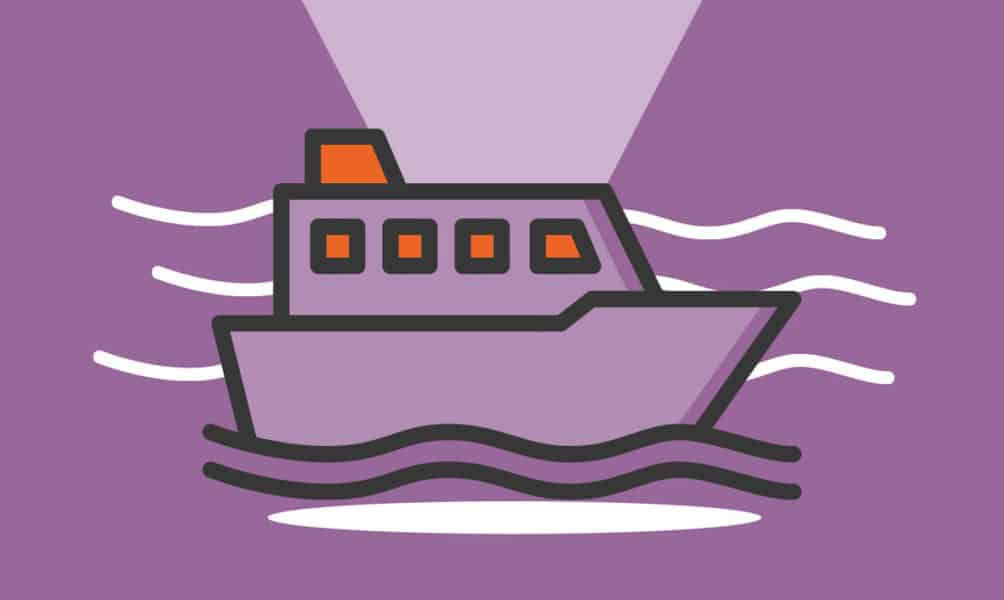
Investment range
$5,550 - $12,100
Revenue potential
$84,000 - $210,000 p.a.
Time to build
1 – 3 months
Profit potential
$60,000 - $150,000 p.a.
Industry trend
Have you ever dreamed of being a charter boat captain? The US private boating market is growing fast and a charter boat business offers broad opportunity, from a fishing charter business to a diving charter business, or even a yacht charter business. It’s an industry already worth more than three-quarters of a billion dollars, so there’s good money to be made. A significant investment is required, as boats don’t come cheap, but you can quickly start making it back.
Before you set sail, however, you’ll need to hone your entrepreneurial knowledge. Luckily, this step-by-step guide will teach you everything you need to know to get started and put you on course to building a successful boat charter business.
Looking to register your business? A limited liability company (LLC) is the best legal structure for new businesses because it is fast and simple.
Form your business immediately using ZenBusiness LLC formation service or hire one of the Best LLC Services .
Step 1: Decide if the Business Is Right for You
Pros and cons.
Starting a charter boat business has pros and cons to consider before deciding if it’s right for you.
- Good Money – Make $700 per day in-season
- Fun! – Be in the sun on the water all day
- Flexibility – Choose when to schedule trips
- Weather-Dependent – Cancelled trips due to extreme weather
- High Startup Costs – Boats are expensive
Charter boat industry trends
Industry size and growth.
- Industry size and past growth – The US private boat charter industry is worth nearly $780 million after impressive 15% growth in 2021.(( https://www.ibisworld.com/united-states/market-research-reports/private-boat-charters-industry/ ))
- Growth forecast – The US private boat charter industry is expected to grow steadily over the next five years.
- Number of businesses – In 2021, 807 private boat charter businesses were operating in the US.
- Number of people employed – In 2021, the private boat charter industry employed 2,482 people.
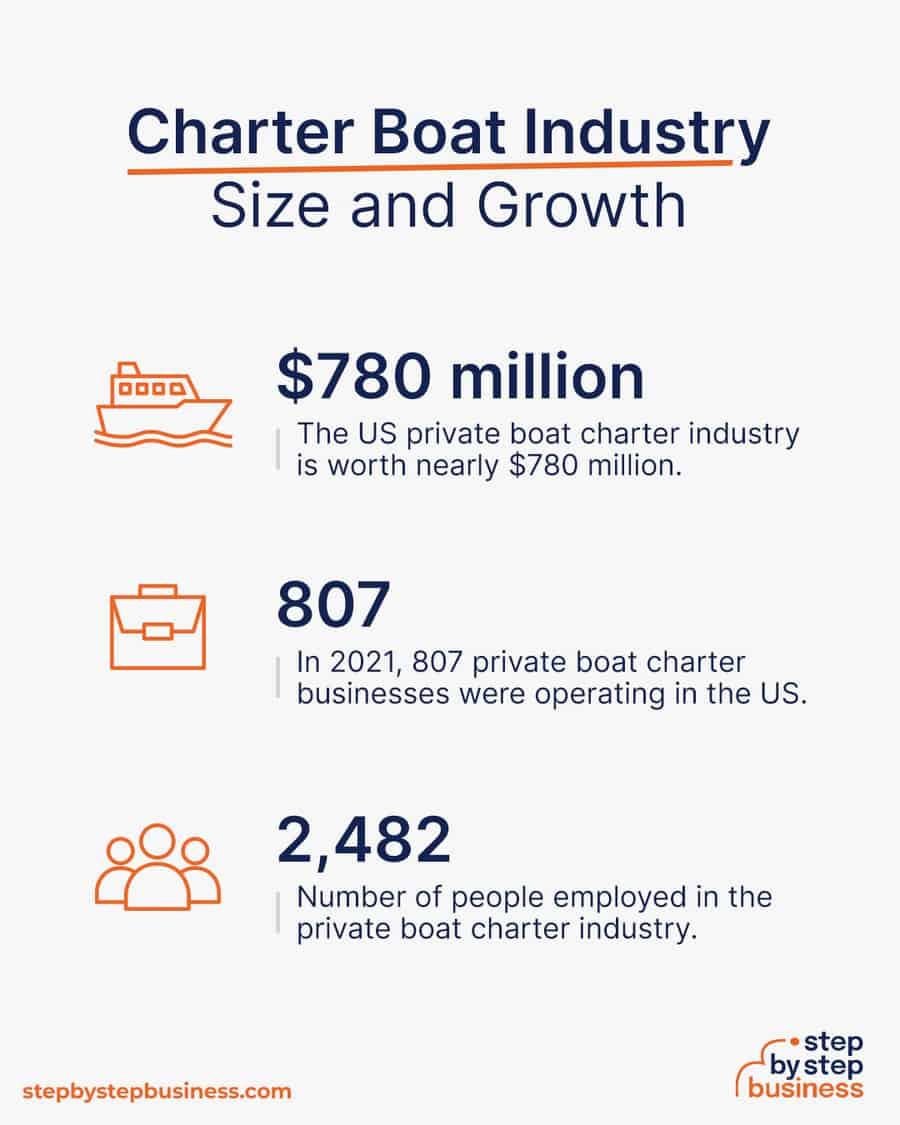
Trends and challenges
Trends in the boat charter industry include:
- Fishing charters are the most popular type of charter boat trips, presenting an opportunity for charter boat businesses to specialize.
- Boat safety features are improving, so a charter boat business that has all the latest safety features can have a competitive edge.
Challenges in the charter boat industry include:
- Rising fuel prices are cutting into the profit margins of charter boat businesses.
- Charter boat businesses need to constantly maintain their boats, a cost that is often underestimated.
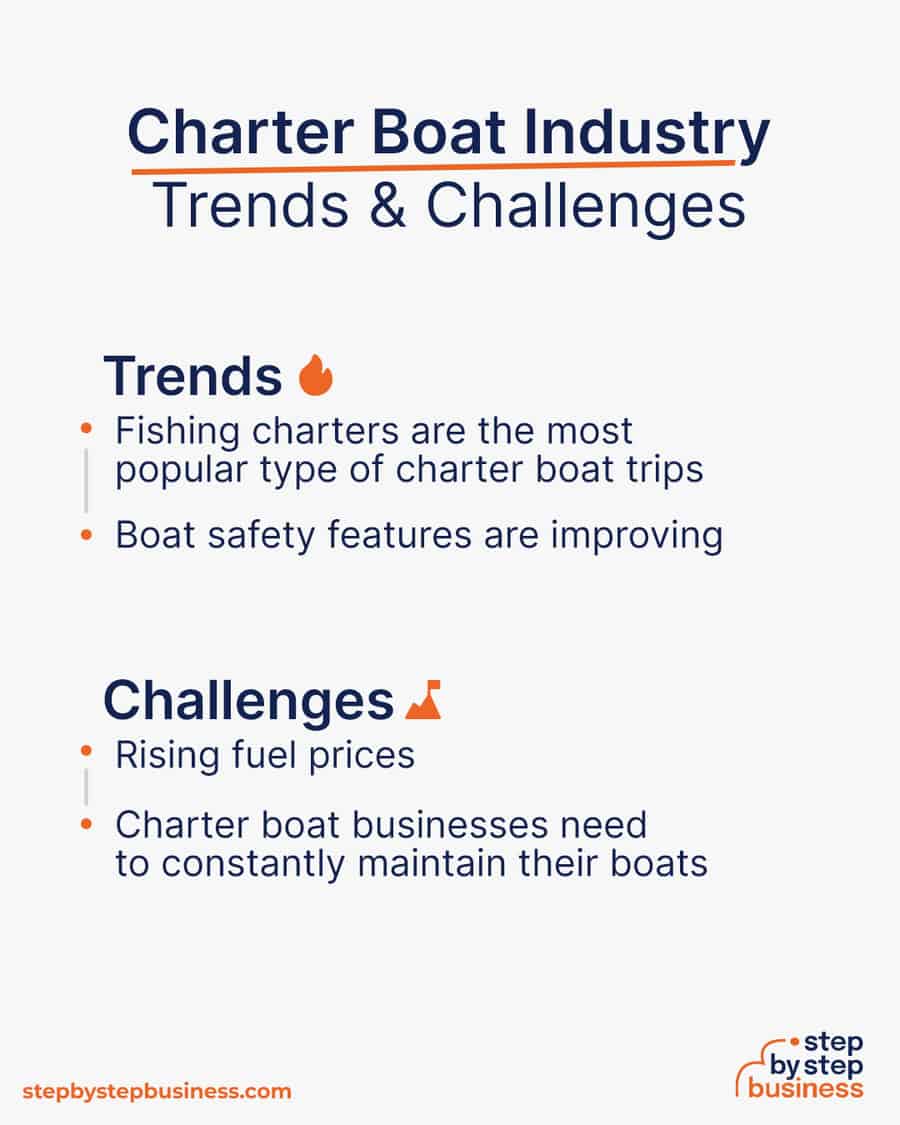
How much does it cost to start a charter boat business?
The startup costs for a charter boat business range from $5,500 to $12,000. The largest expense is for a down payment on a boat.
You’ll need a handful of items to successfully launch your charter boat business, including:
- Life jackets
- Fire extinguishers and other safety equipment
- Fishing equipment
How much can you earn from a charter boat business?
The average price for a one-day boat rental or charter is $700. Your profit margin after fuel and maintenance should be about 70%.
In your first year or two, you could do 120 one-day rentals per season, bringing in $84,000 in annual revenue. This would mean nearly $60,000 in profit, assuming that 70% margin. As your business gains traction, sales could climb to 300 trips in a year. With annual revenue of $210,000, you’d make a tidy profit of close to $150,000.
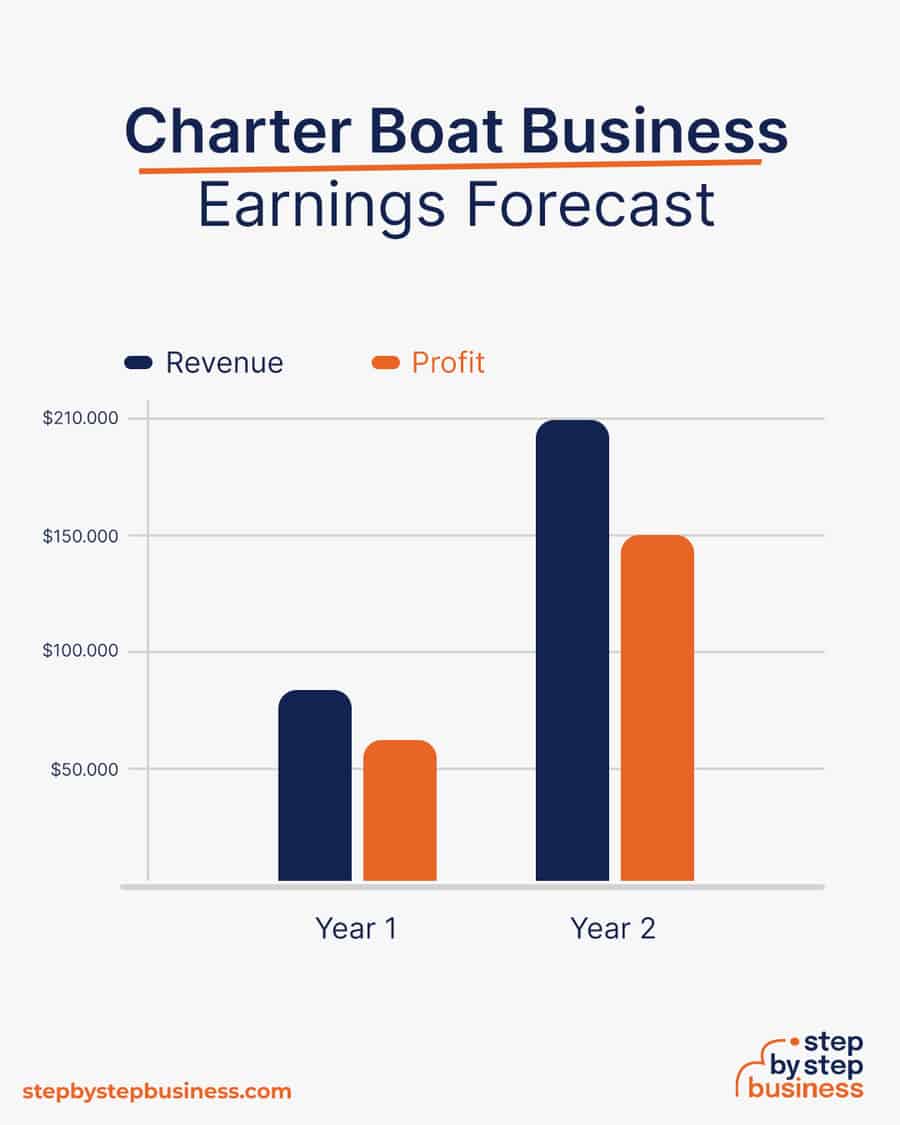
What barriers to entry are there?
There are a few barriers to entry for a charter boat business. Your biggest challenges will be:
- The cost of a down payment on a boat
- The boating skills required to be a charter boat captain
Related Business Ideas
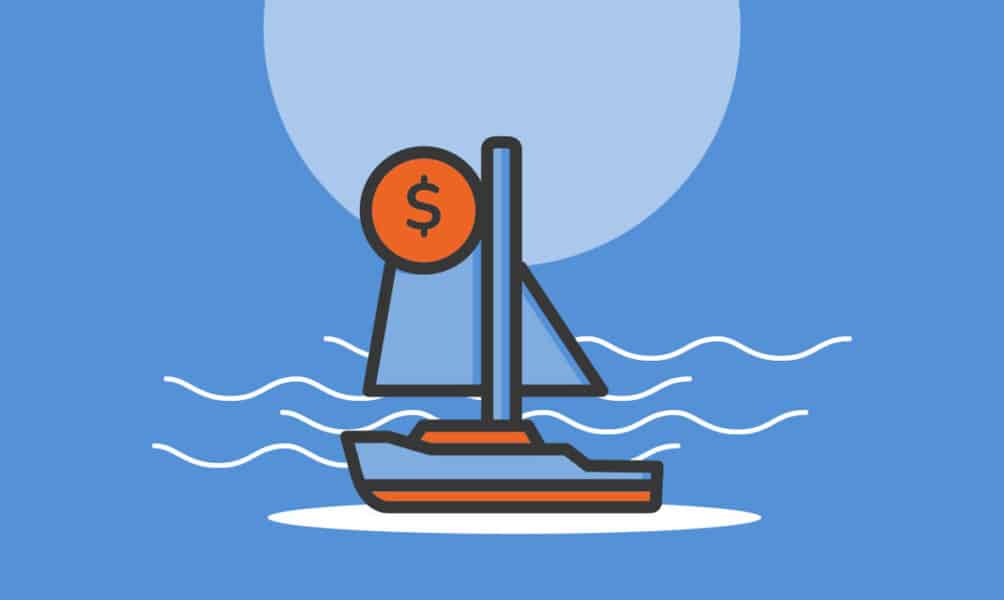
How to Start a Boat Rental Business

How to Start a Freight Forwarding Business

How to Start a Box Truck Business
Step 2: hone your idea.
Now that you know what’s involved in starting a charter boat business, it’s a good idea to hone your concept in preparation to enter a competitive market.
Choose a location for a charter boat business
When selecting a location for your charter boat business, it’s essential to weigh various factors:
- Market Demand : Research the local and tourist demand for charter boat services in potential locations. Look for areas with a high influx of tourists, especially those interested in activities like fishing, sightseeing, or water sports.
- Access to Water Bodies : The proximity to and accessibility of suitable water bodies (oceans, lakes, rivers) is crucial. Consider the types of activities your charter will offer and choose a location that supports these activities (e.g., deep-sea fishing requires access to the ocean).
- Marina Facilities : Evaluate the quality of marina facilities. Good mooring spots, maintenance services, fueling stations, and customer amenities are essential for the smooth operation of your business.
- Weather and Seasonality : Consider the climate and weather patterns. Areas with longer seasons of good weather can potentially offer more business days. However, also prepare for off-season business strategies.
- Customer Accessibility : Look at how easy it is for customers to reach your location. Proximity to tourist hotspots, hotels, and transport hubs can be advantageous.
- Economic Stability : The economic stability of the location can impact your business. Thriving economic areas with higher disposable incomes can be more lucrative.
- Local Partnerships and Networking : Explore potential partnerships with local businesses such as hotels, travel agencies, and event planners. These partnerships can provide a steady stream of customers.
- Scenic Appeal and Unique Offerings : Areas with natural beauty or unique marine life can attract more customers. Consider what unique features your location can offer that others can’t.
- Safety and Security : Ensure the location is safe for both customers and your business. This includes both on-water safety and the general safety of the area.
Why? Identify an opportunity
Research charter boat businesses in your area to examine their services, price points, and customer reviews. You’re looking for a market gap to fill. For instance, maybe the market is missing a charter boat business that offers dinner cruises or snorkeling and diving. A location with fewer existing charter services might offer more opportunities but consider if the low competition is due to poor demand.
You might consider targeting a niche market by specializing in a certain aspect of your industry, such as fishing or late night party cruises.
Your services will depend on the type of charters you decide to do. You can offer fishing charters or diving charters, late night cruises, local boat tours and more. You can also offer food and drinks.
How much should you charge for charter boats?
The average price for a day charter is $700. You should check prices in your area to make sure that you’re competitive. You should aim for a profit margin of about 70%.Once you know your costs, you can use this Step By Step profit margin calculator to determine your mark-up and final price points. Remember, the prices you use at launch should be subject to change if warranted by the market.
Who? Identify your target market
Your target market will be broad, mainly tourists. You should spread out your marketing to include sites like TikTok, Instagram, and Facebook.
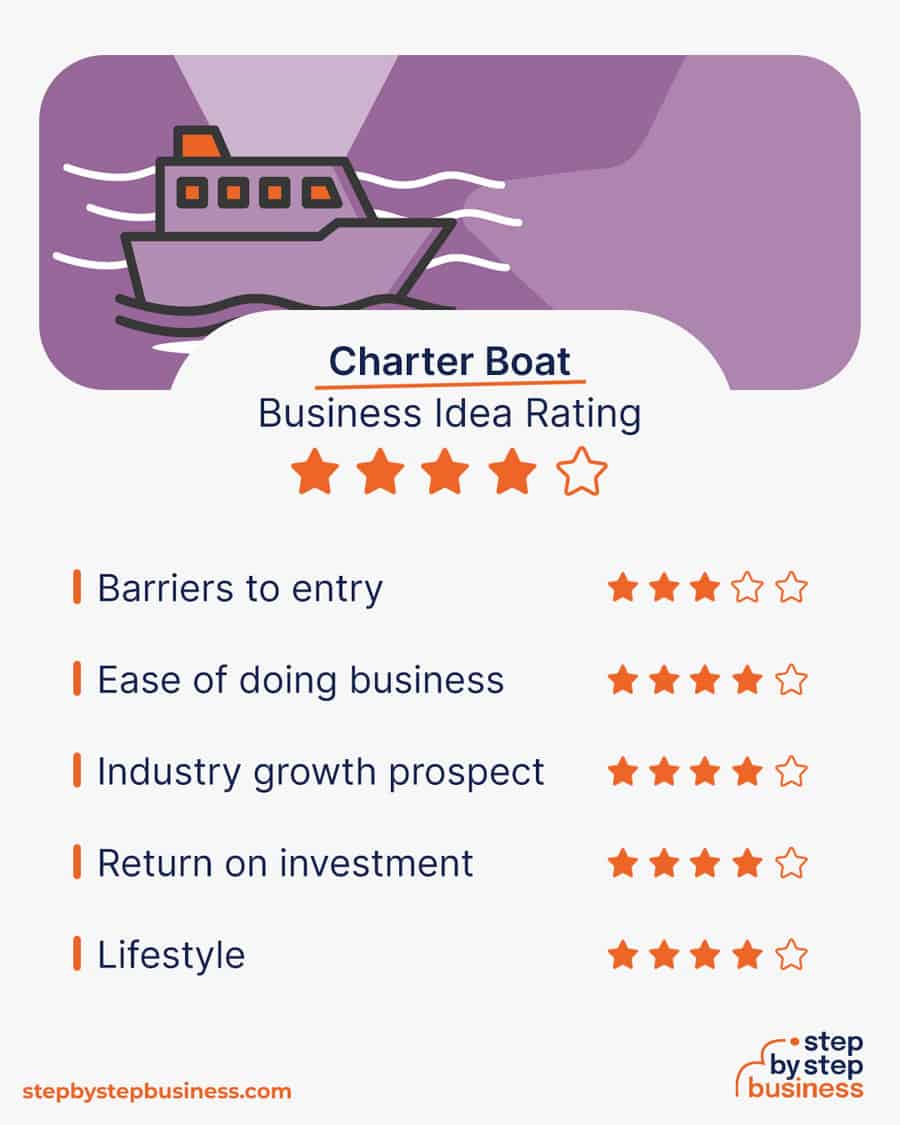
Step 3: Brainstorm a Charter Boat Business Name
Your business name is your business identity, so choose one that encapsulates your objectives, services, and mission in just a few words. You probably want a name that’s short and easy to remember, since much of your business, and your initial business in particular, will come from word-of-mouth referrals.
Here are some ideas for brainstorming your business name:
- Short, unique, and catchy names tend to stand out
- Names that are easy to say and spell tend to do better
- Name should be relevant to your product or service offerings
- Ask around — family, friends, colleagues, social media — for suggestions
- Including keywords, such as “charter boating” or “charter fishing”, boosts SEO
- Name should allow for expansion, for ex: “High Seas Charter Services” over “Scuba Diving Charters”
- Avoid location-based names that might hinder future expansion
Discover over 310 unique charter boat business name ideas here . If you want your business name to include specific keywords, you can also use our charter boat business name generator. Just type in a few keywords and hit “generate” and you’ll have dozens of suggestions at your fingertips.
Once you’ve got a list of potential names, visit the website of the US Patent and Trademark Office to make sure they are available for registration and check the availability of related domain names using our Domain Name Search tool. Using “.com” or “.org” sharply increases credibility, so it’s best to focus on these.
Find a Domain
Powered by GoDaddy.com
Finally, make your choice among the names that pass this screening and go ahead with domain registration and social media account creation. Your business name is one of the key differentiators that sets your business apart. Once you pick your company name, and start with the branding, it is hard to change the business name. Therefore, it’s important to carefully consider your choice before you start a business entity.
Step 4: Create a Charter Boat Business Plan
Every business needs a plan. This will function as a guidebook to take your startup through the launch process and maintain focus on your key goals. A business plan also enables potential partners and investors to better understand your company and its vision:
- Executive Summary: A brief overview highlighting the key points of the charter boat business plan, summarizing its objectives and potential.
- Business Overview: Detailed information about the charter boat business, including its mission, vision, and the problem it aims to solve in the market.
- Product and Services: Clearly defined offerings, specifying the types of charter boat services, packages, and any additional amenities provided.
- Market Analysis: An examination of the target market, identifying customer needs, market trends, and potential growth opportunities for the charter boat business.
- Competitive Analysis: Evaluation of competitors in the charter boat industry, highlighting strengths and weaknesses to position the business effectively in the market.
- Sales and Marketing: Strategies for promoting and selling charter boat services, including pricing, advertising, and promotional activities to attract customers.
- Management Team: Introduction of the key individuals responsible for running the charter boat business, emphasizing their expertise and roles.
- Operations Plan: Details on how the business will operate, covering logistics, maintenance, safety protocols, and any partnerships necessary for smooth operations.
- Financial Plan: Projections of the charter boat business’s financial performance, including revenue forecasts, expense estimates, and break-even analysis.
- Appendix: Supplementary materials, such as charts, graphs, or additional documentation, supporting and enhancing the information presented in the charter boat business plan.

If you’ve never created a business plan, it can be an intimidating task. You might consider hiring a business plan specialist to create a top-notch business plan for you.
Step 5: Register Your Business
Registering your business is an absolutely crucial step — it’s the prerequisite to paying taxes, raising capital, opening a bank account, and other guideposts on the road to getting a business up and running.
Plus, registration is exciting because it makes the entire process official. Once it’s complete, you’ll have your own business!
Choose where to register your company
Your business location is important because it can affect taxes, legal requirements, and revenue. Most people will register their business in the state where they live, but if you’re planning to expand, you might consider looking elsewhere, as some states could offer real advantages when it comes to charter boat businesses.
If you’re willing to move, you could really maximize your business! Keep in mind, it’s relatively easy to transfer your business to another state.
Choose your business structure
Business entities come in several varieties, each with its pros and cons. The legal structure you choose for your charter boat business will shape your taxes, personal liability, and business registration requirements, so choose wisely.
Here are the main options:
- Sole Proprietorship – The most common structure for small businesses makes no legal distinction between company and owner. All income goes to the owner, who’s also liable for any debts, losses, or liabilities incurred by the business. The owner pays taxes on business income on his or her personal tax return.
- General Partnership – Similar to a sole proprietorship, but for two or more people. Again, owners keep the profits and are liable for losses. The partners pay taxes on their share of business income on their personal tax returns.
- Limited Liability Company (LLC) – Combines the characteristics of corporations with those of sole proprietorships or partnerships. Again, the owners are not personally liable for debts.
- C Corp – Under this structure, the business is a distinct legal entity and the owner or owners are not personally liable for its debts. Owners take profits through shareholder dividends, rather than directly. The corporation pays taxes, and owners pay taxes on their dividends, which is sometimes referred to as double taxation.
- S Corp – An S-Corporation refers to the tax classification of the business but is not a business entity. An S-Corp can be either a corporation or an LLC , which just need to elect to be an S-Corp for tax status. In an S-Corp, income is passed through directly to shareholders, who pay taxes on their share of business income on their personal tax returns.

We recommend that new business owners choose LLC as it offers liability protection and pass-through taxation while being simpler to form than a corporation. You can form an LLC in as little as five minutes using an online LLC formation service. They will check that your business name is available before filing, submit your articles of organization , and answer any questions you might have.
Form Your LLC
Choose Your State
We recommend ZenBusiness as the Best LLC Service for 2023

Step 6: Register for Taxes
The final step before you’re able to pay taxes is getting an Employer Identification Number , or EIN. You can file for your EIN online or by mail or fax: visit the IRS website to learn more. Keep in mind, if you’ve chosen to be a sole proprietorship you can simply use your social security number as your EIN.
Once you have your EIN, you’ll need to choose your tax year. Financially speaking, your business will operate in a calendar year (January–December) or a fiscal year, a 12-month period that can start in any month. This will determine your tax cycle, while your business structure will determine which taxes you’ll pay.
The IRS website also offers a tax-payers checklist , and taxes can be filed online.
It is important to consult an accountant or other professional to help you with your taxes to ensure you’re completing them correctly.
Step 7: Fund your Business
Securing financing is your next step and there are plenty of ways to raise capital:
- Bank loans : This is the most common method but getting approved requires a rock-solid business plan and strong credit history.
- SBA-guaranteed loans : The Small Business Administration can act as guarantor, helping gain that elusive bank approval via an SBA-guaranteed loan .
- Government grants : A handful of financial assistance programs help fund entrepreneurs. Visit Grants.gov to learn which might work for you.
- Friends and Family : Reach out to friends and family to provide a business loan or investment in your concept. It’s a good idea to have legal advice when doing so because SEC regulations apply.
- Crowdfunding : Websites like Kickstarter and Indiegogo offer an increasingly popular low-risk option, in which donors fund your vision. Entrepreneurial crowdfunding sites like Fundable and WeFunder enable multiple investors to fund your business.
- Personal : Self-fund your business via your savings or the sale of property or other assets.
Bank and SBA loans are probably the best option, other than friends and family, for funding a charter boat business. You might also try crowdfunding if you have an innovative concept.

Step 8: Apply for Licenses and Permits
Starting a charter boat business requires obtaining a number of licenses and permits from local, state, and federal governments.
The US Coast Guard requires boat owners who run a charter to have a captain’s license. You can find information on getting this license with Maritime Professional Training . You may also need a fishing guide license.
Federal regulations, licenses, and permits associated with starting your business include doing business as (DBA), health licenses and permits from the Occupational Safety and Health Administration ( OSHA ), trademarks, copyrights, patents, and other intellectual properties, as well as industry-specific licenses and permits.
You may also need state-level and local county or city-based licenses and permits. This includes licenses, safety regulations, fishing limits, and environmental guidelines. The license requirements and how to obtain them vary, so check the websites of your state, city, and county governments or contact the appropriate person to learn more.
You could also check this SBA guide for your state’s requirements, but we recommend using MyCorporation’s Business License Compliance Package . They will research the exact forms you need for your business and state and provide them to ensure you’re fully compliant.
This is not a step to be taken lightly, as failing to comply with legal requirements can result in hefty penalties.
If you feel overwhelmed by this step or don’t know how to begin, it might be a good idea to hire a professional to help you check all the legal boxes.
Step 9: Open a Business Bank Account
Before you start making money, you’ll need a place to keep it, and that requires opening a bank account .
Keeping your business finances separate from your personal account makes it easy to file taxes and track your company’s income, so it’s worth doing even if you’re running your charter boat business as a sole proprietorship. Opening a business bank account is quite simple, and similar to opening a personal one. Most major banks offer accounts tailored for businesses — just inquire at your preferred bank to learn about their rates and features.
Banks vary in terms of offerings, so it’s a good idea to examine your options and select the best plan for you. Once you choose your bank, bring in your EIN (or Social Security Number if you decide on a sole proprietorship), articles of incorporation, and other legal documents and open your new account.
Step 10: Get Business Insurance
Business insurance is an area that often gets overlooked yet it can be vital to your success as an entrepreneur. Insurance protects you from unexpected events that can have a devastating impact on your business.
Here are some types of insurance to consider:
- General liability : The most comprehensive type of insurance, acting as a catch-all for many business elements that require coverage. If you get just one kind of insurance, this is it. It even protects against bodily injury and property damage.
- Business Property : Provides coverage for your equipment and supplies.
- Equipment Breakdown Insurance : Covers the cost of replacing or repairing equipment that has broken due to mechanical issues.
- Worker’s compensation : Provides compensation to employees injured on the job.
- Property : Covers your physical space, whether it is a cart, storefront, or office.
- Commercial auto : Protection for your company-owned vehicle.
- Professional liability : Protects against claims from a client who says they suffered a loss due to an error or omission in your work.
- Business owner’s policy (BOP) : This is an insurance plan that acts as an all-in-one insurance policy, a combination of the above insurance types.

Step 11: Prepare to Launch
As opening day nears, prepare for launch by reviewing and improving some key elements of your business.
Essential software and tools
Being an entrepreneur often means wearing many hats, from marketing to sales to accounting, which can be overwhelming. Fortunately, many websites and digital tools are available to help simplify many business tasks.
You may want to use industry-specific software, such as Sedna , Starboard Suite , or Stellar , to manage your bookings, scheduling, invoicing, and payments.
- Popular web-based accounting programs for smaller businesses include Quickbooks , Freshbooks , and Xero .
- If you’re unfamiliar with basic accounting, you may want to hire a professional, especially as you begin. The consequences for filing incorrect tax documents can be harsh, so accuracy is crucial.
Develop your website
Website development is crucial because your site is your online presence and needs to convince prospective clients of your expertise and professionalism.
You can create your own website using website builders . This route is very affordable, but figuring out how to build a website can be time-consuming. If you lack tech-savvy, you can hire a web designer or developer to create a custom website for your business.
They are unlikely to find your website, however, unless you follow Search Engine Optimization ( SEO ) practices. These are steps that help pages rank higher in the results of top search engines like Google.
For your charter boat business, the marketing strategy should focus on showcasing the unique experiences you offer, such as fishing trips, sightseeing tours, or private events. Emphasize the quality and safety of your vessels, the expertise of your crew, and the range of experiences available. The goal is to establish your charter as an unforgettable, enjoyable, and safe choice for individuals and groups seeking water-based adventures. Here are some powerful marketing strategies for your future business:
Kickstart Marketing
- Professional Branding : Ensure your branding reflects the adventure, luxury, or relaxation your charters offer, from your logo to your boat decor.
- Direct Outreach : Network with local hotels, travel agencies, and tourism boards to offer your charter services as part of travel packages or exclusive deals.
Digital Presence and Online Marketing
- Professional Website and SEO : Develop a visually appealing website that showcases your boats, services, and customer testimonials. Implement SEO best practices to optimize your site for relevant search terms related to charter boats, fishing trips, or scenic tours, depending on your niche.
- Social Media Engagement : Use platforms like Instagram, Facebook, and YouTube to post beautiful imagery of your boat trips, share customer experiences, and highlight the unique aspects of your services.
Content Marketing and Engagement
- Sea Adventures Blog : Share blog posts about the local marine environment, tips for a successful charter trip, fishing guides, or highlights of scenic tour routes.
- Customer Testimonials and Success Stories : Feature stories and reviews from satisfied customers, focusing on the memorable experiences they had during your charter trips.
- Video Tours and Guides : Create video content that showcases the beauty of the areas you tour, provides virtual tours of your vessels, or offers tips for first-time charter clients.
Experiential and In-Person Engagements
- Open Boat Days : Host days where potential customers can visit and tour your boats, meet the crew, and learn about your services.
- Participation in Local Events : Engage in local waterfront festivals, boat shows, and fishing tournaments to showcase your charter services and connect with potential customers.
Collaborations and Community
- Partnerships with Local Businesses : Collaborate with local businesses for mutual referrals, such as partnering with seaside restaurants for meal packages or accommodations for overnight charters.
- Community Involvement : Sponsor or participate in community environmental initiatives, emphasizing your commitment to marine conservation.
Customer Relationship and Loyalty Programs
- Loyalty Rewards : Offer repeat customers discounts or upgrades on future trips to encourage repeat business and referrals.
- Referral Incentives : Implement a referral program that rewards clients for bringing new customers to your charter service.
Promotions and Advertising
- Targeted Advertising : Use digital advertising on travel and tourism platforms, as well as local community boards, to reach potential clients.
- Email Marketing : Maintain engagement with past and potential clients through newsletters that include trip highlights, special offers, and updates about your services.
Focus on USPs
Unique selling propositions, or USPs, are the characteristics of a product or service that sets it apart from the competition. Customers today are inundated with buying options, so you’ll have a real advantage if they are able to quickly grasp how your charter boat business meets their needs or wishes. It’s wise to do all you can to ensure your USPs stand out on your website and in your marketing and promotional materials, stimulating buyer desire.
Global pizza chain Domino’s is renowned for its USP: “Hot pizza in 30 minutes or less, guaranteed.” Signature USPs for your charter boat business could be:
- Fishing day trips to reel in the big one!
- Dinner cruises to view the sunset in style
- Tour the local scenery relaxing on a luxury boat

You may not like to network or use personal connections for business gain. But your personal and professional networks likely offer considerable untapped business potential. Maybe that Facebook friend you met in college is now running a charter boat business, or a LinkedIn contact of yours is connected to dozens of potential clients. Maybe your cousin or neighbor has been working in boats for years and can offer invaluable insight and industry connections.
The possibilities are endless, so it’s a good idea to review your personal and professional networks and reach out to those with possible links to or interest in boating. You’ll probably generate new customers or find companies with which you could establish a partnership.
Step 12: Build Your Team
If you’re starting out small from a home office, you may not need any employees. But as your business grows, you will likely need workers to fill various roles. Potential positions for a charter boat business include:
- Charter Boat Drivers – drive on boat trips
- General Manager – scheduling, accounting
- Marketing Lead – SEO strategies, social media
At some point, you may need to hire all of these positions or simply a few, depending on the size and needs of your business. You might also hire multiple workers for a single role or a single worker for multiple roles, again depending on need. Free-of-charge methods to recruit employees include posting ads on popular platforms such as LinkedIn, Facebook, or Jobs.com. You might also consider a premium recruitment option, such as advertising on Indeed , Glassdoor , or ZipRecruiter . Further, if you have the resources, you could consider hiring a recruitment agency to help you find talent.
Step 13: Run a Charter Boat Business – Start Making Money!
What could be more fun than being the captain of your own ship and sharing the joy with your customers? You can make good money while spending your time in the sun on the water. You’ll need to make an investment to get started, but you’ll be stepping into an industry that’s growing fast. You’ve got the knowledge you need, now it’s time to go ahead and launch your boat and your successful new business.
- Charter Boat Business FAQs
With prices at $700 per party per day, you can make excellent money. As long as you’re in a good location and you’re knowledgeable about the area, you can be successful.
You can take various online courses to learn about boating through the Boat U.S. Foundation . Courses cost between $35 and $40. Hands on boating education requirements and providers for licensing purposes vary by state.
Like any business, starting a charter boat business is challenging. You should do plenty of research before deciding if it’s right for you.
Charter boat captain salaries vary by location. Salaries usually fall somewhere in the $60,000s.
Dream Yacht Charter is the largest charter boat company. They have nearly 1,000 boats in their fleet.
Leave a Reply Cancel reply
Your email address will not be published. Required fields are marked *
Save my name, email, and website in this browser for the next time I comment.
- Decide if the Business Is Right for You
- Hone Your Idea
- Brainstorm a Charter Boat Business Name
- Create a Charter Boat Business Plan
- Register Your Business
- Register for Taxes
- Fund your Business
- Apply for Licenses and Permits
- Open a Business Bank Account
- Get Business Insurance
- Prepare to Launch
- Build Your Team
- Run a Charter Boat Business - Start Making Money!
Subscribe to Our Newsletter
Featured resources.

21 Profitable Beach Business Ideas
David Lepeska
Published on July 21, 2022
So you live near a beach. Lucky you! You can go swimming or walk barefoot in the sand any time you like. Even better, you could also start abusiness ...

41 Outdoor Business Ideas
Carolyn Young
Published on July 13, 2022
Many major American businesses depend on outdoor activities, such as The North Face or Columbia. But there are also countless smaller businessesthat ...

18 Rental Business Ideas
Published on July 12, 2022
Businesses that rely on regular rental payments are guaranteed a steady stream of income, which is why so many of them draw so much entrepreneuriali ...
No thanks, I don't want to stay up to date on industry trends and news.
- Schedule a free demo
- Get in touch
- Airbnb clone blog
- Business Ideas
- Business Model
- Development Guide
- Entrepreneurship
- Getting Started
- Marketing Strategy
- Marketplace Business Ideas
- Mobile App Ideas
- Uber clone blog

How to Start a Boat Rental Business - A 2024 Guide
Thinking about starting a boat rental business? Choosing the right place, purchasing a boat, permit, and license, and more involved in starting a boat rental business.
If you’re passionate about boating, starting a boat rental business is like having fun along the way.
This means turning passion into professionals.
In other cases, if you are unfamiliar with the boat rental business, but hoping to start one, this guide has all your answers.
The rising interest in water-based activities and the post-pandemic effect have accelerated the growth of this industry.
It's no surprise that this industry is worth $5 billion in the United States.
Apart from that fact, let’s move to the content.
Start your boat rental business with these steps!
Identifying the purpose and being there, choosing the right place, allocate your budget, you need a boat, understanding the boat rental business, permit and license, market your boat rental business.
- Scale your revenue
Comply with the current trends
People rent a boat for various causes - knowing of that will make you prepared to serve well.
There are several types which you can specialize in,
- Serving houseboat rentals
- Serving sailboats, deck boats, and yacht
- Serving motor boats and fishing boats
Of course, there is a lot you may be tired of hearing it. When you try to count the number of boats, there are several. Therefore, it’s difficult to address each market and be there for renters.
While choosing the market type, pick which you’re more passionate about and whom(which audience) you can serve well.
Though the above-mentioned types are seasonal, so you need to make the best out of those busy months.
Tips to choose the market type,
- Research the boat rental market before getting in
- Research your location - like you’re near to lake, river, or seafront
- And what is missing?
These factors can help you leap in the right direction.
If you are already in any of the boat rental types, or have a good knowledge about the niche before, it could load off your shoulder and makes you focus on the other worries.
I am not being pessimistic, worries have to be your case while doing business. That’s how you find a solution to every problem.
The right place for your business set off the remaining thing for you.
Imagine choosing a place where your target audience is barely showing their interest.
You wouldn’t like these.
Let’s say you have invested everything in your boat and ended up serving the wrong place and people.
That’s why you need some analysis or networking with the boat owners to help you from the chaos.
Starting a boat rental business would cost you more. But, maintaining it, “Is probably the same story”.
But you can pave your way across it.
The cost involved in the boat:
- The purchase of the boat
- Boat registration
- Regular maintenance
The above things were said by an actual boat owner.
Her name is Linzy(I think) said that her total investment was $46,000(Including all the expenses)
The question is, “Does she make it or break it.”
Through the boat, she had made a total of 147 bookings; on average if the renters book for 3 hrs, which cost $449, and if we multiply, the result is $66,003.
Her boat had made a total of 147 bookings; on average if the renters book for 3 hrs, which cost $449 per boat, and if we multiply it, the result comes to $66,003.
Yeah, she made it.
Here is the video, where Linzy shares her experience of owning a boat rental business.
Starting from one boat, now she owned around 9 boats across two different locations.
I am not sure whether everyone can make it or not. That depends on the proper planning and execution.
Here in the boat rental business, the investments are huge, that’s why you need to be cautious while allocating your budget.
Invest only if you believe you can make it, and that belief does not have to come from within. It should be evident from the facts.
Have you watched the video - like there are many you can search for and get insight from the boat owners.
They can guide you well.
Whether it’s leasing a boat or purchasing a new one, the boat shouldn’t eat up your maintenance cost and have to comply with industry standards.
Before that, find out your customer preference and target market.
Moreover, the boat type (pontoon, sailboat, speedboat, etc.), capacity, features, and maintenance costs.
These factors should influence your purchasing decision.
Identify the type of boats that are in demand, their pricing plans, and the peak boating seasons.
Doing these all are the same as doing first aid. You made sure that you were on the proper track before diving in.
After the work is done, you can use this data to develop a solid business plan that outlines your unique selling proposition, marketing strategies, and financial goals.
Operating a boat rental business entails legal obligations.
Things like permits, licenses, and insurance coverage may be required based on your location.
Consult with local authorities to ensure that you comply with all safety, boating, and environmental standards.
You have your boat, equipment, and a platform to offer your boat rental service.
Don’t you feel something missing here?
Yes, you have seen the title “Marketing”
Getting there, marketing helps you create a presence of your service leveraging various platforms.
For your boat rental business, the top channels are social media, SEO, and paid ads.
On social media where you can show stunning visuals, a glimpse of your renters rejoicing in your boat, and their video testimonials.
It allows you to directly interact with your possible customers and eventually can build authority and trust.
1 - Search engine optimization
Search engine optimization is about optimizing your website by following the guidelines outlined by the search engines.
Google, which is the no 1 search engine lists out an SEO best practice for websites.
Don’t have any idea about SEO? Read this Google SEO documentation . Or you can hire a professional to do SEO for your website.
If you manage to rank your website for specific keywords, you get traffic that eventually turns into your customers.
2 - Paid ads
If SEO gives you a big hand, paid ads give you the same result swiftly.
In SEO, where your expense relies only on professionals, but in paid ads, you need professionals combined with your cash spend.
To get started with paid ads, you can consider Google ads.
Before that, you need to create your account by searching “Google Ads”, and you will be shown their website.
Need a hand in starting with Google Ads, here it is .
3 - Word of mouth
Word of mouth doesn’t cost you cash like in paid ads.
Offering exceptional customer service put you in the top spot despite heavy competition.
Always prioritize things like your customer inquiries, and resolve any concerns they might have.
Creating positive customer experiences not only encourages them to do repeat business but also generates word-of-mouth referrals.
Scale your boat rental business revenue
1 - dynamic pricing.
Otherwise known as surge pricing, which is a popular pricing strategy used by Uber and Airbnb.
Let's get a clear picture of it.
It means pricing doesn’t remain the same for every day, it may surge through the high demand, time of day, and season impact the cost.
On a typical day, the pricing may remain constant. However, during busy or holiday periods, you can take advantage of the increased demand.
2 - Cross-selling
Don't limit yourself to merely renting the boat.
Maybe your customer who rents your boat wants more than a boat. I'm referring to the necessary equipment, such as fishing rods and bait.
You can also charge them for this.
3 - Subscription-based revenue
Some people seek to rent a boat on a monthly basis. With just one customer, this might make your boat very busy.
This way, you can utilize the boat before the month even begins. So you can allocate the fund for other operations.
Current trends revolve around adapting your website to people's preferences and growing technologies.
Your audiences are growing, and so does their expectations.
For that, a decent website would do better to create a worthwhile booking experience; moreover, an app combined would be the added advantage.
I can hear your question.
What about the cost involved in developing the website and app?
Let’s introduce our Airbnb clone, which is a pre-build web and mobile app that empowers you to manage your boat rental business all through the admin panel.
Even though it’s an Airbnb clone, with minor customization, we can make it look like a boat rental platform - all within your budget.
Starting a boat rental business is not everyone's cup of cake. It requires extensive research, planning, and investment.
I hope the given checklist can guide you in starting your boat rental business. Moreover, it has the potential to scale your business to the next level.
My words aren't mere promises; they underscore the importance of professionalism.
Good luck with your boat rental business.
Get your online boat rental platform
Fill out this form and get a 30-min session with our expert to discuss how our Airbnb clone helps you launch your boat rental platform.

Mohamed Imran
Imran is very fond of sharing his knowledge of business and marketing.
You might also like

Starting a Vacation Rental Business in Dubai
You have an idea to start a vacation rental business in Dubai, UAE, but don't know where to start. These 9 steps will help you get started.

Things To Do Before Starting a Business
From the idea to funding, we have every checklist covered in this blog. So enjoy your read and get started with your entrepreneurial journey.
Join our newsletter
Join the newsletter to receive the latest updates in your inbox.
Featured Posts
Marketing strategy for your handyman app.

Developing an App-like Uber - A Guide

Build a Website like Airbnb: A Ultimate Guide


Essential Guide: Starting a Boat Rental Business
Main Sections In This Post Steps To Starting A Boat Rental Business Points to Consider Resources Knowledge Is Power Featured Video
Introduction
Starting a boat rental business can be an exciting venture. There are numerous examples of successful businesses in this industry offering various boat rental services. To help you get started, this overview will give you an idea of what to expect.
We will cover important issues to consider, such as licenses, insurance, and safety measures.
Additionally, you will find useful resources and information to assist you during the startup phase and when your business is fully operational. Feel free to bookmark this page for future reference, and if you find this post helpful, please share it!~
Let’s get started with the steps.
Steps to Starting a Boat Rental Business
1. gaining an overview of what you’re getting into.
This section is here to provide you with useful insights and guidance for making informed decisions in your boat rental business.
One crucial factor for success in this industry is you. Understanding your thoughts and feelings about owning and running your own business is important. Devoting time to this section will assist you in making better decisions when it comes to starting a boat rental business.
Your personal perspective plays a significant role in shaping the direction of your venture.
a.) Is Starting a Business the Right Step for You?
Passion plays a vital role in the boat rental business. When you have a genuine passion for your business, it becomes your driving force for success. Even when faced with challenges, you’ll be motivated to find solutions. On the other hand, if you lack passion, problems may make you want to give up easily.
Here’s a scenario to consider: Imagine you win a $50 million lottery. You generously help friends and family and donate to charities. You spend the next two years traveling the world, buying your dream house and a vacation home for weekend getaways. You have all the cars and gadgets you’ve ever desired. You can buy anything you want. Even after all this, you still have $25 million in cash and investments to live as you please.
Here’s an important question: Would you still start a boat rental business in this situation? If your answer is yes, it shows that you genuinely have a passion for this business and are on the right path.
However, if your answer is no, it leads to another question: What would you prefer to do instead?
It might be worth considering pursuing that alternative path instead of starting a boat rental business.
For More, See How Passion Affects Your Business
The Reasons for Starting a Business
Running your boat rental business may seem fantastic: being your own boss, making important decisions, earning a good income, and living the life you’ve always dreamed of. While this can become a reality if you succeed, the journey until then can be challenging.
Before you dive into starting a business, it’s crucial to ensure it’s the right fit for you and that you have the right reasons for doing so.
I recommend checking out the article below, where I discuss key points that will help you make an informed choice before taking the next steps in starting your boat rental business.
Making the right decision from the beginning is essential to increase your chances of success.
See Considerations Before You Start Your Business to identify key points for a new business owner.
b.) A Quick Overview of Owning a Boat Rental Business
Boat Rental Business Overview
As the owner, you are responsible for ensuring the maintenance and safety of the boats in your fleet. This includes regular inspections, repairs, and adhering to safety regulations. You’ll also need to manage reservations and bookings, handle customer inquiries, and provide excellent customer service.
On an average day, you might start by checking the condition of the boats, ensuring they are clean and well-stocked with the necessary equipment. You’ll communicate with your staff, assigning tasks and coordinating schedules. Throughout the day, you’ll interact with customers, assisting them with rentals, providing safety instructions, and addressing any concerns they may have. Administrative tasks, such as managing finances, marketing, and record-keeping, are also part of your responsibilities.
Flexibility is key, as you’ll need to adapt to changing weather conditions, customer demands, and unforeseen challenges. It’s a dynamic business that requires effective organization, strong communication skills, and a passion for providing memorable experiences on the water.
Key Points To Succeed in Boat Rental Business
Several key points should be considered to succeed in a boat rental business.
- Maintain a well-maintained and safe fleet of boats.
- Offer competitive pricing and attractive rental packages.
- Provide excellent customer service.
- Implement effective marketing strategies to reach potential customers.
- Stay updated with industry trends and regulations.
- Build strong relationships with suppliers.
- Develop a solid business plan for long-term success.
Challenges of Running a Boat Rental Business
Running a boat rental business comes with its fair share of challenges. These challenges include:
Seasonal Demand:
Boat rentals often depend on the season, with peak demand during summer and slower periods during colder seasons. Managing fluctuating demand and optimizing revenue throughout the year can be a challenge.
Maintenance and Repairs:
Boats require regular maintenance and occasional repairs to ensure their safety and functionality. This can be time-consuming and costly, impacting both operations and profitability.
Safety and Regulations: Following safety regulations and ensuring customers’ well-being is paramount. Staying up-to-date with safety protocols, licenses, and insurance requirements can be complex and ongoing.
Customer Satisfaction:
Meeting customer expectations and delivering exceptional service is vital for repeat business and positive reviews. Handling customer inquiries, resolving issues, and managing diverse customer preferences require skillful communication and problem-solving .
Successfully navigating these challenges requires careful planning, adaptability, strong operational management, and a commitment to customer satisfaction.
Standalone Boat Rental:
This setup involves operating a standalone boat rental business, where customers can rent boats for specific durations or activities. The business model typically revolves around charging hourly or daily rental fees, often with additional charges for fuel or equipment.
Boat Club Membership:
In this model, customers pay a membership fee to access a fleet of boats. They can then reserve and use the boats within predefined time limits. The business generates revenue through membership fees, often with additional boat usage or maintenance charges.
Charter Boat Services:
Charter boat services offer professionally crewed boats for specific purposes, such as fishing trips, sightseeing tours, or private events. The business model relies on charging customers for the charter service, usually on a per-trip or per-hour basis.
Peer-to-Peer Boat Rentals:
This model operates through online platforms that connect boat owners with individuals seeking boat rentals. The business earns revenue by charging a commission or transaction fee on each booking made through the platform.
Fractional Boat Ownership:
This setup involves selling ownership shares of boats to multiple individuals. Each owner has a specified time allotment to use the boat. The business model relies on the owners’ initial purchase fees and recurring maintenance and management fees.
These are a few examples of boat rental business setups and their associated business models. Each model has its unique characteristics, revenue streams, and operational considerations.
Pros of Running a Boat Rental Business:
- Income Potential: Boat rentals can be profitable, especially during peak seasons when demand is high.
- Flexible Schedule: You can set your own operating hours and work on a schedule that suits you.
- Enjoyment of the Water: If you love being on the water, running a boat rental business allows you to spend time doing what you enjoy.
- Meeting New People: Interacting with customers from various backgrounds can be a rewarding experience.
- Potential for Expansion: As your business grows, you can expand your fleet and offerings to increase revenue.
Cons of Running a Boat Rental Business:
- Seasonal Demand: Business may fluctuate with seasonal variations, leading to inconsistent income.
- High Operating Costs: Costs associated with boat maintenance, repairs, insurance, and fuel can be substantial.
- Weather Dependency: Unfavorable weather conditions can limit rental opportunities and impact revenue.
- Regulatory Compliance: Adhering to safety regulations, permits, and licensing requirements can be time-consuming and complex.
- Competitive Market: There may be competition from other boat rental businesses in the area, requiring effective marketing strategies to stand out.
Considering these pros and cons is important when evaluating the feasibility and challenges of running a boat rental business.
2. Research
Boat rental business research.
Before diving into the boat rental business, it’s important to conduct thorough research to make informed decisions. Gathering quality information is essential in determining if this business is the right fit for you.
One valuable source of information is connecting with experienced individuals already in the industry. They possess the knowledge and expertise to provide reliable insights. Spending time with them can be immensely valuable as you gain insights from their years of experience.
I have written an article to help you connect with the right people and approach them effectively. It offers ideas and guidance on finding industry experts to talk to. I strongly recommend reading this article before starting your boat rental business.
It will give you a strong understanding of what you can expect and help you make well-informed choices. You can find the article through the link below.
See An Inside Look Into the Business You Want To Start for all the details.
Target Audience
Understanding your target market is crucial for a boat rental business. It involves identifying the specific group of people who are most likely to be interested in your offerings.
By understanding your target market, you can tailor your marketing efforts and services to better meet their needs.
Potential customers who might be interested in your boat rental business include:
- Vacationers looking for leisurely boating experiences.
- Fishing enthusiasts seeking boats for angling trips.
- Families or groups planning water-based activities and outings.
- Adventure seekers interested in exploring waterways and coastal areas.
- Local residents seeking recreational boating options.
You can improve your advertising and sales strategies by comprehending your customers’ preferences, motivations, and demographics.
To learn more about understanding your target market, I recommend reading my article How To Understand Your Target Market. It provides valuable insights and guidance on effectively catering to your customers’ needs.
3. Looking at Financials:
This section provides an overview of startup costs, monthly expenses, revenues, and profits specifically for a boat rental business.
Startup Costs:
- Accurately estimate startup costs to ensure a smooth launch.
- Make a list of all necessary items and research their pricing.
- Consider factors like the size of your operation, hiring employees, and the location’s impact on costs.
- Decide whether to purchase new or used equipment.
For more detailed information, refer to my article on Estimating Startup Costs.
Sales and Profit:
- Your sales depend on the popularity of your products and services.
- Effective marketing is crucial to reach the right audience.
- Calculate the profit per sale and aim for enough sales to cover expenses and generate additional profit.
For More, See Estimating Profitability and Revenue
In summary, achieving sufficient sales with a satisfactory profit margin is necessary to cover monthly expenses and personal living costs.
Use the lists provided as a starting point for your research and planning.
Sample Lists
Please note that these approximate figures will likely vary greatly depending on many factors like location, business size, types and conditions of boats being rented, etc.
Startup Costs for a New Boat Rental Business in the USA
- Business Plan Development: $2,000
- Legal Fees & Licensing: $3,000
- Insurance: $5,000
- Boat Purchases (For 5 Boats): $125,000
- Safety Equipment: $5,000
- Office Setup (Computers, software, furniture, etc.): $10,000
- Website & Online Booking System Development: $5,000
- Marketing & Advertising (initial): $10,000
- Boat Dock/Rental Space: $15,000
- Initial Maintenance Supplies: $2,000
- Training & Staffing (initial): $3,000
Total Startup Cost: $185,000
Estimated Monthly Expenses for a Boat Rental Business in the USA
- Rent or Mortgage for Office/Boat Dock: $2,500
- Utilities: $500
- Boat Maintenance & Repairs: $1,000
- Fuel: $1,500
- Insurance: $400
- Marketing & Advertising: $1,000
- Salaries & Wages (for 3 employees): $7,500
- Website Maintenance: $200
- Office Supplies: $100
- Professional Services (accounting, legal, etc.): $500
Total Monthly Expense: $15,700
Sample Projection for the Revenue and Profit of a Boat Rental Business in the USA
For the revenue projection, let’s consider that the business has 5 boats and operates daily, charging $200 for a full-day rental. Assuming an average 60% occupancy rate, the boats would be rented for about 18 days a month each.
- Monthly Revenue: 5 boats * 18 days * $200/day = $18,000
Subtracting the estimated monthly expense ($15,700) from the projected revenue:
- Monthly Profit: $18,000 – $15,700 = $2,300
For an annual view, multiply these figures by 12 (assuming the business can operate year-round, which may not be the case depending on location):
- Annual Revenue: $18,000/month * 12 = $216,000
- Annual Profit: $2,300/month * 12 = $27,600
Again, this is just a rough estimate; figures can vary based on numerous factors.

4. Choosing The Right Business Location
Picking the right place to start your boat rental business can mean the difference between doing well or not.
If you choose a place where people don’t want to rent boats, your business might fail even before it starts.
If there are too many other boat rental businesses in the same area, it may be hard for you to find customers.
The best place to start your business is where people want to rent boats, and there are not too many other boat rental businesses.
Also, you need to make sure the place is something you can pay for.
If you pick a place where many people live, more people might see your business. But, you have to make sure you can still make money after paying all the costs.
The same is true if you choose a place that doesn’t cost much. You have to make sure there are enough people who want to rent boats.
Picking the right place is very important for your business to succeed. Make sure you spend enough time to figure out the best place for your business.
For more about business locations, see Choosing The Best Location for Your Business.
5. Choose a Business Name
When picking a name for your boat rental business, you want a catchy name that fits well. You want a name that’s easy to say and easy to remember.
The name you choose will probably stay, so you should spend enough time picking a good one. Pick a name you’ll still like today and in the future.
You’ll also want a website name that matches your business name. You also have to make sure no other business is using the name you want.
Here are some boat rental business name ideas to get your thoughts going:
- Wave Runner Rentals
- Blue Ocean Boat Hire
- Sea Breeze Boat Rentals
- Sunny Skies Boat Hire
- Aqua Adventure Rentals
- Marine Dream Rentals
- Crystal Clear Boat Rentals
- Splash Wave Rentals
- Ocean Voyage Boat Hire
- Sea Sparkle Boat Rentals
- Harbor Haven Boat Hire
- Sea Whisper Rentals
- Nautical Wave Boat Hire
- Aqua Aura Boat Rentals
- Ripple Effect Rentals
- Smooth Sailing Hire
- Ocean Echo Boat Rentals
- Sea Swell Rentals
- Azure Tides Boat Hire
- Aquatic Journey Boat Rentals
Remember, these names are just to give you some ideas. You’ll need to come up with a name that’s original, not being used by another business, and can be registered as yours.
For this important step, see How to Choose a Business Name.
6. Register Your Company
Registering your boat rental business is a key step. When you register your business, it becomes official. This means you can open a bank account in your business’s name or hire employees. Also, it’s the law. You must register your business if you want to run it legally.
When you think about registering your business, you must decide what type of business you will have. This could be a sole proprietorship , a partnership , an LLC , or a corporation . Each type has its own benefits and downsides. You also need to pick a unique name for your business. No other business should be using this name.
- Business License : This permits you to run your business.
- Employer Identification Number ( EIN ): If you have employees, you need this for tax purposes.
- Boat Registration: Each boat in your fleet needs to be registered.
- Safety Equipment Certificate: This shows that your boats have all the required safety gear.
- Commercial Use Authorization: Some places need this for businesses that operate in certain areas, like national parks.
Remember, the exact licenses you need can vary depending on where your business is.
See, How to Register your Business for more.
7. Create Your Corporate Identity
A Corporate ID is a special design that stands for your boat rental business.
It’s important because you want to make a good first impression!
Of course, you want a steady, professional design to wow new and current customers.
A Corporate ID consists of various components such as your logo , business cards , website , stationary, business sign , promotional items, etc.
See A Complete Introduction to Corporate Identity Packages for more.
8. Writing a Business Plan
Sample Business Plan
Executive Summary
Business Name: Crystal Clear Boat Rentals (CCBR)

Industry: Hospitality & Leisure
Location: Miami, Florida
Crystal Clear Boat Rentals aims to offer a unique and unforgettable aquatic experience to both tourists and locals. We aim to provide a fleet of high-quality, reliable, and well-maintained boats for day rentals. We strive to differentiate ourselves through exceptional customer service, secure online booking, and a diverse fleet to cater to different customer needs.
Company Description
Crystal Clear Boat Rentals is a start-up company in Miami, Florida, looking to capitalize on the city’s booming tourism industry and the increasing interest in boating and fishing activities. Our core service is renting various boat types to cater to diverse customer needs, including fishing, speedboats, pontoons, and luxury yachts.
Market Analysis
Market Overview: The boat rental market has grown steadily thanks to increased tourism and interest in outdoor activities. As a tourist hotspot with a robust waterfront and boating culture, Miami offers a promising market for our business.
Customer Analysis: Our target customers are tourists, fishing enthusiasts, and locals who do not own a boat but want to experience boating.
Competitor Analysis: Our main competitors are other boat rental businesses within Miami. We plan to differentiate ourselves with superior customer service, online presence, and boat variety.
Marketing & Sales Strategy
Marketing: Our strategy will focus on online advertising on travel and tourism platforms, local SEO for Google search, partnerships with local hotels and tourism companies, and social media engagement.
Sales: Our sales strategy centers on an intuitive online booking system that simplifies the process for our customers. We will also have trained staff members available for in-person or over-the-phone bookings and inquiries.
Organization and Management
Ownership: Crystal Clear Boat Rentals is a sole proprietorship owned by John Doe.
Management Team: The management team will consist of the owner (acting as General Manager), an Operations Manager, and a Marketing & Sales Manager. Additional staff will include boat maintenance personnel and customer service representatives.
Service Line
CCBR will offer a variety of boats for rental, including but not limited to:
- Fishing Boats
- Pontoon Boats
- Luxury Yachts
All rentals will include necessary safety equipment and brief safety training. Optional services will include guided tours and fishing gear rentals.
Financial Projections
Start-up Costs: Approximately $185,000, covering boat purchases, office setup, legal fees, insurance, initial marketing, and other setup costs.
Projected Revenue: Approximately $216,000 in the first year, based on a 60% boat occupancy rate and $200 daily rental fee.
Projected Profit: Estimated annual profit in the first year is $27,600 after expenses.
Funding Request
We are seeking an investment of $185,000 to cover start-up costs. In return, the investor will receive 20% of the company’s net profits.
Exit Strategy
Suppose the business fails to generate the expected revenue and profitability within three years. In that case, the owner will consider selling the business assets, including the fleet of boats, or selling the entire business to a larger market player.
Crystal Clear Boat Rentals offers an exciting business opportunity in the thriving Miami tourism industry. With strong marketing strategies and a commitment to customer service, we believe we can carve out a profitable niche in the boat rental market.
For information on creating your business plan, see, How to Write a Business Plan.
9. Banking Considerations
Think about picking a bank close by that helps business owners.
A business account lets you keep your business spending separate from your personal spending. This makes it easier to keep track of costs and can give proof if the tax people want to check.
Getting to know your bank person is also a good idea. If you need money, they can help with advice and make getting a loan faster.
You should also think about getting a merchant account. This lets you take credit and debit cards. A good relationship with your bank person can make this process smoother.
For more, see, How to Open a Business Bank Account. You may also want to look at, What Is a Merchant Account and How to Get One.
10. Getting the Funds for Your Operation
Getting money to start and run your boat rental business is very important. There are different ways to get this money. You could get a loan from a bank or private lender, bring in investors, sell things you own, or use something valuable you own as collateral for a loan.
Here are some things to think about when you meet with a loan officer:
- How much money you need.
- How you’ll use the money.
- How you’ll pay back the loan.
- What you’ll use as collateral.
Here are some documents you might need to apply for a business loan:
- Business plan: This shows what your business will do and how it will make money.
- Financial statements: These show how much money your business makes and spends.
- Personal financial information: This could be things like your bank statements or tax returns.
- Legal documents: These could be things like your business license or lease agreement.
Remember, every lender is different. You may need different documents depending on who you’re applying with.
See, Getting a Small Business Loan for more.
11. Software Setup
Research the software you’re considering because starting with a new program is easier than changing to a different one after your information is in the first one. See if there’s a demo you can try, and look at reviews and forums to see what others think of the software.
You’ll also want to look into software to track costs and prepare financial documents for tax time. Talking with your bookkeeper or accountant can help you pick the right software for your accounting needs.
Here’s a list of software to think about for your Boat Rental Business:
- Boat Rental Manager: Helps you manage your fleet of boats.
- Checkfront: Lets you handle online bookings.
- Quickbooks: Helps you with accounting and tracking expenses.
- Square: Lets you accept credit and debit card payments.
- Google Workspace: Helps you with email, document sharing, and scheduling.
- Slack: Lets you communicate with your team.
- HubSpot: Helps you with marketing and customer service.
Check out Google’s latest search results for software packages for a boat rental business.
12. Get The Right Business Insurance
Bad things can happen at any time, so you need to have the right insurance before you start your boat rental business.
Think about insurance to keep your customers, workers, yourself, anyone at your business, and your property safe.
Consider professional liability insurance to protect you if someone tries to sue you.
If you plan to run your business from your home, tell your home insurance person because it could cancel your current home insurance.
Use a good insurance broker to help you make sure you have enough coverage.
Here’s a list of things to think about when getting insurance for your boat rental business:
- Property Insurance: This covers your boats and other business property.
- Liability Insurance: This covers you if someone gets hurt or their stuff gets damaged.
- Worker’s Compensation: This covers your workers if they get hurt on the job.
- Marine Insurance: This covers your boats when they’re in the water.
- Business Interruption Insurance: This covers you if you can’t run your business because of things like bad weather or damage to your property.
Remember, you need to make sure you have the right insurance for your business.
For more, see What to Know About Business Insurance . You can also browse the latest Google search results for boat rental business insurance .
13. Physical Setup
A boat rental business’s physical setup is important. You need a dock where your boats will be. There should be a place for customers to check in and out. It’s good to have a spot for life jackets and other safety gear.
You also need space to store boats when they’re not being used. Ensuring everything is neat and safe can help your business run smoothly and keep your customers happy.
Setting up signs for your boat rental is key. If you have a main office, put up a big sign with your business name. This can help bring in customers.
You might also need signs in different places, like doors, waiting areas, and parking spots.
All these signs can guide your customers and make their visits to your business easier. This helps them and your business.
Take a look at our article About Company Signs.
Office Setup
Your office is where you’ll run your boat rental business. If your office is neat and tidy, you can get more done.
Your office should have everything you need to run your business well. This could be a good desk, a comfortable chair, a computer, a phone, and anything else you need.
If you have a good setup, it can make running your business easier and more successful.
See, Here are Considerations for The Setup of Your Office, for tips and ideas to make your office work for you.
14. Creating a Website
Having a website for your boat rental business can be very helpful. It can let people know about your business and what you offer.
They can see your boats, prices, and how to rent them. They can also find out how to contact you. Plus, you can answer questions they might have.
A good website can make it easier for people to rent from you. This can help your business do well.
For more, see How to Build a Website for Your Business .
15. Create an External Support Team
An outside team of experts is a group of people you can ask for help and services. You don’t pay these people regular wages. Instead, you pay them each time you use their services or pay them by the hour.
You don’t need to have all these people ready before you start your boat rental business. It takes time to build good relationships with people you can trust. But it’s something you should keep working on.
When you have a strong team, they can help when you need them. Your team might include an accountant, a lawyer, a money advisor, a marketing expert, technical consultants, consultants, and others.
For more, see, Building a Team of Professional Advisors for Your Business.
16. Hiring Employees
In the beginning, you might run your boat rental business by yourself. This can save you money because paying employees can be a big cost.
But, as your business grows, you might need help keeping everything running smoothly. Hiring the right people can help a lot.
Here are some jobs you might need for your boat rental business as it grows and does well:
- Boat Maintenance Person: They keep your boats in good shape.
- Booking Manager: They manage rentals and customer questions.
- Safety Instructor: They teach customers about safety rules.
- Accountant: They handle money and taxes.
- Marketing Person: They help get the word out about your business.
- Dock Hand: They help with boats and customers at the dock.
Remember, hiring the right people can help your business do well.
For more, see, How and When to Hire a New Employee.
Points To Consider
Boat saftey for your customers.
When starting a boat rental business, it’s crucial to prioritize safety for your customers. Implementing safety measures is essential to ensure their well-being.
One important step is to have a comprehensive waiver prepared by a qualified lawyer. This legal document will outline the potential risks and responsibilities associated with boat rentals, protecting your business and the renters.
Additionally, consider providing a brief training course for customers before allowing them to rent a boat.
This course should cover essential safety points such as boat operation, understanding navigational markers, and emergency procedures.
Emphasize the importance of wearing life jackets and encourage responsible behavior on the water.
These precautions will help create a safe and enjoyable boating experience for your customers.
Getting Customers Through The Door
To make your boat rental business successful, attracting customers is crucial. Initially, it can be challenging since your business is new and unfamiliar to people. However, as time goes by, it will become easier, especially if customers enjoy your offerings and you gain more marketing know-how.
For now, I recommend reading the following article for ideas on bringing customers to your new business. It will provide valuable insights and strategies to get people through your doors and onto your boats.
See our article How To Get Customers Through the Door ; you’ll find a few ideas you can use.
Marketing Ideas
Promoting your boat rental business is something you need to keep doing continuously.
By investing in smart marketing methods, you can increase your earnings.
You don’t necessarily have to hire an expensive marketing agency. Instead, focus on creating awareness about your business whenever you get the chance.
See our marketing section for articles that will provide ideas to bring awareness to your boat rental business.
- Assess your skills to ensure you can effectively manage operations
- Recognize the importance of having the necessary abilities
- Evaluate if you possess the required skills or need to acquire them
- Understand that lacking a skill doesn’t mean you can’t succeed
- Explore opportunities to acquire the necessary skills through learning
- Consider the option of hiring someone with the required expertise
- Customer service: Providing excellent service to renters
- Boating knowledge: Understanding boat operation and navigation
- Safety management: Ensuring the safety of customers and boats
- Marketing: Promoting your business to attract customers
- Financial management: Handling finances and budgeting effectively
- Communication skills: Interacting with customers, employees, and stakeholders effectively
Hours of Operation:
When operating a boat rental business, it is important to consider your hours of operation. Here is a list of hours to take into account:
Regular Business Hours:
Determine the standard operating hours during weekdays, such as Monday to Friday from 9:00 AM to 5:00 PM, to handle administrative tasks, reservations, and customer inquiries.
Extended Hours:
Consider extending your operating hours during weekends and holidays to cater to customers who prefer renting boats during leisure time.
For example, Saturday and Sunday from 8:00 AM to 8:00 PM.
Seasonal Adjustments:
Evaluate the demand and adjust your hours of operation based on the seasons. During peak seasons, such as summer or holidays, consider longer operating hours to accommodate increased customer activity.
Early Morning or Late Evening Hours:
Some customers may prefer boating during early morning hours or late evenings for peaceful experiences. Consider offering flexible options, such as early morning rentals starting at 6:00 AM or evening rentals until sunset.
Special Events or Occasions:
Be open to accommodating special events or occasions, such as boat rentals for weddings, parties, or corporate gatherings, which may require customized hours and arrangements.
Remember to analyze customer preferences, market demand, and feasibility when determining your specific hours of operation for the boat rental business.
A List of Equipment You May Need for a Boat Rental Business:
- Boats: Include a variety of boats suitable for different purposes, such as fishing boats, pontoon boats, speedboats, or kayaks, depending on your target market and location.
- Life Jackets: Have a range of sizes and types to ensure the safety of all renters.
- Safety Equipment: This includes items like fire extinguishers, first aid kits, flares, distress signals, and emergency ropes.
- Anchors and Docking Equipment: Necessary for securing boats when not in use or during docking.
- Navigation Tools: Include maps, compasses, GPS devices, and depth finders to assist renters in navigating water bodies.
- Maintenance Tools: Tools for routine maintenance and repairs, such as wrenches, screwdrivers, fuel siphons, and engine diagnostic tools.
- Cleaning Supplies: Equipment for boat cleaning , including brushes, buckets, hoses, and environmentally friendly cleaning solutions.
- Fuel Containers: Proper storage and transport containers for fuel to refill boats as needed.
- Communication Devices: Walkie-talkies or marine radios to maintain communication with renters and ensure their safety.
- Docking Facilities: Depending on your business setup, you may need docks, piers, or mooring facilities for boat storage and rental pickup.
Remember to choose high-quality equipment that meets safety standards and regulations for your boat rental business.
Boat Buyers Guides
Taking the time to study buyer guides for purchasing boats can benefit you in various ways. It helps you make informed decisions, saving both time and money. Additionally, it enhances your industry knowledge, enabling you to navigate the market more effectively.
See the latest search results for boat buyer guides.
This section will find helpful resources for your boat rental business. These resources are designed to support your ongoing operations, offering valuable insights into the industry and providing tips to enhance your business practices.
Utilizing these resources will help you gain a deeper understanding of the industry and improve the overall performance of your boat rental business.
Industry Trends and Statistics
Examining industry trends and statistics for a boat rental business brings several benefits.
It helps you stay informed about the latest developments, identify emerging market opportunities, make informed business decisions, and adapt your strategies to meet changing customer demands and preferences.
See the latest search results for trends and statistics related to a boat rental business.
Boat Rental Associations
Trade associations provide valuable business advantages, including keeping you updated on industry news and offering networking opportunities.
These benefits become even more apparent when associations arrange events, providing a platform for collaboration, learning, and establishing meaningful connections within the industry.
See the search results for boating associations.
Top Boat Rental Business
Examining established boat rental businesses can inspire you to identify gaps in the industry that you can address in your own business.
It also helps you recognize any areas you may have overlooked or could improve upon, leading to valuable insights and potential enhancements for your business.
See the latest search results for the top boat rental businesses.
The Future of the Boat Rental Industry
Researching the future of the boat rental industry offers several benefits for aspiring business owners. It lets you anticipate upcoming trends, technological advancements, and customer preferences.
This knowledge helps you plan ahead, make informed decisions, and position your business for long-term success.
See the search results for the future of the boat rental industry.
Researching industry prices when starting a boat rental business offers valuable benefits. It helps you understand the market rates, pricing strategies, and competitive landscape.
This knowledge enables you to set competitive prices, attract customers, and ensure your business remains financially viable.
See the latest boat rental prices.
Boat Rental Businesses for Sale
When considering buying an existing boat rental business, there are advantages and disadvantages to weigh.
Pros of buying an established boat rental business:
- Immediate revenue generation from day one
- Avoidance of the startup phase and associated challenges
- Confidence in the proven success of the business model
- Knowledge of existing revenue, profit, and expense patterns
- Access to an established customer base
- Benefit from the business’s built reputation
Cons of buying an established boat rental business:
- Higher costs due to purchasing goodwill and customer base
- Potential customer loss if significant changes are implemented
- Inheriting both positive and negative aspects of the business’s reputation
- Limited flexibility to completely reshape the business model
- Need to thoroughly evaluate the current state of the business and any hidden issues
See boat rental – businesses for sale to browse the latest listings.
Boat Rental Franchise Opportunities
A boat rental franchise has advantages and disadvantages, but it’s worth exploring before starting a business from scratch.
- You have a proven business model provided by the corporate office, making it easier to follow a successful plan.
- Benefit from the existing reputation and marketing efforts of the franchise, attracting customers.
- Gain comprehensive knowledge about the business before starting, minimizing uncertainty.
- Enjoy support and assistance from the corporate office, ensuring guidance and resources.
- Franchise ownership can be expensive due to initial fees and ongoing royalty payments.
- Making significant changes to the business may require approval from the corporate office, limiting flexibility.
- Operating outside the approved products or services can be restricted.
- You must adhere strictly to the terms outlined in the franchise agreement, limiting decision-making freedom.
See boat rental franchise opportunities to browse the latest listings.
Knowledge Is Power if You Use It!
The internet is a great resource for finding information about the industry.
Explore the provided links for valuable insights that can assist you during research, startup, and full operation of your business.
Utilize this information to make informed decisions and maximize your business’s potential.
A Day in the Life
“A Day in the Life of a boat rental business owner” provides helpful tips and insights from industry professionals, offering a glimpse into the daily experiences of running a boat rental business.
This resource gives aspiring owners an overview of what to expect and valuable guidance for their own ventures.
See the search results for a day in the life of boat rental business owners.
Publications
Publications serve as a valuable resource to stay up-to-date with the latest information about the boat rental business.
They offer a great way to access relevant industry updates, trends, and insights to help you make informed decisions and stay competitive.
See the search results for publications related to a boat rental business.
Visiting boat rental forums provides an opportunity to engage in discussions on trending topics.
Active participation in these forums helps establish connections and build relationships with fellow industry professionals, fostering a sense of community and knowledge sharing.
See the latest search results for the top boat rental forums.
Courses related to the boat rental business offer an excellent opportunity to learn and enhance your skill set while staying updated with industry trends.
Courses provide valuable knowledge, helping you improve your capabilities and stay competitive.
See the latest courses related to running a boat rental business.
Boating Blogs
Subscribing to boating blogs is a useful way to gain ideas and stay informed about the industry.
You can explore various blogs, subscribe to the ones that provide value and relevant updates, and curate a valuable collection of resources for a continuous stream of valuable information on boat rentals.
Look at the latest search results for boating blogs to follow.
Keeping up with the news is a great way to stay updated on the boat rental industry.
Setting up alerts for media coverage ensures you receive timely notifications whenever something new happens in the industry.
See what’s in the news related to a boat rental business?
Watching videos about the boat rental industry provides valuable tips and insights.
Additionally, exploring related videos suggested by YouTube can uncover new topics and perspectives that you might not have considered before, enhancing your knowledge and understanding of the industry.
See the links to YouTube Videos Below.
- Videos related to starting a boat rental can be found here.
Privacy Overview
How to Start a Profitable Boat Business [11 Steps]

By Nick Cotter Updated Feb 05, 2024

Business Steps:
1. perform market analysis., 2. draft a boat business plan., 3. develop a boat brand., 4. formalize your business registration., 5. acquire necessary licenses and permits for boat., 6. open a business bank account and secure funding as needed., 7. set pricing for boat services., 8. acquire boat equipment and supplies., 9. obtain business insurance for boat, if required., 10. begin marketing your boat services., 11. expand your boat business..
Starting a boat business requires a thorough understanding of the marine industry and the target market. A comprehensive market analysis will provide insights into customer preferences, competition, and potential areas for growth. Here are key steps to guide you through the process:
- Identify the target market: Understand the demographics, needs, and purchasing habits of potential customers interested in boating.
- Analyze the competition: Look at existing boat businesses, their offerings, pricing, strengths, and weaknesses to find your competitive edge.
- Assess market trends: Stay informed about emerging trends in the boating industry, such as eco-friendly boats or advances in marine technology.
- Review regulatory factors: Consider the legal and environmental regulations that could impact your business operations and market potential.
- Examine the supply chain: Evaluate the reliability and cost-effectiveness of suppliers for boats, parts, and accessories.
- Conduct SWOT analysis: Identify your business's Strengths, Weaknesses, Opportunities, and Threats related to market conditions.

Are Boat businesses profitable?
Yes, boat businesses can be profitable depending on the type of business, the location, and the amount of capital and resources invested. Factors such as the demand for boat-related services, the cost of maintenance, and the cost of acquiring and selling boats can also have an effect on profitability.
Creating a comprehensive business plan is a vital step in launching a successful boat business. It will serve as a roadmap to guide your business decisions and help you secure financing. Here are some crucial elements to include in your boat business plan:
- Executive Summary: Provide an overview of your business, including the mission statement, proposed services, and target market.
- Market Analysis: Research the boating industry, local market conditions, customer demographics, and competitor strategies.
- Organizational Structure: Outline your business's legal structure, management team, and staffing requirements.
- Services Offered: Describe the types of boats and services you will offer, such as sales, rentals, tours, or fishing expeditions.
- Marketing Plan: Detail how you will attract and retain customers through advertising, partnerships, and promotions.
- Operational Plan: Explain day-to-day operations, location logistics, storage, maintenance, and safety procedures.
- Financial Projections: Include detailed financial forecasts, such as startup costs, pricing strategies, revenue projections, and break-even analysis.
- Funding Requirements: Specify the amount of funding needed to start and grow your business, and how you plan to secure this funding.
How does a Boat business make money?
A boat business can make money by selling boats, offering rentals, providing service and repairs, selling parts and accessories, and offering charters and tours.
Developing a boat brand is a crucial step in establishing a unique identity in the market. It encompasses choosing a name, logo, and the overall aesthetic that communicates the quality and spirit of your product. Here are some key points to consider:
- Define Your Brand Identity: Establish what your brand stands for, its values, and its promise to customers. This will guide the visual and verbal elements of your branding.
- Research Your Audience: Understand who your potential customers are, what they value in a boat, and how they relate to different branding elements.
- Create a Memorable Name: Choose a name that is easy to remember, reflects your brand's essence, and stands out from competitors.
- Design a Distinctive Logo: Your logo should be recognizable, reflect your brand's identity, and be scalable across various media.
- Develop a Brand Story: Narratives engage customers emotionally; craft a compelling brand story that resonates with your audience and highlights your uniqueness.
- Establish Brand Guidelines: Create a set of rules for how your brand is presented, including fonts, colors, imagery, and voice to ensure consistency across all platforms.
- Consistent Marketing: Apply your branding consistently across all marketing materials and channels, from your website to social media and print materials.
How to come up with a name for your Boat business?
When creating a name for your boat business, it is important to think of something that is both catchy and memorable. Consider phrases that incorporate the word “boat” in them, as well as words that denote adventure or the ocean. Brainstorm a list of potential names and then take time to review and narrow it down to your favorite option. Finally, make sure to check if the name is available to trademark, so you can protect your brand.

Formalizing your business registration is crucial when starting a boat business, as it legitimizes your operations and ensures legal compliance. This process varies by location, so it's important to follow the guidelines specific to your jurisdiction. Below are the general steps you should consider:
- Choose a business structure: Decide whether your boat business will be a sole proprietorship, partnership, LLC, or corporation. Each has different implications for taxes, liability, and ongoing requirements.
- Register your business name: Select a unique name and check its availability. Then, register it with the appropriate state or local agency.
- Obtain necessary licenses and permits: Depending on where you are and what type of boat business you're starting, you may need specific licenses, such as a charter license, fishing license, or a commercial boating license.
- Get an Employer Identification Number (EIN): If you have employees or operate as a corporation or partnership, you'll need an EIN from the IRS for tax purposes.
- Register for state taxes: Depending on your state, you may need to register for sales tax, payroll taxes, or other state-specific taxes.
- File organizational documents: Submit any required documents, like Articles of Incorporation for corporations or Articles of Organization for LLCs, to the appropriate state agency.
Resources to help get you started:
Explore critical publications and materials designed to provide boat entrepreneurs with advanced market insights, operational best practices, and strategies for successful business expansion:
- Boating Industry Magazine: Offers articles on industry trends, market research, and management tips. https://www.boatingindustry.com/
- Trade Only Today: Delivers news, product developments, and business strategies for marine industry professionals. https://www.tradeonlytoday.com/
- IBI (International Boat Industry): Provides global coverage on boat building, equipment, and maritime services. https://www.ibinews.com/
- The Marine Retailers Association of the Americas (MRAA): Offers resources including educational webinars, industry data, and operational tools for boat dealers. https://www.mraa.com/
- Boat International: Features luxury yachting market trends, design innovations, and industry reports. https://www.boatinternational.com/
- Soundings Trade Only: Provides insights on marine industry finance, legislation, market statistics, and technology. https://www.tradeonlytoday.com/soundings-trade-only
Starting a boat business requires compliance with various legal requirements, including obtaining the necessary licenses and permits. These documents ensure that your operation adheres to local, state, and federal regulations, and may vary depending on the nature of your business and location. Here are key steps to consider during this process:
- Research local regulations: Check with your city and county government to understand the specific licenses and permits required for operating a boat business in your area.
- State requirements: Each state has its own set of rules for maritime businesses. Contact your state's boating authority or department of natural resources for information on required state licenses and permits.
- Coast Guard documentation: If your boat is over a certain size, you may need to have it documented by the U.S. Coast Guard.
- Commercial operation licenses: If you plan to use your boat for charter services, fishing tours, or other commercial activities, you might need a special license from the U.S. Coast Guard or other relevant authorities.
- Environmental permits: Ensure that your business complies with environmental protection laws, which may require permits, especially if you operate in sensitive ecosystems or national parks.
- Inspections and safety certifications: Regular inspections and safety certifications might be required for your vessel to confirm that it meets all safety standards.
What licenses and permits are needed to run a boat business?
The exact licenses and permits needed to run a boat business will vary based on the exact nature of the business, where it is located, and the regulations of the specific jurisdiction. Generally, a business will need some combination of licenses and permits related to boating, such as operator or captain’s licenses, fishing permits, and possibly a license to haul or move boats. Additionally, there may be local regulations related to operating a business in the area. It is important to research all regulations that pertain to your specific situation before starting up a boat business.
Starting a boat business requires effective financial management and often, an infusion of capital. Opening a business bank account will help you keep personal and business finances separate, making accounting and tax preparation easier. If your initial capital is not enough, securing additional funding will be a vital step. Here are some tips to guide you through this process:
- Choose a bank: Research banks that offer business accounts with low fees and good customer service. Consider if you need a physical branch or if an online bank suits your business.
- Gather required documents: Typically, you'll need your business registration documents, EIN, ownership agreements, and personal identification to open an account.
- Understand your funding needs: Calculate how much money you need to start and operate your boat business until it becomes profitable.
- Explore funding options: Look into small business loans, investors, crowdfunding, or grants tailored for maritime businesses or startups.
- Prepare a solid business plan: This will be essential when applying for loans or pitching to investors, highlighting the viability and financial projections of your boat business.
- Consider credit options: Business credit cards or lines of credit can provide flexible short-term funding for operational expenses or emergencies.
Setting the right pricing for boat services is crucial for the success of your business. It ensures that you cover your costs, remain competitive, and attract the right customers. Here's a concise guide to help you determine the best pricing strategy:
- Cost Analysis: Calculate all operational costs including maintenance, fuel, staff, insurance, and docking fees to establish a baseline for your service prices.
- Market Research: Research competitors' pricing to understand the market rate. Ensure your prices are competitive but also reflect the value and quality of your service.
- Value-Based Pricing: If you offer premium or unique services, consider value-based pricing to set higher rates that customers might be willing to pay for the added value.
- Dynamic Pricing: Use dynamic pricing strategies for peak seasons or special events when demand is higher, adjusting prices accordingly to maximize profit.
- Discounts and Packages: Offer discounts for off-peak times or package deals for multiple services to increase customer retention and appeal to budget-conscious clients.
- Financial Goals: Ensure your pricing aligns with your financial goals, providing a healthy profit margin while remaining attractive to your target market.
What does it cost to start a Boat business?
Initiating a boat business can involve substantial financial commitment, the scale of which is significantly influenced by factors such as geographical location, market dynamics, and operational expenses, among others. Nonetheless, our extensive research and hands-on experience have revealed an estimated starting cost of approximately $78000 for launching such an business. Please note, not all of these costs may be necessary to start up your boat business.
Starting a boat business requires careful selection of equipment and supplies to ensure not only the functionality and safety of your vessels but also the satisfaction of your customers. The right gear will help you operate efficiently and can set you apart from the competition. Consider the following essentials when outfitting your boats:
- Safety Equipment: Life jackets, fire extinguishers, flares, first aid kits, and throwable flotation devices are mandatory for compliance with safety regulations.
- Navigation Tools: Invest in reliable GPS systems, marine radios, compasses, and up-to-date nautical charts.
- Maintenance Tools: Keep a well-stocked toolbox with wrenches, screwdrivers, and other tools for on-the-spot repairs, as well as cleaning supplies to maintain the vessel's appearance.
- Mooring Supplies: Ropes, anchors, fenders, and dock lines are essential for securing your boats at the dock.
- Comfort Amenities: Depending on your clientele, consider adding items like comfortable seating, canopies for shade, coolers, or watersport equipment.
- Operational Supplies: Fuel, oil, batteries, and replacement parts should be on hand to avoid downtime.
- Emergency Communication: Ensure you have a means of communication in case of an emergency, such as a satellite phone or a VHF radio with DSC.
List of Software, Tools and Supplies Needed to Start a Boat Business:
- Computer and Software: Office software, accounting software, customer relationship management (CRM) software, web design software, and boat design software.
- Tools: Boat building tools, boat repair tools, boat cleaning tools, and boat maintenance tools.
- Supplies: Boat parts and supplies, safety equipment, and paints and varnishes.
- Advertising Materials: Business cards, brochures, and other marketing materials.
- Licenses and Permits: Boating licenses, permits, and insurance.
- Website: A professional and user-friendly website for your business.
Starting a boat business comes with its fair share of risks, making insurance a crucial aspect to consider for protecting your investment. Depending on the type of boat business you are planning to start, the requirements for insurance may vary. Here are some steps you can follow to obtain the necessary business insurance for your boat:
- Research local and national regulations to determine the types of insurance required for your specific boat business, such as liability, hull, and machinery insurance.
- Consult with marine insurance agents or brokers who specialize in maritime businesses to get professional advice and find the best coverage options tailored to your needs.
- Compare quotes from multiple insurance providers to ensure you get comprehensive coverage at a competitive rate.
- Consider additional coverage for crew, passengers, and environmental liability if your business involves charter services, tours, or transportation.
- Review and understand the terms, conditions, and exclusions of the insurance policy carefully before making a commitment.
- Keep your insurance documents accessible and review your policy annually to ensure it continues to meet your business's needs as it grows and evolves.
Launching a successful marketing campaign is crucial for attracting customers to your new boat service. In today's digital world, a strategic mix of online and offline marketing tactics can help you reach a broad audience effectively. Consider the following steps to promote your boat services:
- Develop a strong brand identity: Create a memorable logo, slogan, and brand colors that resonate with your target audience and reflect the unique selling proposition of your boat services.
- Build a professional website: Ensure your website is user-friendly, mobile-responsive, and optimized for search engines. Include high-quality images, service details, pricing, and contact information.
- Utilize social media: Engage with potential customers on platforms like Instagram, Facebook, and Twitter. Share captivating content, promotional offers, and customer testimonials to build trust and interest.
- Network locally: Attend local maritime events, join boating clubs, and collaborate with local businesses to gain referrals and increase visibility in the community.
- Offer promotions and discounts: Attract first-time customers with introductory offers and retain them with loyalty programs or seasonal discounts.
- Leverage customer reviews: Encourage satisfied customers to leave positive reviews on platforms like Google My Business, Yelp, or TripAdvisor to enhance your reputation and credibility.
Once your boat business is up and sailing smoothly, it's time to navigate into broader waters. Here are a few strategies to consider for expanding your reach and enhancing your profitability:
- Invest in a diverse fleet: Offer a variety of boats to cater to different customer needs, including fishing boats, yachts, and sailboats.
- Extend your services: Introduce boat maintenance and repair services, boating classes, or guided tours to provide more value to your clients.
- Partner with travel agencies: Collaborate with travel and tourism agencies to tap into new customer bases and create exclusive package deals.
- Enhance online presence: Update your website, engage on social media, and invest in online advertising to reach a wider audience.
- Explore new markets: Research and target nearby coastal regions or lakes that might benefit from your boat rental or sales services.
- Implement a loyalty program: Encourage repeat business by offering discounts or perks to returning customers.

So You Want to Start a Yacht Charter Business!?!?
Combine your entrepreneurial spirit and a passion for yachting by starting a yacht chartering business.
- Starting A Yacht Charter Business
These are the lessons I learned when establishing Arkadaslik Yachting. You don't have to be rich, but you do need to be disciplined and thoughtful. And maybe a little bit crazy...
Starting a yacht charter business sounds appealing - spending your days on a luxury yacht, cruising to exotic locales, and hanging out with "the rich and famous". While there are many benefits to running your own business, especially when it coincides with your boating passion, in the end, it's still a job - and requires a lot of work. A. Lot. Of. Work!

Click to expand.

In addition to the basic principles which apply when establishing and running any business, there are issues impacting the world of boating which must also be factored in to your decisions.
Who's your customer, and what do they want?
There's an often misquoted movie saying - "build it and [they] will come". This is NOT true in the world of yacht chartering. Research your customer requirements first - and then get a boat that suits their needs.
If you want to appeal to companies for corporate meetings at sea, you'll need a high-end yacht with enough cabins to accommodate all guests (and their families) plus a large board-room type set-up. Corporate requirements will be vastly different from those of a family who want to spend the day celebrating Grandma's 90 th birthday, or a couple who want complete privacy for a romantic honeymoon get-away. This isn't an industry where people will take whatever yacht you have to offer. Your boat (or boats) must satisfy your customers' requirements (and budget) or they'll take their business elsewhere.
Different jurisdictions have different requirements for charter boats and charter businesses. Crossing borders can complicate matters. Make sure you know where your potential clientele want to travel, as that may also impact the specifications for your vessel.
What's your niche?
Make sure there's some uniquely defining characteristic or service that you can provide that will set you apart from your competition . There are thousands of yachts of every size and class available for charter around the world. And they all claim to be "the best". What characteristic will compel people to select your charter from all possible options?

What's your background?
If you're new to the industry (as I was when I established Arkadaslik Yachting ), develop a mentoring partnership with an established, trust-worthy business in the beginning. Take advantage of all they have to share - their expertise, network of contacts, customer base, etc. so you don't spend all your time "reinventing the wheel". Pro-actively expand your network of trusted business advisors to include areas such as hospitality, tourism, catering, agriculture and import/export trading. You'll be surprised at how often you need their advice.

Who will be working for you?
Hire qualified and experienced crew and treat them well. Your boat's crew will make or break the success of your venture. All hell can be breaking loose on the boat, but a good crew will deal with the issues in a professional manner, keeping your passengers safe and happy.
What's your budget?
Boats are virtual money pits and expenses aren't limited to the up-front cost. In addition to the initial purchase and all your "normal business" expenses, you have to factor in costs for routine maintenance, emergency maintenance, insurance (don't skimp on insurance), berthing fees, licensing, transit logs and harbour master formalities, crew salaries and insurance, laundry, uniforms, etc. And, you need a contingency fund because all of these need to be paid, whether you have bookings or not.
But, be aware that you don't need to spend a ton of money on marketing or advertising. Once you've got even a hint of a reputation, search for creative "out of the box" opportunities to expand your reach. I wrote a series of articles for the local newspaper to help potential customers understand the benefits of chartering a boat for their summer vacation. I invited influential travel bloggers to join us on trips when cabins would otherwise go empty. I hosted "open house" events while anchored in the harbour to entice our target demographic to come aboard and learn more about the services we offer. And I learned the value of social media as a free marketing tool!

Starting-up and running a yacht charter business is a rewarding way to earn a living. You need to be commited and resourceful, but with hard work and a bit of creativity, it is very possible to be successful. Best wishes if you choose to pursue the venture. Happy sailing!
We've launched a new resale assistant! Join Beta →
- Subscriptions
- Circular economy
- News & Updates
Published on May 3, 2023
Complete guide on how to start a boat rental business
11 min read
Starting a boat rental business could be a fantastic idea if you love being out on the water. It's a great example of a company where you can mix business with pleasure and get a lot of enjoyment from seeing people enjoy themselves.
Customer preferences are shifting from ownership to experiences. Owning and maintaining a boat is a lot of work and requires significant time and money. It has been said that a boat owner's best days are the day you buy your boat and the day you sell it. Starting a boat rental company can help you ride the crest of that wave while using your knowledge and passion for offering customers the best of boating without the pain of ownership.
The global boat rental industry is valued at around $20 bn . With a healthy compound annual growth rate (CAGR) of over 5%, the sector will be worth around $25 bn by 2027. With the right location, detailed business plan, and laser-sharp execution, a boat rental business could translate into a tidy profit.
Figuring out how to start a boat rental business can give you access to a steady and enjoyable income. However, it requires a significant investment of time and money to make it work. Let's explore everything you need to know to realize your boating dreams.
Create a boat rental business plan
Before you can dive into starting your own boat rental business, you must do some research to determine if your plan is viable. Ideally, you'll want to be located near a body of water. While it's possible to deliver the boats, there are a lot of logistics involved, which will eat into your profits.
A business plan is more than just a statement of intent. It's an important document you'll need to produce to secure credit. Considering the high startup costs of opening a boat rental business, that's a bridge you'll most likely have to cross.
Forming a business plan is essential to turn your rental business idea into reality. It involves lots of market and competitor research alongside a strong understanding of expenses and projected income. Once you've done this work, you can formulate your go-to-market strategy. Here's how to get started.
Market research and competitor analysis
One of the first things you must consider is what kind of boat rental business you want to run. People need boats for different purposes, so it's essential to think about what sort of market you want to serve.
Your location will somewhat restrict your options. For example, living in a tourist town will present many opportunities to serve holidaymakers. On the other hand, if you're located in an obscure fishing town, your best bet will be to serve a more local clientele with interest in whiling away their afternoons, hoping to feel a tug on the line.
Some business types you can consider are:
Renting out motor boats or fishing boats by the day or hour
Running a boat charter business with a staffed crew
Serving holidaymakers with houseboat rentals
Offering sailboats, deck boats, or yachts
Of course, these are just a few of many examples.
There are lots of different boating and water-based pastimes. This variety means a successful boat rental business can take many other forms. It's up to you to decide which market you're passionate about. Alternatively, you can also look to identify a currently underserved demand.
Your first step is to research your location's overall market and the existing boat rental businesses. Look at what is possible. Are you near a lake, a river, or a seafront? These considerations will shape the kind of boat rentals that you can offer.
Then, study the other boat rental companies in the area. See what they offer. Go online and read their customer reviews, speak to their customers, or check out their business for yourself. Look for gaps in the market so that you can get an edge. You can find a competitive advantage through a strong pricing strategy , compelling experiences, or offering inventory that sounds out from your rivals.
If you want to run a successful boat rental company in a crowded market, you must somewhat differentiate your offering. Some things you can compete on are value, service, or price.
Additionally, with the addition of maritime technology, boating has become more accessible to a broad range of people. Your business has a chance if you can find novel experiences that take advantage of your location.
Another thing to consider is your own experiences. Learning on the job is tough, so if you know a specific type of boat inside out, it makes sense to move into that market. Another reason to go with what you know is that you can maintain and repair your boats independently.
Finally, some types of boat rental businesses are seasonal. That will depend on your local climate and the flow of tourism. Working six months or less per year could be a dream scenario for many people. However, it does mean you're under pressure to bring in money during your busy period.
Budgeting and financial planning
There is no getting away from it. Starting a boat rental business requires a significant investment. You'll obviously need to buy the boats, which will be your biggest outgoing. There are financing options available, which will be especially necessary if you want a fleet of houseboats, deck boats, yachts, and so on.
The average cost of a bay boat is around $30,000. A new houseboat is nearer $150,000. Per this boat market index , yachts cost an average of $1m. Of course, most people won't have spare millions sitting around to start boat rental business investment programs at this level. The same index suggests that boats under 26 feet are around $50,000, while boats over that limit average at around $120,000. There are plenty of options out there.
While running the entire boat rental company yourself is possible, most people will need some staff. Similarly, if you dream of running a charter boat company, you'll need to find crew members.
Some of the other expenses you'll need to consider are:
Lifejackets and boating equipment
Radios and communication technology
Moorage and boat slip rental
Website and inventory management software
Insurance and business setup fees
Harbor and office space fees
Read this article for a more in-depth look at financial planning .
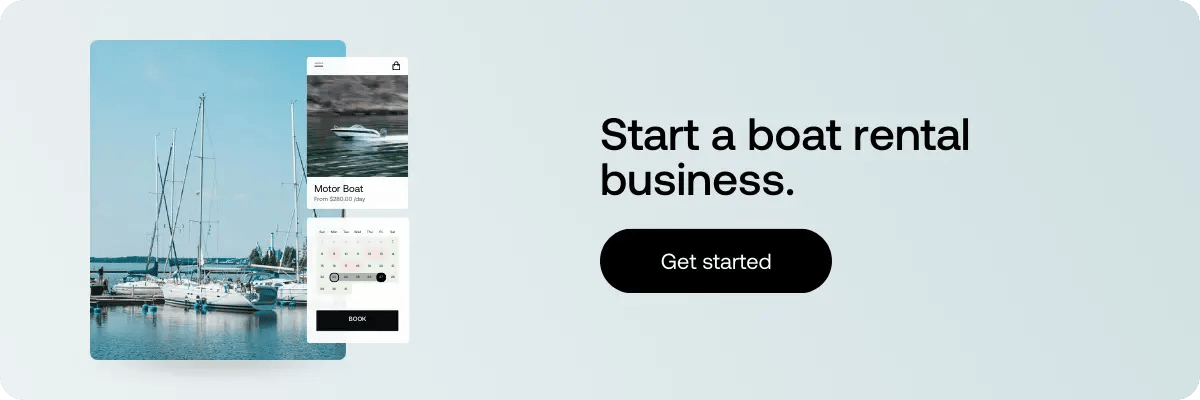
Establish a legal entity for your business
There are a few steps you need to take to open a new business. Renting boats is no different. Here is a rundown of what you must do to make your rental business legit.
Choose a name for your business
Choosing a name is an exciting part of starting a boat rental business. You want something that is memorable and really captures your offering. Consider using boating-related keywords in your name to help capture traffic from search engines.
Once you come up with a few names, check them against the following:
Social media accounts
Website names
State business records
You want something unique to avoid confusion.
Form a business entity
Incorporating the right business structure is an important step that you shouldn't take lightly. The right choice can affect your liability for losses and lawsuits and even how much tax you pay. Some of your options here are:
Sole proprietorship: This is the most common business structure. Primarily, that is because they're simple to set up. However, you are liable for debts and damages — which, in extreme situations, could mean a significant financial blow. Additionally, you'll pay taxes on business and personal income.
General partnership: A general partnership is similar to a sole proprietorship. However, it's the type of business structure many people use when they go into business with another individual. Again, these entities are easy to set up. One thing to consider is that you are liable for your partner's decisions, so choose wisely.
LLC: An LLC, or Limited Liability Company, distinguishes you and the business. As such, your assets are protected in the event of a lawsuit or debts. Additionally, these structures allow for pass-through taxation, meaning you only pay personal income tax for your share of the business.
Overall, an LLC is likely the best option for a boat rental business. Liability protection is essential, especially if you need to protect assets.
Register for taxes
Next up, you'll need to register for state and federal taxes. Depending on your services and location, you must also pay sales taxes. Registering is straightforward through the IRS. But remember:
a) if you set up a sole proprietorship, you can use your social security number
b) if you set up an LLC, you need to get an Employer Identification Number (EIN) from the IRS
Consult the IRS site for further information . If you're starting a boat rental business outside the US, consult your local authorities for guidance.
Set up a business bank account
A business bank account is another essential. Commingling funds is a terrible business idea. It also invalidates the protections afforded by an LLC. Setting up a business bank account helps you get a business credit card and build credit. These facilities can help you with cash flow, which is vital for new businesses in seasonal markets.
Necessary permits and licenses
Ensure you research your local government rules around permits and licenses. For example, you might need a charter captain or watercraft license. Seek out legal advice to ensure that you are compliant before you start offering boat rental services.
Buy a boat rental insurance
Boat rental insurance coverage is essential. While boating is generally safe, there are accidents from time to time. You can't be financially on the hook for them if it's not your fault.
At a minimum, you'll need general liability insurance to protect against injury, medical bills, and property damage. Seek out the advice of a legal professional to ensure you cover your bases.
Inventory management
Your inventory is the lifeblood of your business. Tracking and managing it is crucial for ensuring you get maximum ROI.
Sourcing boats and equipment
As demonstrated above, boats don't come cheap. Scour the second-hand market to find some bargains. Boating knowledge and experience will really pay off here.
Otherwise, depending on the size of your operation, you can save money by buying equipment in bulk.
Tips for maintaining and organizing inventory
Inventory management software is a great way to track your boats and equipment. In an ideal world, you'll have so many boats you can lose track of a few! However, in most cases, that is unlikely. But you'll still need to set up a procedure for making sure you know where your boats are and have records of what equipment is out and who currently holds them.
Marketing and customer acquisition
Depending on your location, you might be able to turn a profit without significant marketing investment. A spot on a marina with heavy foot traffic can be all your boat rental business needs to connect with potential customers. However, if your local market isn't in a big tourist area, you must get creative. At a minimum, you'll need a good website .
Identifying the target market and most effective marketing channels for them
There are many great ways to get the word out about your boat rental business and attract customers.
Search engine optimization (SEO): A strong web presence is essential. Here are some tips for an effective local SEO strategy.
PPC Ads: Google, Meta, and Bing ads are a great way to get immediate results from search engine intent.
Social media: A social media presence is another proven way to connect with an audience. Twitter, Facebook, and Instagram can help you get the word out.
Partnerships: Partnering with local hotels and travel agents can bring a steady source of potential customers. Sure, they'll take a cut, but the extra volume can increase profits.
Boat rental marketplaces: Although bookings through listing pages often involve a sizeable sales commission, listing at least part of your fleet can be worthwhile regarding visibility.
Creating a brand and messaging that resonates with your audience
Boating is enjoyed by every section of society, from the super-rich on their yachts and families looking for an unforgettable holiday experience to humble fishers looking to key out on a lake and catch something to eat. There is a distinct romanticism to the past time that you need to capture with your brand.
Finding the right messaging will depend on your target audience and the type of boats you rent. Glossy brochures and champagne experiences won't move the needle for people who just want to get out there and fish. Similarly, your target audience wants an experience, and your messaging needs to underline the point.
Tips for building a loyal customer base
Loyalty comes through offering great experiences. If you run your business with honesty, integrity, and transparency, you will build meaningful connections that translate into referrals and return customs.
Operations and growth strategies
Managing the day-to-day boat rental operations can be a big job. However, running your business can be plain sailing with the proper setup and procedures.
Best practices for managing daily operations and logistics
As mentioned above, a good website and booking system can help you streamline sales, while inventory management software can help keep track of your goods. Otherwise, scheduled safety checks and maintenance are a must. The safety of your customers is your first priority.
Rental Contracts and Policies
Boating is expensive, and risk is involved whether we like it or not. As such, your contracts and policies should be watertight. Look at standard boating industry rental contracts and consult a legal professional to afford maximum protection via liability waivers.
Security deposits, a fundamental feature in any boat rental software, will add an additional layer of security. They protect you from minor damages and work well, for example, to charge for cancellations that violate your cancellation policy.
Strategies for scaling the business and increasing revenue
While a boat rental service could be your primary source of income, there are plenty of ways to augment your income.
Repairs and maintenance: If you know boats, you could make a handy sideline in repairing and maintaining other people's boats.
Experiences: While you can run a charter boat business as your primary offering, it's also something you can offer on the side. Selling experiences is particularly effective in areas with lots of tourism. Anything from scuba diving and fishing trips to dinner events on a boat will appeal to the right audiences.
Cross-selling: Selling or leasing boating equipment or things like fishing rods, lines, and bait could be an excellent way to boost your rental income if you run fishing charters.
Watersports equipment rentals: Depending on your location, you can also consider renting out other watersport equipment. Kayak and canoe rentals , for example, are a good complement to the boat rental business, provided the conditions for paddling are favorable.
Subscription services: There could also be room to offer access to your boat on a subscription basis . Charging a flat monthly fee could provide predictable income and take advantage of this emerging business model.
A boat rental business offers an excellent opportunity to marry your love of all things nautical with a profitable business. Explore your local boat rental market and try to find an underserved niche.
As the market shifts towards experiences and memorable days out, boat rentals will continue to grow. Additionally, boats could form a legitimate part of the emerging product-as-a-service market, as a few great examples already show.
So, what are you waiting for? Start your boat rental business today.

Article written by Akseli L.
A marketer who gets excited about all things e-commerce. Outside of office hours, you'll most likely find Akseli from the countryside, hiking and shooting landscapes.
Related Articles
Start a rental business: the best rental business ideas to start in 2024.
Oct 19, 2023
Complete guide to starting a car rental business
Oct 12, 2023
The ultimate guide to starting a tool rental business
Aug 14, 2023
Make anything rentable in just a few clicks.
The Circular Commerce Platform.
- Product Catalog
Sales Channels
Store management.
- Order Fulfillment
- Help Center
- API Documentation
- Investor Relations
- Privacy Policy
- Terms & Conditions
© 2024 Twice by Rentle Oy. All rights reserved.
- Inquire Now
- YACHT SEARCH
- Motor Yachts
- Sailing Yachts
- $1 – $25,000 Yachts
- $26,000 – $50,000 Yachts
- $50,000 – $100,000 Yachts
- $101,000 – $200,000 Yachts
- $200,000 – ∞ Yachts
- Turks and Caicos
- Virgin Islands
- Spain & Balearic Islands
- New England
- Tahiti & South Pacific
- More destinations
- Charter Advice
Is Owning a Yacht for Charter Profitable
Is owning a yacht for charter profitable.
Yes, owning a yacht for charter can be profitable but owning a yacht will rarely “pay for itself.” Chartering your yacht presents some unique benefits that can lead to opportunities to make a profit off of your investment in a myriad of ways, including offsetting the cost of owning a yacht , selling your yacht for a profit, and even making a profit (if you’re among the lucky few who have the know-how and the right vessel).
Welcome to the yachting lifestyle.

Offsetting the Costs of Owning a Yacht
Chartering out your personal yacht to offset ownership costs..
One of the greatest benefits of chartering your yacht is making some money from your investment when you’re not using it. It’s a simple way to offset the cost of something that would otherwise sit and cost money. It also gives you more to work with as far as keeping the yacht up to date.
Keep in mind, the service and maintenance of a yacht is expensive but also a primary factor in whether or not your yacht will continue to retain value or even exceed value. Since routine refittings and redesigns are often unavoidable and cost up to 10 percent of your yacht’s value each year, this option offers you the added benefit of maximizing profits as well as your enjoyment each time you decide to set sail on another vacation.
Yacht charter management is a strategy to not only maintain your yacht, but also pay less in the long run when it comes to costs of docking, maintenance, insurance, and other operating expenses for your yacht.
Selling Your Yacht for Profit
Gaining a positive reputation among a network of yacht enthusiasts..
Net profits from a yacht charter are a faraway dream for most, but not impossible for some. Having a company to manage your charter within a flourishing network of yachters will help maximize your return on investment. There are some makes, models, and routes that are much more popular, and it pays to know where to best place your investment from the start, as unlike the trend with most types of cars or boats, not all yachts immediately begin depreciating in value.
Opening your vessel up to a network of yacht enthusiasts also increases the likelihood that your yacht will gain a positive reputation, thus more value among buyers or anyone interested in a yacht charter, making it much more desirable for both charter guests and purchases—that is, if it is a well-managed operation. It’s much more likely a prospect looking to buy your yacht will take it for a spin before purchasing.
Built-for-Profit Vessel
Some yachts are specifically designed to make money..
Having a yacht that is custom-built for charters or, put simply, turning profits, is the best way to go about using a yacht charter solely for investment purposes. It’s not impossible to make money with a yacht charter, but it also takes a good amount of experience and skill to get the job done right.
There are so many dynamic factors that are involved with running a successful yacht for charter operation, and one of the main things to keep in mind is the quality of service you’re providing your customers. This will be a factor in determining how much your vessel is worth to your yacht charter guests.
Owning a yacht for charter is profitable in more ways than one, but getting all the moving parts right requires some know-how and expertise with yacht charters. Remember, you can offset the cost of owning your yacht, sell your yacht for a profit, or design a yacht for money-making purposes—the dream is possible with help from experts.
Be it profit or pleasure, a yacht yields a lifetime of happiness.
Go to Knowledgebase
Destinations
- Amalfi Boat Charter
- Galapagos Luxury Boat
- Thailand Boat
- Cruising The Ionian Islands
- Yacht Rental Maine
- Juneau Yacht Charters
- Yacht in Bora Bora
- Sail Juneau
- Yacht Charter Hvar
Yachts & Yacht Builders
- Beneteau Sailing Yachts
- Hatteras Yachts
- Sunreef Sailing Catamaran
- Mangusta Yacht
- Elysian Yacht Charter
- Ferretti Yachts
- Endless Summer Yacht
- Benetti Yachts
- Fountaine Pajot Catamaran
- Sherakhan Yacht
Luxury Charters
- Luxury Yacht Vacation
- Yacht Charter Santorini
- Sailing Norway
- Miami Fl to Bahamas By Boat
- Tortola Boat Charters
- Corsica Yacht Charter
- Catamaran Charter Corfu
- Yacht Charter Cannes
Set your search criteria to find the perfect yacht
- Alaska Australia Bahamas BVI Caribbean Croatia Florida France Galapagos Greece Indonesia Italy Malaysia Maldives Mexico Mediterranean New England Norway Spain Thailand Tahiti Turkey
- Motor Yacht Catamaran Sailing Boats
- 2 4 6 8 10 12 12+
Search by yacht name
Free and Premium WordPress Plugins & Themes
Table of Contents
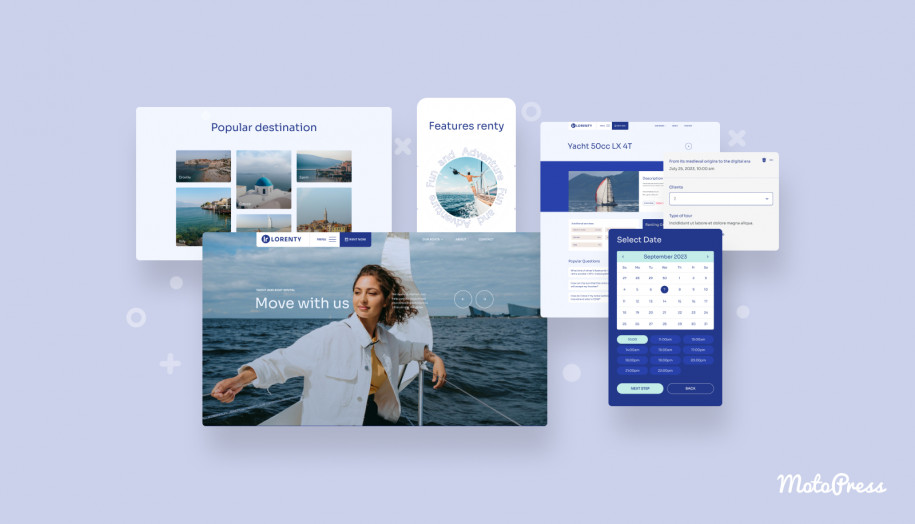
How to Start a Boat Charter Business
Are you wondering how to start a boat charter business? Do you want to avoid any troubles and complexities on the way to success? Or perhaps you are interested in the specifics of the boat rental industry? In any case, today’s article will tell you more about various ideas and ways of starting your own boat charter company, from planning your expenses to developing a suitable website.
Looking for a rental boat design and rental software included? Start with Lorenty !
What is a Boat Charter Business?
Before we dive into the possibilities this business offers, let’s explore what it includes. First of all, there are several types of services allowing you to rent a boat. They include bareboats and skippered charters. The latter offers a full crew or a skipper to handle the rented boat. Bareboat charter, on the contrary, provides just the boat for you to skipper. These services also include yacht charter providing a yacht for your clients.
According to recent research , the boat charter market is becoming more attractive every year to many customers and travel companies. The increasing number of marine tours and constant improvements in customer service make this industry appealing to small and medium travel-oriented businesses looking for new ways of increasing their revenue and new boating business ideas. Moreover, clients may be interested in booking your boats for a variety of reasons, such as:
- Boat rentals are affordable;
- No prior experience is required;
- Suitable for all kinds of travelers;
- Diverse types of available boats;
- A variety of destinations.
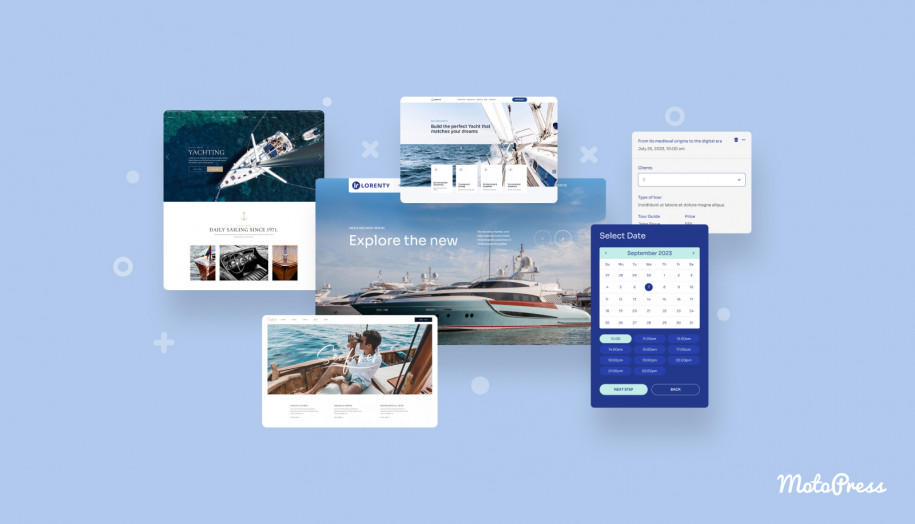
The Ultimate List of Boat Rental WordPress Themes

How to Build an Equipment Rental WordPress Website
Step 1: Choose the Right Boat Charter Business Idea
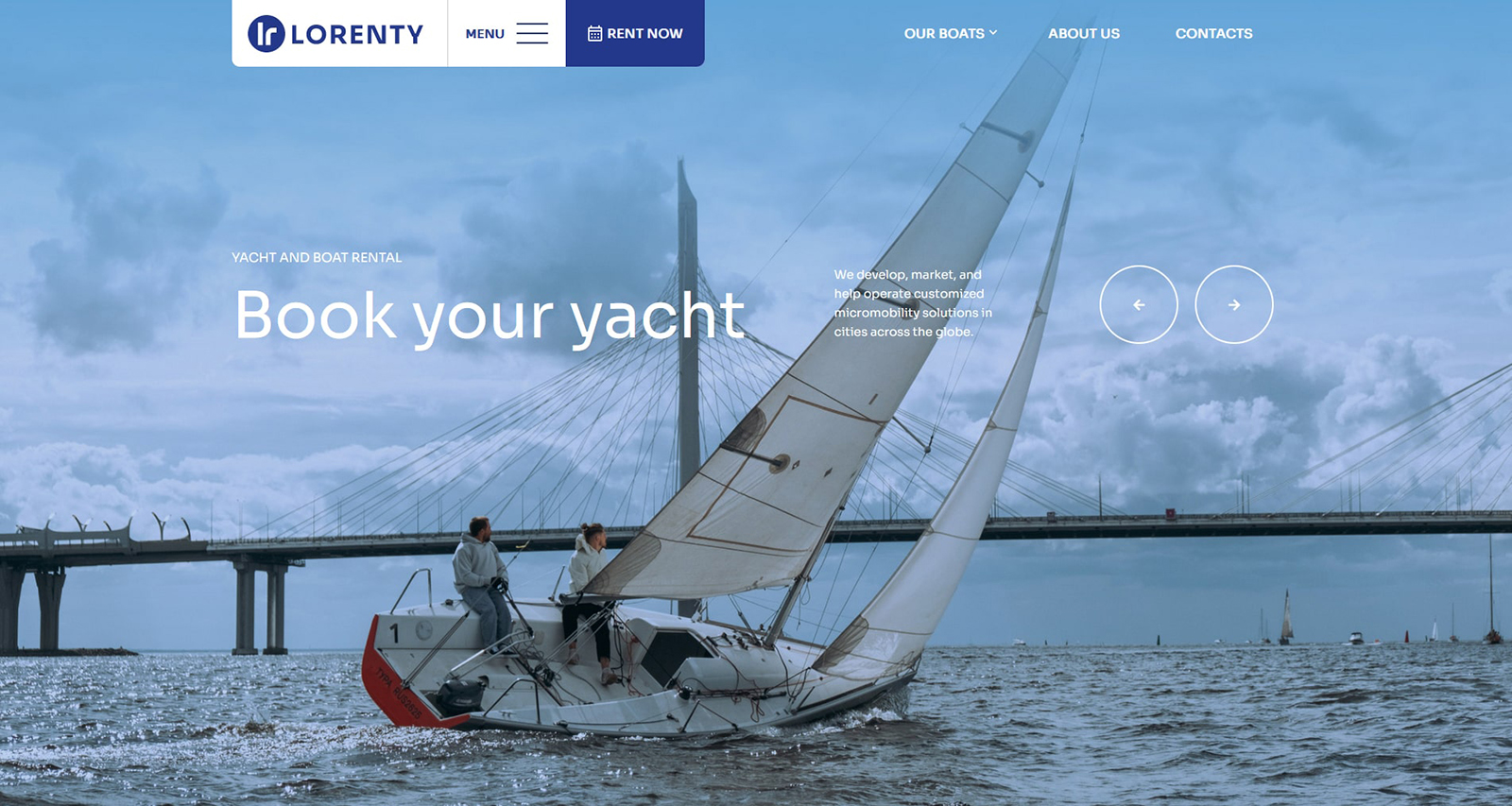
The idea you go for can often shape your business and even define its target audience. This is true for any business. However, with boat rentals, you can open new horizons to people who want to discover the world of sailing. There can be a diverse selection of ideas since boat rentals aren’t usually limited only to touristic purposes. They also include:
- Charter fishing;
- Peer-to-peer boat rentals;
- Family & dinner cruises;
- Rentals for scuba diving & snorkeling activities;
- Marine sightseeing & tours;
- Boat racing tournaments.
Step 2: Consider the Necessary Expenses for Your Boat Rental Company
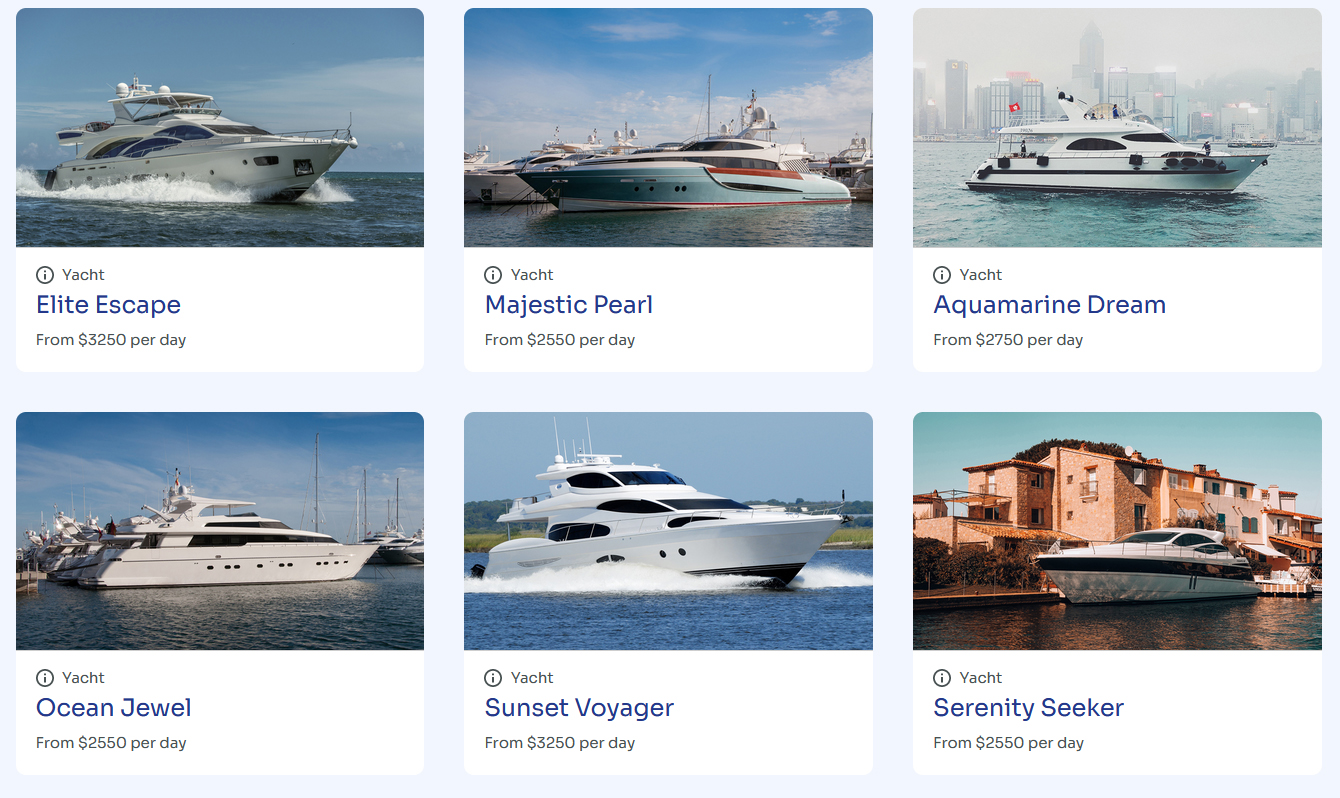
Needless to say, financial expenses play a considerable role in the successful establishment of your boat rental organization. And unfortunately, no business can have just a single type of payment to deal with. This is especially true when you need to know how to start a boat tour business. Here are the most frequent types of expenses your boat charter business may face:
- Boat purchase & insurance (avg. $50K);
- Charter and appointment software & technology (avg. $1.5k);
- Dock rental expenses (avg. $2K);
- Inventory & office equipment (avg. $2K);
- Advertising & marketing (avg. $3K);
- Website design & development (avg. $400);
- Employee salaries & training expenses (avg. $15K).
This is just an essential part of the expenses you may need to deal with as a boat charter business owner. With a diverse amount of expenses in different regions and countries, it is nearly impossible to know the fixed number of spending for your boat rental business in advance. However, you can easily calculate the estimated amount of expenses using the data stated above.
Step 3: Select a Suitable Location to Stay Competitive
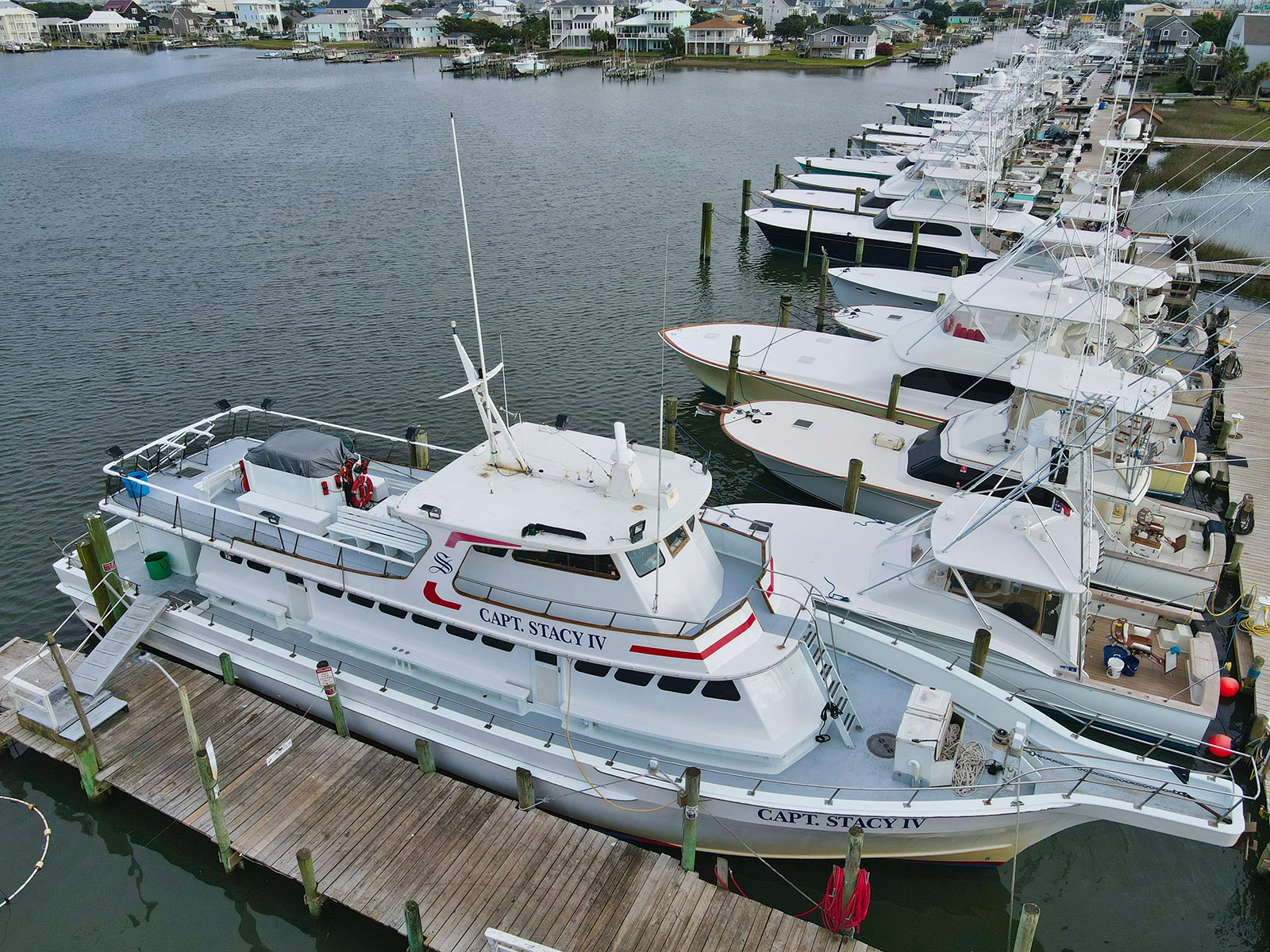
As a business owner, it is necessary to research popular locations and sailing routes before bringing your rental business to the market. There is a variety of possible options here that may help you find out how to start a boat business. Furthermore, the choice of location can impact your business’s future success. This influence can be both positive and negative. That’s why we recommend not to stop at a single option. Instead, you can choose several eye-catching destinations for your boat charter business, especially if you plan to scale your business later. For example, you may consider:
- Oceans & seas;
- Island coasts;
- Lakes, canals, and rivers;
- Locations for water sports & diving.
Step 4: Purchasing the Required Equipment

The most obvious choice for boat rental would be the boats themselves. Still, they make a part of what’s required for this business. You’ll also need to take care of any extra equipment to be rented & used during charters. Additionally, your job as an owner of the boat rental startup would benefit from using your tools for maintenance as well as other equipment, such as:
- Several boats of the appropriate style that fits your business vision;
- Office equipment to complete administrative & routine tasks;
- Equipment & furniture for serving food and drinks on board;
- Life vests, first aid kits, and various safety equipment for your customers and employees;
- Fishing rods, scuba diving equipment , bait, kayaks, and other activity equipment.
Step 5: Obtain the Permits and Licenses for your Boat Charter Business

There are certain differences in various regions concerning licenses required for this type of business. However, there are also general permits that most businesses require. For example:
- Seller’s permit to allow collecting sales tax from your customers;
- Zoning approval to authorize building usage of your boat rental company;
- General business license (required for any business activity);
- Food service license for businesses that serve and deliver food ;
- Sign permit for advertising your business;
- Fire department approval to ensure your company’s office is allowed to install a fire alarm.
Permits differ from licenses in a certain way. For example, the latter are issued for a long term. This means they don’t need to be reviewed too often. Additionally, you may require professional licenses that may vary depending on the location of your business. Let’s take a closer look at them before learning more about how to start a boat rental business.

Websites Made with Appointment Booking Plugin: Customer Showcase
Boating Licenses and Their Differences Worldwide

Licenses for Boat Rentals in the US
In the US, only a few professional licensing documents are required for providing boat rental services. The first is the Captain’s License issued by the US Coast Guard . There are several variations of this document depending on what your business needs:
- Operator of Uninspected Passenger Vessels (up to 6 passengers);
- Master up to 100 Tons on Inland Waters/Great Lakes;
- Master up to 100 Tons on Near-Coastal Waters.
The Master license is a fitting choice for charters with more than six passengers in domestic waters. Moreover, the OUPV license is best for smaller groups of travelers with only up to 6 passengers as stated above. Using any or both of these licenses may be beneficial for learning how to start a party boat business. In some states, such as Florida, an additional saltwater charter license may be required if you want to offer boat fishing tours.
European Boat Charter Certifications
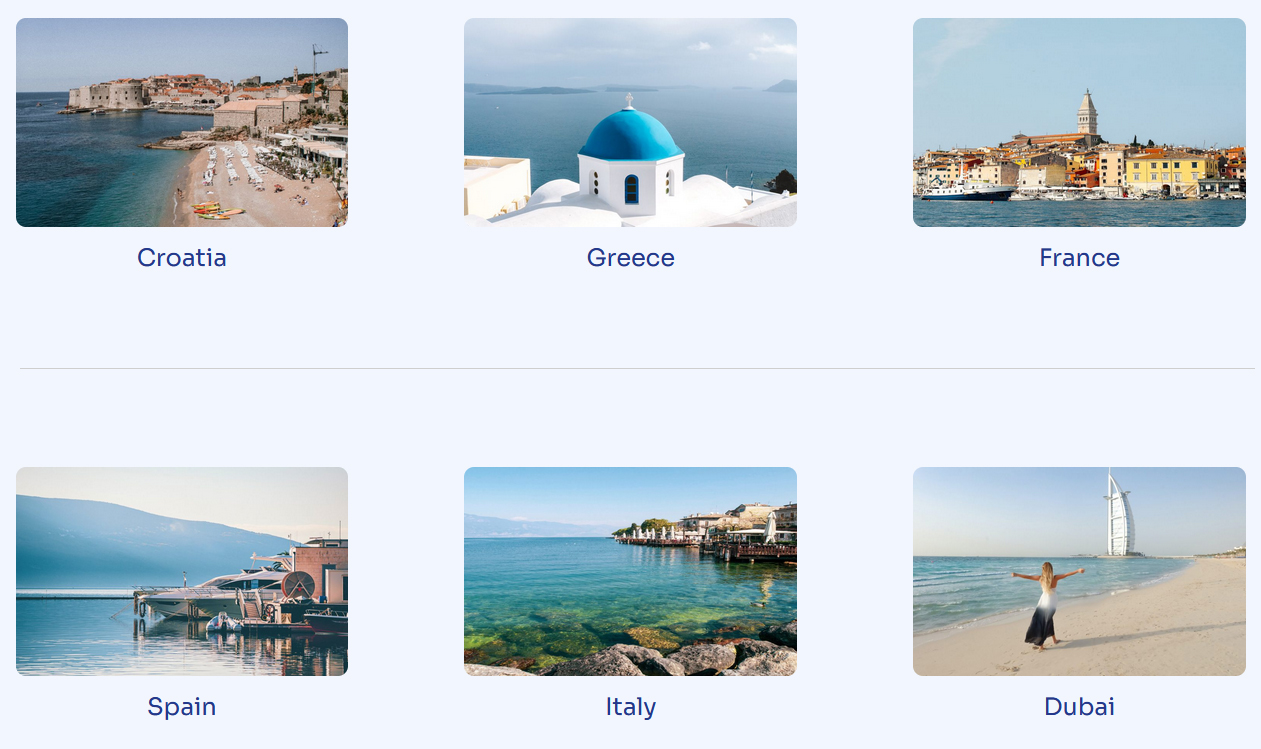
If you need to provide charters in European inland waters, such as lakes and rivers, a special test is required in addition to the ICC license. It is the CEVNI ( Code Europeen Des Voies De Navigation Interieure ) examination. Unlike the previously mentioned license, it is not commonly used in Europe, though most European countries require it.
Crucial Licenses for Boating in Asia

Unfortunately, there isn’t any universal licensing standard in Asia for captains and skippers who are looking for how to start a boat charter business. Still, diverse certifications are similar in different countries. In Japan, for instance, there are several classes of a Boat Operator’s License depending on the weight of vessels:
- First class;
- Second class;
Both First and Second class licenses are suited for vessels of up to 20 gross tons. However, the Second class allows navigating the vessel only within 5 nautical miles of a shore. Additionally, if your boat rental company provides personal watercraft, you’ll also need a PWC license.
Note that all of the previously mentioned certifications require certain training and experience. Luckily, most of the national organizations that offer these licenses also provide courses for everyone interested. So if you are a beginner learning how to start a boat tour business, attending these courses will be helpful.
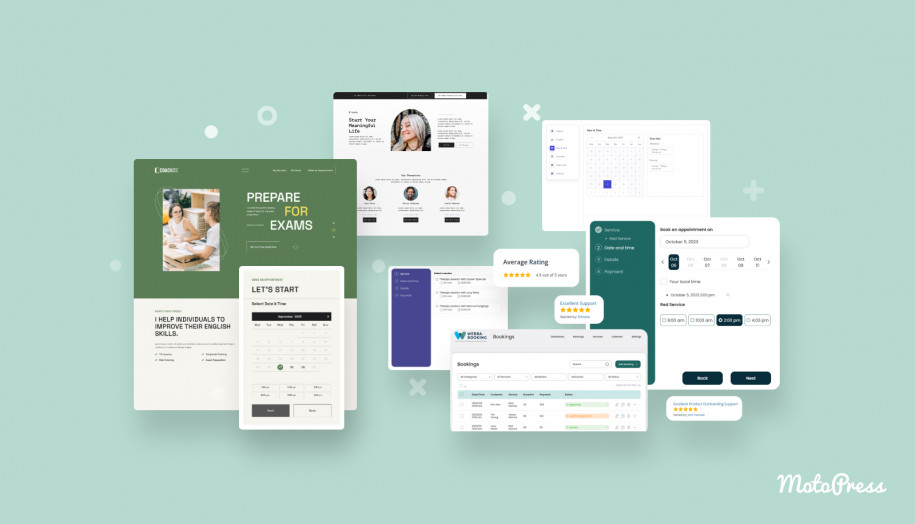
10 Free Booking Activities WordPress Plugins: Best Options
Step 6: Website Development to Advertise Your Boat Charter Business & Drive Bookings
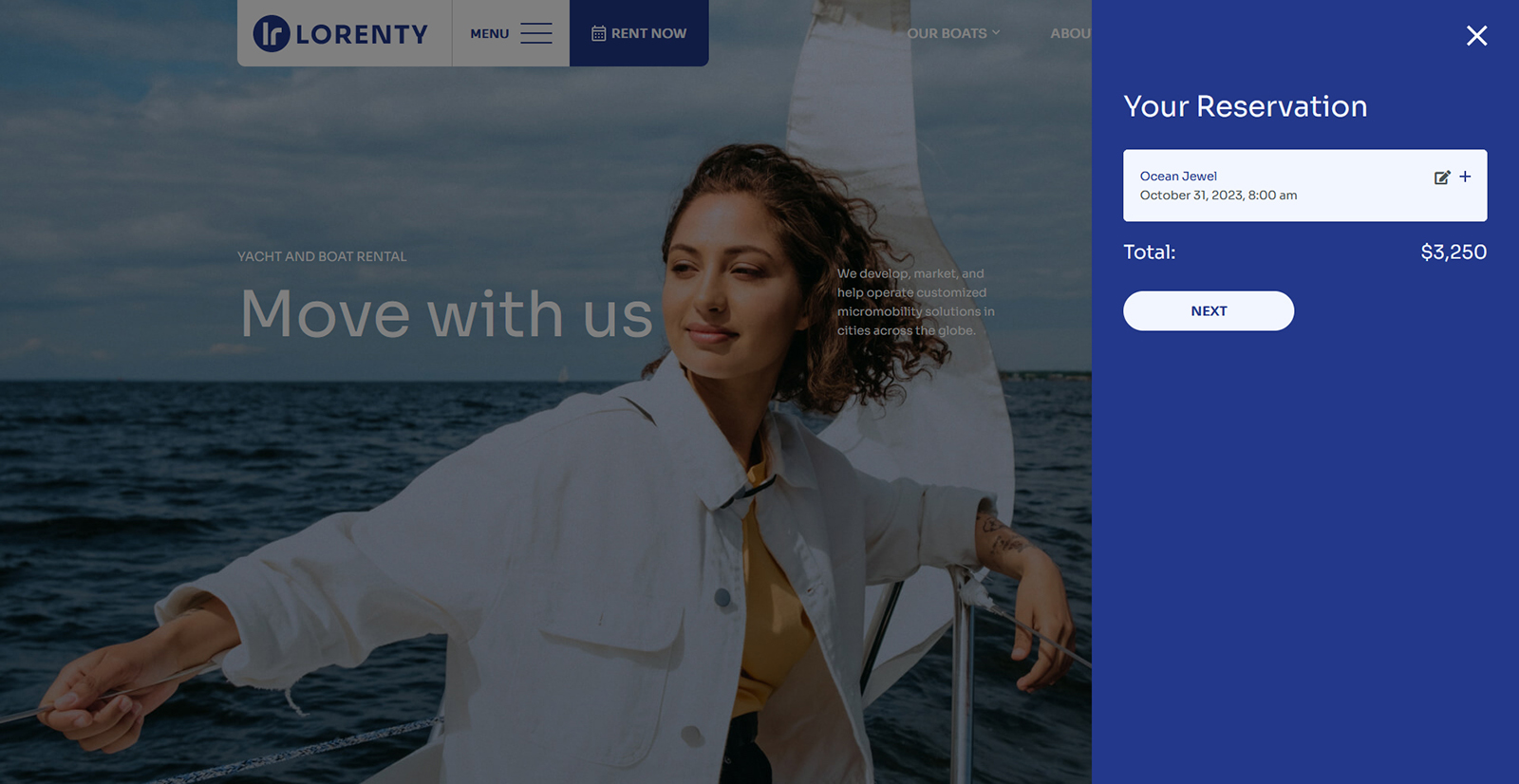
That’s why we recommend choosing ready-made solutions that save you both time and money. A great example is the Lorenty WordPress theme and its boat rental design in particular. It is a pre-designed theme that meets the needs of modern boat charter companies, such as for a party boat business. From choosing the right boat to booking it in a few clicks, Lorenty has everything you may need. Moreover, it has enough space for your content. This is possible thanks to the included Blog and Gallery pages. The theme also provides the following features:
- Clean & responsive design;
- Full-width homepage slider;
- 3 categories for motorboats, yachts, and sailboats;
- 2 pre-built layouts for the Destinations page;
- Pre-integrated boat booking widget for hourly or daily rentals;
- A variety of content elements made for the native WordPress block editor .
The abovementioned advantages are only a small part of what you get with this theme.
Lorenty also offers the built-in Appointment Booking plugin responsible for a smooth and easy-to-use online booking system allowing your clients to charter a boat in just a few clicks after pressing the “Rent Now” button. What’s more, you can set the capacity for every boat tour, enable clients to choose a location if you operate in many, and collect personal information to send automated messages.
Thanks to its rich functionality, this plugin allows you to easily control all charters and upcoming orders.
Besides, you can accept payments via Stripe , PayPal, and other gateways . As a result, you get a fully customizable and feature-rich theme for any of your boating business ideas. Feel free to use it and create something truly unique. It will help you drive your charter business and sales.
Watch a video to see how it works:
The Lorenty rental WordPress theme is available as a standalone product – or if you want to get all the extra functionalities and extensions, a Membership subscription can be a more attractive option. Lorenty is the best option if you are looking how to start boat rental business.
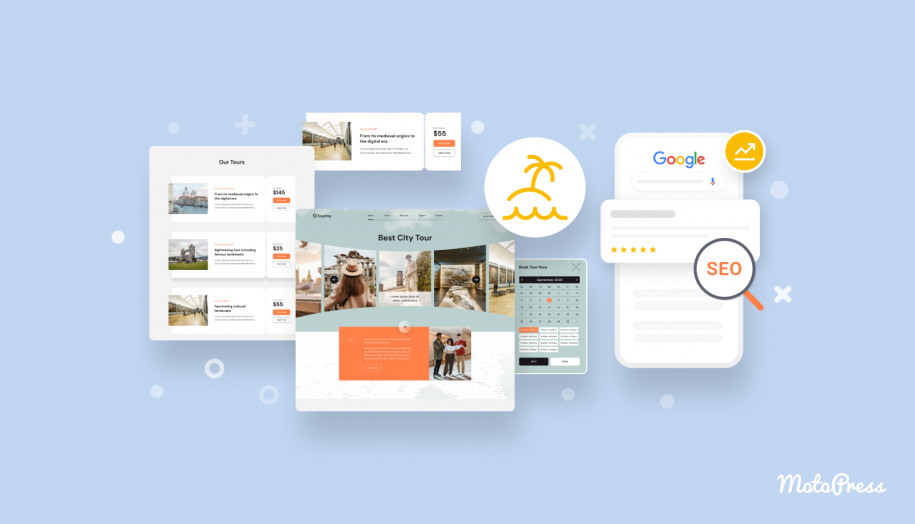
10 SEO Tips for Travel Booking Website
Wrapping Up

- Choosing an idea for your boat charters;
- Planning the expenses for various aspects of your business;
- Selecting a proper location that meets your business plan;
- Purchasing any necessary equipment and tools to keep your boats running and clients satisfied;
- Obtaining any necessary licenses and certifications for both your business and boat charters;
- Advertise your services to a larger amount of potential customers with a newly built website.
With these crucial steps, you’ll be able to lead your boat charter business to success. Besides, with our recommendations, you can easily transform it into a #1 location for fans of boating. Furthermore, a catchy design and abundant functionality of the Lorenty theme will provide outstanding benefits for your boat rental website. As a result, you’ll get a strong basis for your business’s further online development.
What is a charter boat business?
A boat charter business offers boats and yachts for rent. Unlike traditional boat rental services, boat charters provide a wider diversity of options. From bareboat charters to crewed ones, this type of business delivers great options for spending your time on yachts, with or without a professional crew.
How to start a party boat business?
To start a party boat business, it is necessary not just to take care of the boat itself but also some equipment and licenses. The latter include certain business permits as well as specific boat rental licenses depending on your location. Additionally, running such a business requires constant maintenance of your yachts and boats as well as diverse small expenses to ensure your customers get a positive charter experience.
What are the best boat business ideas for 2024?
There are lots of possible ideas for boat charter businesses in 2024. Some of them are the sale and rental of fishing vessels, boat repair & cleaning business, boat storage business, and recreational boat rental service. While some of these options are fitting for a newly established yacht charter business, others are great for an already successful company that is looking for new ways to grow or increase its income.
What is the cost of a boat renting business?
The cost of a boat rental business may vary, especially if we’re talking about renting yachts. On average, operating expenses per single boat may reach up to $5,000. From fuel expenses to marketing costs and various taxes, modern boat rental businesses need to keep track of various costs to ensure the profitability of boat rentals. However, with the right approach to management and marketing, they can always double their income due to constant growth in this business sphere.
What a yacht charter business plan must include?
Any business plan needs to include all important stages of your company’s development. This is also true for yacht charter businesses. From estimated startup costs to calculated profitability and operating expenses, a well-developed business plan outlines what it takes for a boat charter company to become and stay successful in the future.
Was this article helpful?
You have already left your review.
Yegor Yevsyukov
Content Creator
Yegor is an aspiring copywriter who is enthusiastic about modern web technologies. He likes creating informative and easy-to-read articles about the modern web.
Contribution Topics: WordPress themes
Social Networks: Twitter | LinkedIn
Related Posts
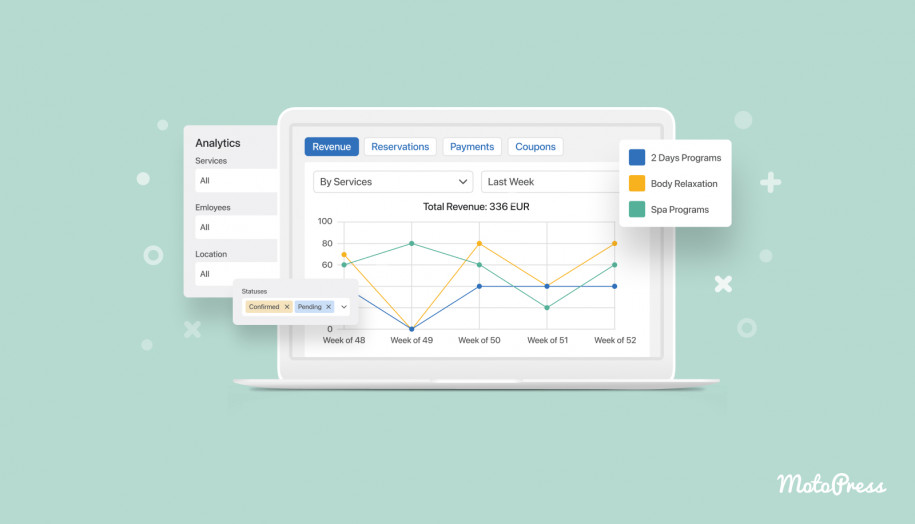
Visualize Your Business Performance with the New Analytics Dashboard (Appointment Booking 1.21.0)
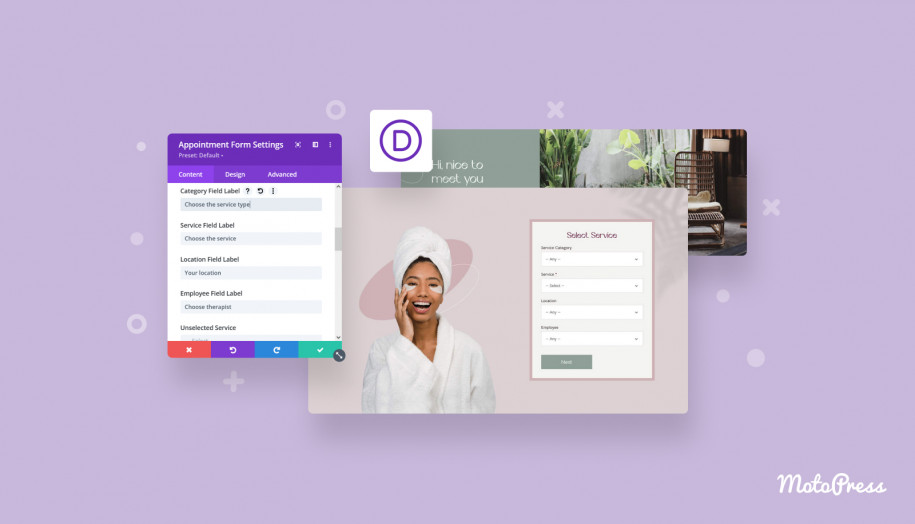
How to Use Divi Booking Plugin for Appointment Scheduling WordPress Website
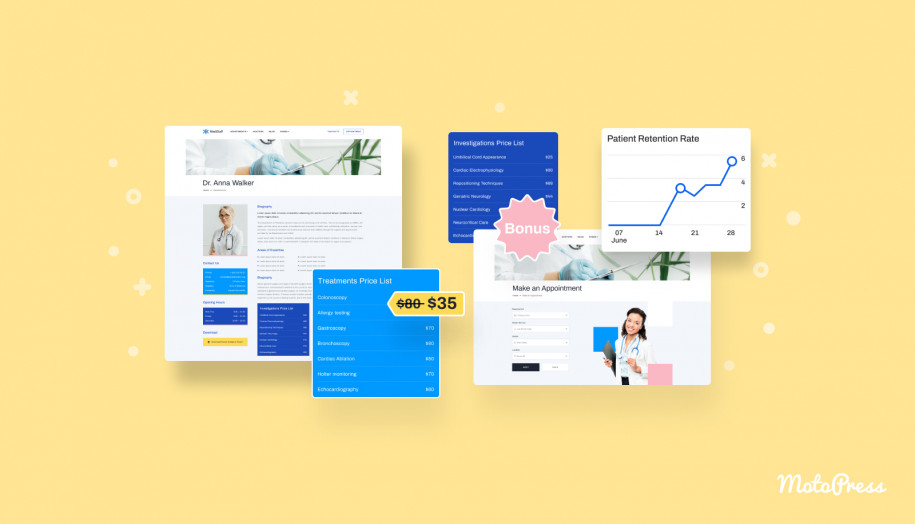
10+ Strategies to Increase Patient Retention Rate
Leave a Reply Cancel reply
Your email address will not be published. Required fields are marked *
Boat As A Business Program
Work with us it doesn’t cost you anything extra.
Catamaran Guru has been at the forefront of developing and operating the “Yacht As A Business”, or for us, “Catamaran As A Business” concept. We have not only advocated it to our clients, but have personally benefitted from this program. We found that most yacht owners use this program as an avenue to acquire the cruising catamaran of their dreams for retirement at a huge discount. Others, like ourselves, use the yacht charter revenue together with the business tax deductions to reduce the costs of owning a very nice yacht that we enjoy now.
Catamaran Business Ownership
Watch our in-depth interview with one of our yacht-as-a-business boat owners. He shares details and his experience about owning a charter yacht and working with Catamaran Guru. He is candid about how the yacht charter business program he chose is working for him and talks openly about the challenges of charter boat ownership, tax advantages, actively managing the business, and his first year revenue and profits.
You, too, can work with Catamaran Guru to discover the pitfalls and get expert advice when you work with us.
What Is A Yacht or Boat Business?
The tax benefits must be carefully planned and documented to make sure that the business activity can withstand scrutiny. There are very specific rules and requirements that need to be complied with in order to meet the standard of actively operating a business for profit and taking tax advantages.
The goal is to structure your boat business in such a way that you have the intent and ability to make a profit! What you CANNOT do, is structure this business with a flawed business plan of “limited charter” and purposely run it at a loss to avoid wear and tear on your boat while offsetting the cost of ownership with business tax deductions. You CANNOT “pretend” to be in business! However this program, when done correctly, offers the least expensive alternative to own a boat!
How to Set up a Boat as a Business
This is a very basic overview of how to set up a boat business and qualify for tax advantages. Before you make the decision to purchase a yacht, consult with us to figure out if this scenario will be suitable for your situation. There are many things to consider. We can discuss all scenarios with you and tailor the program for your personal situation.
- Figure out the size, type, and configuration of boat you plan on buying
- Decide on the destination or location you want to operate from
- Establish a business purpose – education charter, dive and adventure charters, exclusive luxury charter etc.
- Figure out what your expected revenue and expenses will be
- Create a business plan
- Create a business entity like an LLC or other pass-through entity for your business
- Plan your tax strategy. The business tax advantages should directly offset the income from your boat business activity as well as the taxable income from any other active source including your regular job (W2 income). Our business plan highlights the tax advantages available to you through the yacht as a business plan. That way you can adjust your withholding and use the tax advantages to offset cash flow immediately!
- Consider your ultimate goals and exit strategy and plan for it
- Create a marketing plan for your business – website, social media, introduce your boat to charter brokers, attend boat shows
- Charter management – It is best to team up with a management company to help manage your boat and establish a clientele if the boat is in the Caribbean or Bahamas
You can purchase your yacht to your specifications including an owner version layout, set the yacht up as a business, operate it with the help of a charter company anywhere in the world, and have your yacht at least partially or fully paid off at the end of the contract period by applying business revenues and tax advantages.
But do not be fooled. You cannot dump your yacht in a charter fleet for 5 years while collecting a guaranteed monthly income. This is deemed “passive income” and does not qualify you for the section 179 rule and tax advantages. Once your “Yacht As A Business” is set up correctly, you stand to benefit greatly from this concept, but it does require work on your part.
What Is Section 179 Business Tax Deduction?
People seem to think that the Section 179 deduction is some complicated tax code, but really it is not. Essentially, Section 179 of the IRS tax code allows businesses to deduct operating expenses and depreciate the qualifying equipment purchased or financed during the tax year. Typically, when a business buys new equipment, the purchase price can be depreciated using the MACRS scale which is an accelerated depreciation schedule.
The original target of this legislation was much needed tax relief for small businesses – and millions of them are actually taking action and getting real benefits. So, if you are in the market for a new yacht, the Section 179 rule should definitely be a part of your yacht-buying strategy.
According to this law, when used as part of a business, you can legitimately divert some of the taxes that you’re already paying into the sailing vessel. This in turn, creates equity in your new yacht. Therefore, buying a new yacht and placing it in charter service as a business, makes total sense to reduce cost of ownership and turn tax advantages into an investment. It is vitally important the business is set up correctly and the operation is structured to qualify for the tax benefits and remain in compliance going forward.
Understanding Section 179 Business Tax Deduction
*The U.S. Congress has halted the Section 179 roller coaster of the past recent years by making the Tax Deduction limit permanent. The limit was raised to $1,160,000. This is good news for yacht businesses, as the owners and their tax advisers now know early in the year that the deduction will be there for them and they can plan accordingly.
Section 179 Tax Deduction Limits for year 2023
Deduction Limit: The maximum deduction for equipment purchased/financed and placed in service by 12/31/2023 is $1,160,000. Businesses can deduct the full cost of equipment as an expense.
Limit On Equipment Purchases: Business owners may spend up to $4,050,000 on equipment, new or used, and claim the full Section 179 deduction. Beyond that amount, the deduction is reduced dollar-for-dollar. This stipulation is to ensure that small businesses, not large corporations benefit from the deduction. For 2022, this spending cap for equipment is $2,700,000.
Example Of Section 179 At Work
To take advantage of the 2023 deductions, you must purchase or finance the equipment and place into service by 12/31/2023. Form 4562 covers this deduction
Equipment Purchases:
First Year Write-Off: ($1,160,00 max 2023)
80% Bonus Depreciation Deduction:
Normal First Year Depreciation: (20% in each of 5 yrs on remaining amount)
Total First Year Deduction: ($1,160,000 + $32,000 + 0)
Cash Savings: ($1,192,000 x 35% tax rate)
$417,200
Lowered Cost Of Equipment After Tax Savings
*The above information is an overall, “simplified” view of the Section 179 Deduction. For more details on limits and qualifying equipment, please contact us directly about the variety of yacht ownership programs we can help you evaluate.
Bonus Depreciation from 2023
Bonus depreciation comes into play if the Section 179 limit has been reached. The 100-percent depreciation will stay in effect until January 1, 2023, when the first-year bonus depreciation deduction will decrease as follows:
- 80% for property placed in service during 2023
- 60% for property placed in service during 2024
- 40% for property placed in service during 2025
- 20% for property placed in service during 2026
TWO YACHT OWNERS IN THESE PROGRAMS, GIVE THEIR PERSPECTIVES
Co-management business program with guaranteed income, yacht as a business program, crewed yacht charter opportunities.
- Recover taxes paid in past years to offset the cost of the yacht purchase. Learn more about Yacht as a Business & Tax Advantages .
- Cover all the costs of ownership including the mortgage payments with income and tax advantages – the boat pays for itself!
- Enhance your lifestyle with owner use of the vessel and enjoy the pride of ownership
- All models available in this program
- Virgin Islands, Bahamas and USA locations
- “Owner Operator” option available for those who want to make a career change and be involved full time
Learn more about our Crewed Yacht Programs >> Interested? Give us a call 1-804-815-5054 or email us.
WORK WITH OUR YACHT OWNERSHIP SPECIALISTS
How can catamaran guru’s team help you.
If you are a US tax payer, enjoy sailing and yachting, and want to own your own yacht at a substantially reduced cost, this program will work for you. Catamaran Guru’s team will work with you and your tax professional to qualify your “Yacht Business” to legitimately take advantage of tax deductions available to you. Although the acquisition of a new yacht may be an effective business tool to take advantage of these tax rules, the tax benefits must be carefully planned to make sure that it can withstand scrutiny.
- We guid e you on your selection of the yacht to purchase and advise you through the buying process
- This business yacht ownership program is designed for flexibility to enable the owner to choose various yacht models and layouts including owner suite in some cases, upgraded equipment, multiple worldwide locations and flexible owner use. We will guide you to make a good choice to suit your individual goals.
- Once you’ve decided on a yacht to purchase, we will help you set up your “Yacht As A Business” and structure it to comply with IRS tax rules. This will ensure that all allowable business tax deductions, advantages and yacht charter income, will largely cover the cost of boat ownership.
- We will help you find a placement with a suitable charter management company. We have extensive experience in the charter management arena and will make sure that you and your charter company is compatible. In our experience, yacht charter management together with active participation by the owner is a great way to reduce the cost of yacht ownership. It is the perfect opportunity for anyone looking to own a new yacht at a substantially lower cost!
When You Work With Our Team
- You get the most complete yacht ownership program available, including a 5-year projection, tax schedule, and business plan
- We show you how to set up your yacht charter business to be in compliance with current tax laws.
- We guide you on how to qualify for tax advantages that can offset your ordinary income.
- We familiarize you with the current tax laws and how they apply to your particular situation.
- We discuss and plan your exit strategy
- We guide you if you choose to upgrade to a larger yacht within this structure
- We show you how to make your yacht be part of your retirement plan.
- We help you understand the difference between a Charter Company Guaranteed Income Program (passive) and Yacht As A Business program (active participation)
We Work With Top Catamaran Brands and First-Tier Charter Companies
- Catamaran Brands: Catamaran Guru can offer you access to some of the top brands of yachts in the world like Fountaine Pajot , Lagoon , Bali Catamarans , Xquisite Yachts , and others.
- Charter Companies: We offer the added luxury of making it possible for you to place your new yacht into service at charter bases in multiple locations around the world through affiliations with reputable charter companies like Catamaran Charters , Dream Caribbean Blue , Virgin Islands Yacht Charters , Cruise Abaco and others
The Catamaran Guru is a brand-independent yacht brokerage working with various charter management companies and yacht brands to bring our boat-buying clients the programs and boat models that are best for their situation and goals. Catamaran Guru is no longer affiliated with Dream Yacht (DYC).
Contact Us For a Consultation
There is a lot of information in these pages as we tried to make it as comprehensive as possible. But there is a lot to absorb so you may need someone to help you sort through it all. Plus there are always questions that deal specifically with your personal situation.
Contact us for a comprehensive consultation. Our services come FREE if we represent you during your yacht-buying process.
CALL 804.815.5054
BUSINESS YACHT OWNERSHIP REFERENCE MATERIALS
Faq & common misconceptions about yacht ownership.
We find that explaining what this program entails is easier for yacht owners, their accountants, and other financial advisors, if some common misconceptions and questions are addressed. This list gives a clear and uncomplicated picture of the program. Read more about yacht ownership facts and fiction .
How To Set Up A Yacht Business To Comply With Tax Laws
There are many things to consider and we give you a basic overview of how to qualify for tax advantages. Before you make the decision to purchase a yacht, consult with us to figure out if this scenario will be suitable for your situation. We will advise you on what size yacht you qualify for and what charter company will work for you in which location. We can discuss all scenarios with you and tailor the program for you and your family.
- How to set up your Yacht Business
- How To Operate A Legitimate Yacht Charter Business
- Track Your Business Activity with the Harvest App on Your Mobile
Section 179 Deduction Explained
This article explains exactly how section 179 works and how it affects boat owners. Read more about Section 179 deductions for boat businesses .
Compliance Issues For A Legitimate Yacht Charter Business
While there are many skeptics and detractors to operating a yacht as a small business, we know that if it is done correctly, with a sincere intent to create a small business, which will either be profitable in the short term or in the long term through a paid-off asset acquisition, it is the correct business strategy for a yacht owner to reduce the cost of ownership. Read more about overcoming yacht charter business compliance issues .
Charter Boat Owners Win IRS Challenges
The number one objection from CPAs is that our business yacht management program is a passive activity and will not be deemed active participation. They contend that it can be very difficult for a boat owner to prove active participation in a boat business and qualify for small business and section 179 tax deductions. However, in 2015, a couple won their case in Tax Court on passive vs. active participation. Their success validates the model that Catamaran Guru uses when advising boat buyers regarding charter boat ownership.
- Read more about the IRS case and how this charter boat owners won
- And for another court case discussing material participation in a boat business, see Kline vs IRS .
Section 179 Tax Advantages & Related Court Cases
We have seen many yacht businesses operated in charter programs very successfully around the world as small businesses by our clients. Offsetting the cost of ownership is a sound business strategy especially in the yacht charter business. However, there are many regulatory challenges to a yacht charter program, including complex tax laws, IRS regulations, active participation rules, profit motive and other business considerations. The Court cases below illustrate the tax implications of yacht charter operations. Read about boat business tax advantages .
BUSINESS YACHT OWNERSHIP SUCCESS STORIES
- sailluna.com : Luna is a Lagoon 450 SporTop that operates in the Caribbean as a crewed charter yachts in the BVI.crewed yacht. Nim and Fabiola are one of our great success stories and is one of the most popular
- catamaranguru.com : Our own previously owned catamaran, Zuri , a Lagoon 450S, was in the program in the U.S. mostly doing instructional charters and exhibits at boat shows and demonstrations for prospective buyers.
- sailallende.com : This Fountaine Pajot Helia 44 is in Crewed Yacht charter in the BVI. This young couple is making big waves in the industry with exceptional service and have become leaders amongst their fellow crewed boat crews. Kristiann and Graham are also heads the CCCYA, the only industry representative specifically for term charter yacht owners, owner-operators and yacht owners’ representatives in the Caribbean.
- BigNauticharter.com : Big Nauti is a Bali 5.4 that operates luxury crewed charters in the BVI. It is one of the most fun boats to charter!
- Belle Vie : Belle Vie is a Bali 4.8 and broke all records in her first year of charter in 2020. Owners Greg and Christina, operates the boat as a business in crewed charter and is doing extremely well.
- Dream Caribbean Blue : Greg and Christina (owners of Belle Vie ) have done so well that we have invited them to become part of this community becoming one of our boutique yacht charter management company partners . They serve a clearinghouse for many of our boats in the USVI and offer a complete and comprehensive yacht management service. They manage many of our 44ft to 54ft crewed boats in business. Check them out!
- ftmcharters.com : The Voyage 500 and her crew/owners is one of the most successful crewed boats in the BVI with numerous awards for excellence!
- irishroversailing.com: UPDATE, RETIRED. This Fountaine Pajot Lipari 41 operated between Annapolis in the summer and the Bahamas in the winter as a very successful bareboat business. They have completed their five years in the program and is now operating a sailing school out of New Jersey.
Boat Business Ownership Resources
- Section179.org
- Section 179 Tax Deduction Calculator
- Form 4562 covers this deduction
- Overview of Tax Relief Act Of 2010
- Full Text of Tax Relief Act Of 2010, H.R. 6467
- Checklist for Vessel Purchase
- Active vs. Passive Activity
- Section 168
- Boat as a Second Home
*This information is general in nature and purchasers are encouraged to seek experienced legal counsel in yacht acquisition planning and implementation. Catamaran Guru is not a licensed tax attorney or CPA and is not qualified to give legal advice, but we can put you in touch with experts who are.
testimonials
More charter management tips, charter boat owners win irs challenge.
Charter Boat Owners Win IRS Challenge The number one objection from CPAs is that our business yacht management program is a passive activity and will
Yacht Charter Management Programs Explained
Placing a yacht into charter management is a good way to reduce the cost of the boat and also offset the cost of ownership. There
Interview with Catamaran Owner in Business Program
https://www.youtube.com/watch?v=AIQJVebHPIkWe have received so many questions about operating a yacht as a business, so we interviewed one of our catamaran owners in this program currently.
We're Ready, Let's Talk.
For more than 30 years, we have been a part of the catamaran community and created Catamaran Guru™ to encourage and educate all the aspiring sailing out there. We understand the dream of traveling the world by catamaran and created a one-stop-shop to make that dream a reality for you.
- Stephen & Estelle
- Testimonials
Get Started
- Yacht Sales
- Used Yachts
- Charter Management
- Boat as Business Programs
- Seminars & Events

Charter Boat Business Plan Template
Written by Dave Lavinsky

Charter Boat Business Plan
Over the past 20+ years, we have helped over 500 entrepreneurs and business owners create business plans to start and grow their charter boat companies. We have the experience, resources, and knowledge to help you create a great business plan.
In this article, you will learn some background information on why business planning is important. Then, you will learn how to write a charter boat business plan step-by-step so you can create your plan today.
Download our Ultimate Business Plan Template here >
What Is a Business Plan?
A business plan provides a snapshot of your charter boat business as it stands today, and lays out your growth plan for the next five years. It explains your business goals and your strategies for reaching them. It also includes market research to support your plans.
Why You Need a Business Plan
If you’re looking to start a charter boat business or grow your existing charter boat company, you need a business plan. A business plan will help you raise funding, if needed, and plan out the growth of your charter boat business to improve your chances of success. Your charter boat business plan is a living document that should be updated annually as your company grows and changes.
Sources of Funding for Charter Boat Businesses
With regards to funding, the main sources of funding for a charter boat business are personal savings, credit cards, bank loans, and angel investors. When it comes to bank loans, banks will want to review your business plan and gain confidence that you will be able to repay your loan and interest. To acquire this confidence, the loan officer will not only want to ensure that your financials are reasonable, but they will also want to see a professional plan. Such a plan will give them the confidence that you can successfully and professionally operate a business. Personal savings and bank loans are the most common funding paths for charter boat companies.
Finish Your Business Plan Today!
How to write a business plan for a charter boat business.
If you want to start a charter boat business or expand your current one, you need a business plan. The guide below details the necessary information for how to write each essential component of your charter boat business plan.
Executive Summary
Your executive summary provides an introduction to your business plan, but it is normally the last section you write because it provides a summary of each key section of your plan.
The goal of your executive summary is to quickly engage the reader. Explain to them the kind of charter boat business you are running and the status. For example, are you a startup, do you have a charter boat business that you would like to grow, or are you operating a chain of charter boat businesses?
Next, provide an overview of each of the subsequent sections of your plan.
- Give a brief overview of the charter boat industry.
- Discuss the type of charter boat business you are operating.
- Detail your direct competitors. Give an overview of your target customers.
- Provide a snapshot of your marketing strategy. Identify the key members of your team.
- Offer an overview of your financial plan.
Company Overview
In your company overview, you will detail the type of charter boat business you are operating.
For example, you might specialize in one of the following types of charter boat businesses:
- Sightseeing charter: This type of charter business specializes in taking people out on local waterways and providing a guided tour. This type of charter business works well in tourist destinations.
- Special event charter: This type of charter business provides charter services for special events such as weddings, corporate outings, and birthday parties.
- Whale watching charter: This type of charter business takes people out to see whales. Tour guides typically provide information about the types of ocean life that may be viewed.
- Fishing charter: This type of charter business specializes in taking people out fishing. Fishing lessons are often included.
- Yacht charter: A yacht charter is the rental of a private yacht, typically with a crew, for a specified duration to explore coastal or offshore destinations, providing a luxurious and customizable maritime experience.
In addition to explaining the type of charter boat business you will operate, the company overview needs to provide background on the business.
Include answers to questions such as:
- When and why did you start the business?
- What milestones have you achieved to date? Milestones could include the number of customers served, the number of charters completed, or reaching $X amount in revenue, etc.
- Your legal business Are you incorporated as an S-Corp? An LLC? A sole proprietorship? Explain your legal structure here.
Industry Analysis
In your industry or market analysis, you need to provide an overview of the charter boat industry.
While this may seem unnecessary, it serves multiple purposes.
First, researching the charter boat industry educates you. It helps you understand the market in which you are operating.
Secondly, market research can improve your marketing strategy, particularly if your analysis identifies market trends.
The third reason is to prove to readers that you are an expert in your industry. By conducting the research and presenting it in your plan, you achieve just that.
The following questions should be answered in the industry analysis section of your charter boat business plan:
- How big is the charter boat industry (in dollars)?
- Is the market declining or increasing?
- Who are the key competitors in the market?
- Who are the key suppliers in the market?
- What trends are affecting the industry?
- What is the industry’s growth forecast over the next 5 – 10 years?
- What is the relevant market size? That is, how big is the potential target market for your charter boat business? You can extrapolate such a figure by assessing the size of the market in the entire country and then applying that figure to your local population.
Customer Analysis
The customer analysis section of your charter boat business plan must detail the customers you serve and/or expect to serve.
The following are examples of customer segments: individuals, schools, families, and corporations.
As you can imagine, the customer segment(s) you choose will have a great impact on the type of charter boat business you operate. Clearly, individuals would respond to different marketing promotions than corporations, for example.
Try to break out your target customers in terms of their demographic and psychographic profiles. With regards to demographics, including a discussion of the ages, genders, locations, and income levels of the potential customers you seek to serve.
Psychographic profiles explain the wants and needs of your target customers. The more you can recognize and define these needs, the better you will do in attracting and retaining your customers.
Finish Your Charter Boat Business Plan in 1 Day!
Don’t you wish there was a faster, easier way to finish your business plan?
With Growthink’s Ultimate Business Plan Template you can finish your plan in just 8 hours or less!
Competitive Analysis
Your competitive analysis should identify the indirect and direct competitors your business faces and then focus on the latter.
Direct competitors are other charter boat businesses.
Indirect competitors are other options that customers have to purchase from that aren’t directly competing with your product or service. This includes other types of guided tours or recreation businesses as well as boat retailers. You need to mention such competition as well.
For each such competitor, provide an overview of their business and document their strengths and weaknesses. Unless you once worked at your competitors’ businesses, it will be impossible to know everything about them. But you should be able to find out key things about them such as
- What types of customers do they serve?
- What type of charter boat business are they?
- What is their pricing (premium, low, etc.)?
- What are they good at?
- What are their weaknesses?
With regards to the last two questions, think about your answers from the customers’ perspective. And don’t be afraid to ask your competitors’ customers what they like most and least about them.
The final part of your competitive analysis section is to document your areas of competitive advantage. For example:
- Will make it easier for customers to acquire your product or service?
- Will you offer products or services that your competition doesn’t?
- Will you provide better customer service?
- Will you offer better pricing?
Think about ways you will outperform your competition and document them in this section of your plan.
Marketing Plan
Traditionally, a marketing plan includes the four P’s: Product, Price, Place, and Promotion. For a charter boat business plan, your marketing strategy should include the following:
Product : In the product section, you should reiterate the type of charter boat company that you documented in your company overview. Then, detail the specific products or services you will be offering. For example, will you provide whale watching, fishing lessons, wedding services, or diving lessons?
Price : Document the prices you will offer and how they compare to your competitors. Essentially in the product and price sub-sections of your plan, you are presenting the products and/or services you offer and their prices.
Place : Place refers to the site of your charter boat company. Document where your company is situated and mention how the site will impact your success. For example, is your charter boat business located in a busy retail district, a business district, or a standalone shop? Discuss how your site might be the ideal location for your customers.
Promotions : The final part of your charter boat marketing plan is where you will document how you will drive potential customers to your location(s). The following are some promotional methods you might consider:
- Advertise in local papers, radio stations and/or magazines
- Reach out to websites
- Distribute flyers
- Engage in email marketing
- Advertise on social media platforms
- Improve the SEO (search engine optimization) on your website for targeted keywords
Operations Plan
While the earlier sections of your business plan explained your goals, your operations plan describes how you will meet them. Your operations plan should have two distinct sections as follows.
Everyday short-term processes include all of the tasks involved in running your charter boat business, including answering calls, planning and providing tours, billing and collecting payments from customers, etc.
Long-term goals are the milestones you hope to achieve. These could include the dates when you expect to book your Xth charter, or when you hope to reach $X in revenue. It could also be when you expect to expand your charter boat business to a new city.
Management Team
To demonstrate your charter boat business’ potential to succeed, a strong management team is essential. Highlight your key players’ backgrounds, emphasizing those skills and experiences that prove their ability to grow a company.
Ideally, you and/or your team members have direct experience in managing charter boat businesses. If so, highlight this experience and expertise. But also highlight any experience that you think will help your business succeed.
If your team is lacking, consider assembling an advisory board. An advisory board would include 2 to 8 individuals who would act as mentors to your business. They would help answer questions and provide strategic guidance. If needed, look for advisory board members with experience in managing a charter boat business or running a small whale watching operation.
Financial Plan
Your financial plan should include your 5-year financial statement broken out both monthly or quarterly for the first year and then annually. Your financial statements include your income statement, balance sheet, and cash flow statements.
Income Statement
An income statement is more commonly called a Profit and Loss statement or P&L. It shows your revenue and then subtracts your costs to show whether you turned a profit or not.
In developing your income statement, you need to devise assumptions. For example, will you have 5 boats in your fleet, and will you offer 3 tours per boat/per day? And will sales grow by 2% or 10% per year? As you can imagine, your choice of assumptions will greatly impact the financial forecasts for your business. As much as possible, conduct research to try to root your assumptions in reality.
Balance Sheets
Balance sheets show your assets and liabilities. While balance sheets can include much information, try to simplify them to the key items you need to know about. For instance, if you spend $50,000 on building out your charter boat business, this will not give you immediate profits. Rather it is an asset that will hopefully help you generate profits for years to come. Likewise, if a lender writes you a check for $50,000, you don’t need to pay it back immediately. Rather, that is a liability you will pay back over time.
Cash Flow Statement
Your cash flow statement will help determine how much money you need to start or grow your business, and ensure you never run out of money. What most entrepreneurs and business owners don’t realize is that you can turn a profit but run out of money and go bankrupt.
When creating your Income Statement and Balance Sheets be sure to include several of the key costs needed in starting or growing a charter boat business:
- Cost of equipment and supplies
- Payroll or salaries paid to staff
- Business insurance
- Other start-up expenses (if you’re a new business) like legal expenses, permits, computer software, and equipment
Attach your full financial projections in the appendix of your plan along with any supporting documents that make your plan more compelling. For example, you might include your charter permit, or testimonials from happy customers.
Writing a business plan for your charter boat business is a worthwhile endeavor. If you follow the template above, you will be well-prepared to create a fishing charter business plan, yacht charter business plan or a boat charter business plan. You will understand the charter boat industry, your competition, and your customers. You will develop a marketing strategy and will understand what it takes to launch and grow a successful charter boat business.
Charter Boat Business Plan Template FAQs
What is the easiest way to complete my charter boat business plan.
Growthink's Ultimate Business Plan Template allows you to quickly and easily write your charter boat business plan.
How Do You Start a Charter Boat Business?
Starting a charter boat business is easy with these 14 steps:
- Choose the Name for Your Charter Boat Business
- Create Your Charter Boat Business Plan
- Choose the Legal Structure for Your Charter Boat Business
- Secure Startup Funding for Charter Boat Business (If Needed)
- Secure a Location for Your Business
- Register Your Charter Boat Business with the IRS
- Open a Business Bank Account
- Get a Business Credit Card
- Get the Required Business Licenses and Permits
- Get Business Insurance for Your Charter Boat Business
- Buy or Lease the Right Charter Boat Business Equipment
- Develop Your Charter Boat Business Marketing Materials
- Purchase and Setup the Software Needed to Run Your Charter Boat Business
- Open for Business
Don’t you wish there was a faster, easier way to finish your Charter Boat business plan?
OR, Let Us Develop Your Plan For You
Since 1999, Growthink has developed business plans for thousands of companies who have gone on to achieve tremendous success. Click here to see how a Growthink business plan consultant can create your business plan for you.
Other Helpful Business Plan Articles & Templates

I make $19,800 a month in revenue from 'Airbnb for boats' in Miami. Here's how I built my business.
- Mylène Garot loved being on the water and wanted to start a boat-rental business in Miami.
- Garot used her savings to purchase a boat and started renting it on Boatsetter, an Airbnb for boats.
- Impressed by the income potential, Garot scaled her fleet to five boats in two years.

This as-told-to essay is based on a conversation with Mylène Garot, a 32-year-old business owner about renting out her boats. She is originally from France but now lives in Miami. It has been edited for length and clarity. Insider has verified Garot's Boatsetter income.
I have a master's degree in business development from a university in France. In 2015, I immigrated to the United States and settled in Florida.
I got a job working for Aquajet Miami, a water-sports company. I started as an intern and worked my way up to become marketing director. It was a small five-person company and I helped secure some large accounts.
I was recruited by a Miami real-estate company in 2018 and worked there for two years.
In 2020, I was researching ways to make money. I was Googling platforms similar to Airbnb and found Boatsetter , where boat owners can list their boats for people to rent.
My husband and I thought it could be a good income source. I had experience in water sports and wanted to start a boat-rental business. My husband was a boat captain and managed property — it seemed pretty perfect.
In March 2020, I quit my job in real estate to set up our boat-rental company
I used my savings and purchased a Tahoe 1950 that cost $25,000. We listed on Boatsetter in May 2020 and got bookings within the first week.
To list on Boatsetter, you need a boat with commercial insurance of at least $1 million, which costs $350 a month.
Boatsetter offers insurance underwritten by GEICO. Boat owners can expect to take home between 65% and 85% of the boat's listing price, depending on their coverage plan. Boatsetter deducts the remaining income for insurance costs.
Potential hosts then fill out all the required information, upload photos, decide if they'll offer a captain or let the renter drive, and create their rental calendar. We started renting our boats without a captain.
Miami was the hot place to be in In the summer of 2020 because of the more relaxed COVID-19 restrictions. Everyone wanted to use our boats.
We bought a second boat in June 2020. Since this new boat, a Monterey M205, cost $40,000, we paid it off in installments after putting up a $5,500 down payment from our savings. We immediately listed it on Boatsetter.
Boatsetter helped us pay off our boat and earn income
From June to October 2020, we had 101 bookings and made $45,000 in revenue. During this period, I worked 10-hour days, seven days a week, managing the bookings, overseeing the cleanup and refueling after rentals, and marketing our business.
We rented our boats without a captain. We charged $150 to rent the boats for two hours and we sanitized and disinfected them after each use.
The revenue was growing, but a private renter, renting outside Boatsetter, damaged one of the boats in September 2020.
Related stories
They drove our boat into a shallow area and damaged the hull. We only noticed the next day when it began taking on water.
It cost $5,500 to fix. We kept the customer's deposit of $1,000 but had to pay the rest out of pocket.
We decided to start renting with a captain and increased our prices
Even before the September incident, we were often stressed about what guests were doing with our boats. We also spent a lot of time explaining how to operate a boat and what to watch out for on the water.
Having captains relieved this stress and gave us back some of our time. Beginning in October 2020, we required renters to use our captains.
Renters pay a starting price of $350 for two hours, which includes the captain. This price increase didn't impact our bookings and we netted 30% after paying the captains and for gas.
In February 2021, we bought a third boat for $79,000. We funded it through a private lender — a real-estate investor I'd met through work. The private lender loaned us the full $79,000. I paid off the loan he gave us within a year with profits from the boat rentals.
We had three boats in the fleet listed on Boatsetter and our private booking website .
March is historically the best month for boat rentals in Miami because of spring break and the start of the high season in the city, and we were fully booked.
We made $70,000 in revenue in March 2021 with 160 bookings.
We bought a fourth boat in cash from our Boatsetter bookings
During three months over the summer, our three boats brought in $188,000 in bookings. We purchased a fourth boat, a Monterey 275SY that cost $85,000, in July 2021 in cash. We then added a fifth boat, a Searay SDX 270, for $90,500 at the end of 2021. We made a $20,000 down payment from our savings and the profits from the other boats and financed the rest.
In January 2022, we decided not to buy more boats because of talk of a recession and how that could affect boat rentals. Our revenue with five boats is close to $20,000 a month on average.
Our team consists of five captains, two assistants, and me and my husband. Three of the captains are on our payroll, and two are contractors. We also use three other captains on an on-call basis.
I handle the maintenance and marketing myself
I maintain the boat lots for all the boats, stay in contact with repair people, and handle any emergencies.
I market our business and answer inquiries on Boatsetter. I try to close deals, get people to book, and check the boats at the end of each day. I hire all our employees. I interact with guests and handle logistics such as putting gas in the boats.
I work around 60 hours a week including weekends and often don't have time off. We have a nanny who lives with us and watches our daughter, so my husband and I can work on the businesses.
You can't be a people pleaser in the boat rental world
To do well on Boatsetters, don't try to be a people pleaser — be direct and make sure your guests follow the rules.
We've had difficult clients but we're always polite — we try not to be confrontational. People have been good about following our rules, but if they don't, they would be banned and reported to the authorities if necessary.
Boat maintenance costs around $40,000 a year for five boats, or around $600 a month. That includes bottom cleaning, bottom paint, the mechanic, electricity, all the fiberglass repair, and the seats.
Our five boats listed on Boatsetters now make $19,800 a month on average. They are helping our family create financial independence.
Axel Springer, Insider Inc.'s parent company, is an investor in Airbnb.
- Main content

- Jul 22, 2019
Funding Your Yacht Purchase Through a Charter Business Model
Updated: Oct 29, 2019

by Andrew Rombach
You love being out on the open water so much that you can’t stop dreaming of buying a yacht. But can you afford one? It’s not just the initial expense of buying the yacht, but also the costs of maintaining, operating, and storing it off-season.
Fortunately, there are a number of ways to finance a yacht. One creative way is to start a charter yacht business. This won’t just help you secure financing, but it will also help pay for the operating costs of your yacht and ensure your yacht is used as an asset rather than just an expensive toy.

Starting A Charter Business
How would creating a yacht charter business help you buy a yacht? It opens the door to new financing options. But starting a business isn’t for everyone as it will take a lot of time and work to make it successful.
Before you decide to do it, do some research into the local market. Are there other charter yachts in the area? What marinas do they operate from? What is the demand like? How can you set yourself apart by offering different services or options?
If you don’t have experience in business, creating a yacht charter business might not be the right path for you unless you’re open to learning or are willing to bring on a partner who has business experience.
The first thing you need to do when starting a charter business is incorporate as a limited liability company or LLC. An LLC will protect you from liability if someone gets hurt on your yacht.
What Types of Financing Are Available As a Business? Here are three types of financing that are available to your yacht charter business.

Small Business Loans
Small business loans provide business owners with capital to start or grow their business. For new businesses, they often require the business owner to have good credit and take personal responsibility for repaying the loan.
Small business loans can be an easy and quick way to get financing as there are many online lenders who offer financing in as little as a few days. Banks and credit unions will take more time to decide whether to lend to you but they could offer better interest rates.
The downside of small business loans is that they sometimes have very high interest rates – especially those willing to lend to new small business. While the rate will depend on your personal credit, you might end up paying over 20%.

Security-Based Loans
Security-based loans are a great option when it comes to a yacht charter business. That’s because they use an asset – like a yacht – as security for the loan. This reduces their risk and results in lower interest rates. These loans might still require the business owner to take personal responsibility for the loan, but that is less likely since the loan is already secured by the yacht.
The good thing about these loans is the potentially lower interest rates and the increased likelihood that you will be approved for a loan because it is secured. The downsides are that it sometimes takes longer to get approved and get your money and that lenders might also be hesitant about lending to a new business.

Private Investors
Another great option for financing a yacht purchase is via private investors. In this case, your yacht charter company won’t be taking on debt, but rather giving away equity or partial ownership of your company to those who help you finance the yacht.
This can be a more attractive option to business owners since it reduces the operating costs of the business by eliminating debt repayments. However, it means that you also have to split any income from the business with investors. Investors could put pressure on the business owner to make more money or to sell the business if it’s not going well.

Does the Business Model Pay for the Yacht?
Once you create a yacht charter business, you’ll need to start hustling to make money. That means you’ll have to price your services taking into account all your costs such as staff, maintenance, docking fees, fuel, insurance, food, depreciation, and other amenities you provide onboard.
Yacht charters can be a good investment if you price your yacht charter right and find the right boat. This article looks at the economics of yacht chartering. It suggests that booking 18-20 charters a year on an averaged sized sailing yacht might gross $200,000 to $224,000 per year. If you have a catamaran, you might do better and gross $320,000 or more a season. Whether you make money and can pay for your yacht’s costs will depend on your boat, your location, and your expenses.
While a yacht charter business can help you make your yacht owning dreams come true – you need to also think about the time you put into your business. If you just want the pleasure of enjoying a yacht for a few weeks a year, then you might be better off just chartering a yacht yourself. However, if you want to make an investment and don’t mind the extra work of running a business, owning a yacht charter can be profitable if you do it right.

Andrew Rombach is a Content Associate for LendEDU – a website that helps consumers and small business owners with their finances. When he’s not working, you can find Andrew hiking in the mountains or hanging with his cat Colby.
#FundingModelsforPurchasingaYacht #yachtcaptain #BuyingaYacht #Yachting #YachtCharterBusiness #PurchaseaYacht
- Technology & Yachting
- Yacht Charters
Recent Posts
Adrift Film Festival | The Only Film Festival for Onboard Content Creators
Yachties Day Out; Top 10 things to do in the Galapagos Islands
Navigating the World of Yacht Insurance
Start A Yacht Rentals Business - Business Ideas
Please note that the data provided in this article are estimates and may vary depending on various factors, and should not be considered as perfect or definitive.
Owning a yacht for a rental can be a profitable business venture. Chartering yachts presents a unique opportunity that can lead to profitable opportunities.
To start a yacht charter business, find the right market. Consider markets where the weather is good for water activities and a region frequented by tourists. Then, write a comprehensive yacht hire business plan that includes all expenses and revenue opportunities for your business.
You can buy or lease a yacht. Leasing can be a short-term plan, but buying your yacht is the ultimate long-term plan for your business.
Starting a yacht rentals business requires a great deal of effort, dedication, and most importantly passion .
If you're interested in how to sell yacht rentals, or selling yacht rentals online, you can use this page as a guide for everything you'll need to know.
Want to learn more? You can check out our full guide on how to start a yacht rentals business ➜
Startup Costs
Successful businesses, pros & cons.

- 4,818 founder case studies
- Access to our founder directory
- Live events, courses and recordings
- 8,628 business ideas
- $1M in software savings
Join our free newsletter to get unlimited access to all startup data. We just need your email:
Check your email
If there's a Starter Story account associated with that email you'll get an email with a link to automatically log in. The link will expire in 15 minutes.
Your existing password still works, should you want to log in with it later.
With Starter Story, you can see exactly how online businesses get to millions in revenue.
Dive into our database of 4,418 case studies & join our community of thousands of successful founders.
Join our free newsletter to get access now. We just need your email:

Boat Business Ideas: How to Make Money with Your Boat

Table of Contents
One of the best things about boating is that it’s an activity that can be spun in a lot of different ways:
- Some people love to head out for sunset or dinner cruises.
- Others like to go out for a day of wake sports with the kids.
- Still others want to head to colorful coral reefs for an afternoon of snorkeling, while yet others want to wet lines and spend a whole day fishing to their heart’s content.
- Then, there is a whole menu of special-event boating options, with everything from onboard bachelor and bachelorette parties to on-the-water wedding proposals and milestone birthday celebrations .
For budding entrepreneurs listing their boats with Boatsetter , each type of activity that people like to do aboard a boat represents yet another business opportunity, plain and simple.
Boat owners can target all these different types of customers by investing in marketing and boat accessories that will help focus the boating experience on what clients want to do. With a little creativity, it’s easy to compile all your boat business ideas to create package(s) that will set a boat apart in the rental marketplace.
Interested in running your own charter business? Read: How Do I Start My Own Charter Business?
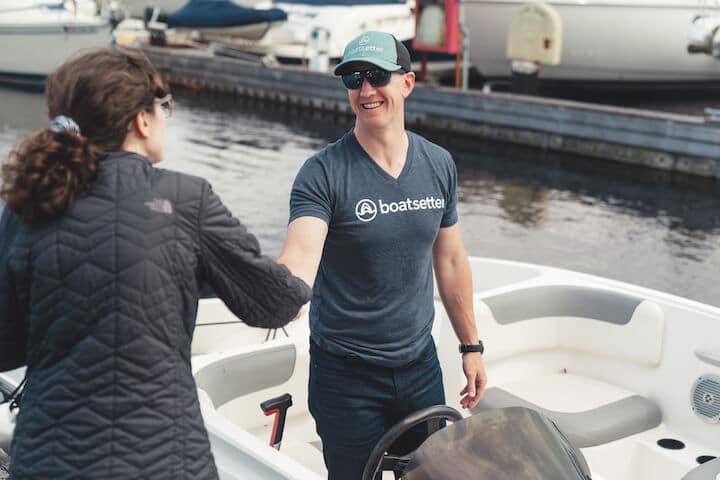
3 Smart Ways to Make Money with Your Boat
Once you list your boat on the Boatsetter marketplace, you’re able to easily connect and communicate with an avid supply of boat renters located all across the country. Then, comes the fun part. Crafting and customizing your boating experiences to attract both local and visiting renters who are looking to book an on-water adventure.
If you’re trying to figure out how to start your own boat business, here’s three creative ideas to get you started.
1. Offer your own watersports adventures
Say you want to target families with kids for a day of wake sports.
- You can outfit your boat with kid-size life jackets, kid-size water skis, kid-size wakeboards and similarly kid-sized tow toys.
- Have kid-friendly (and coral reef-friendly) sunscreen aboard.
- Include a cooler packed with juice boxes and kid-friendly snacks in the boat-rental fee.
This same concept can be applied to offer fishing adventures! Stock your boat full of rods, reels, bait, tackle, live wells, and coolers—transforming it into the ultimate angling machine.
2. Host special events onboard (and actually make it special )
Maybe you want to target people interested in having a special date or a wedding proposal on the water.
- Work out a deal with a local florist to include flowers at a price that you can add into the boat-rental fee.
- Talk to the local liquor store about ordering cases of Champagne at a bulk discount, and provide bottles on board, pre-chilled in a cooler.
- Have good-quality “unbreakable” Champagne glasses on board, along with the option for renters to add a “to-go charcuterie board” that you arrange with your local butcher, or a sampling of chocolates from your local sweets shop.

3. Plan snorkeling tours and scuba diving excursions
What if you want to target families of snorkelers as your rental clientele?
- For starters, you’ll need snorkeling gear in adult and kid sizes.
- Talk to a local scuba shop about a deal on repeat rentals of rash guards or wet suits.
- Invest in a couple of GoPro cameras that guests can use for the day to take underwater photos.
- Have “fish books” on board that will help guests identify everything they saw underwater, once they get back aboard and are drying off.
Ready to Start Your Own Boat Business?
No matter which type of clients you want to target to make money with your boat, you can hire captains who know the best itineraries for fishing, snorkeling and romantic scenery, as well as boat managers who can help to run the day-to-day operations. Local event planners can also be a huge help, and may work for a percentage of the rental fee as a commission.
The big thing to remember is that no matter which kinds of clients you want to target on Boatsetter , the boat is just the beginning. The experience is the thing you want to sell. Accessorize the boat to fit the experience, and then market that experience to the world.
- Still hesitant about listing your boat on Boatsetter? Be sure to read: Is Owning a Boat a Good Investment?
Earn an Average of $20,000 or More by Listing Your Boat for Rent on Boatsetter

Kim Kavin has been on boats in more than 50 countries and islands, including in the Caribbean, Mediterranean, South Pacific, Indian Ocean and Southeast Asia. She grew up learning to steer a ski boat and Hobie Holder at her grandfather’s lake house in New Jersey, and went on to spend time aboard everything from America’s Cup racing sailboats to submarines.
Kim is a PADI-certified scuba diver and animal lover who always enjoys a good, long look around a coral reef. Her award-winning writing and editing regularly appears in national marine magazines and on leading websites. In her early years, she was a Dow Jones editing intern and a graduate of the University of Missouri-Columbia School of Journalism. When she’s not writing, Kim can usually be found hiking northwest New Jersey’s beautiful park trails with her adopted shelter mutt, Ginger.
Browse by experience

Explore articles

First-Time Boat Owner Checklist
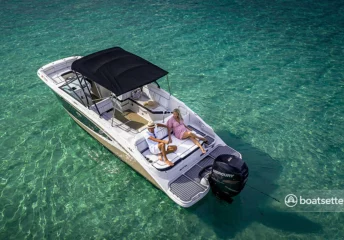
Boat Hosting 101: 3 Best Practices for Boatsetter Owners

Best Siesta Key Beaches to Visit by Boat

The 7 Best Motors for My Motorboat
More From Forbes
How to start a business from scratch (in 5 doable steps).
- Share to Facebook
- Share to Twitter
- Share to Linkedin
Entrepreneurial aspirations? Starting a business from scratch is easier than you might think.
The best way to start a business depends on the type of business you want and your individual situation. Ideal side hustles for college students are different than for stay-at-home parents . If you’re a talented baker, you’ll need a different plan if you want to open your own bakery, versus selling a few of your items at the weekend farmers’ market, versus building a national franchise to rival Mrs. Field’s Cookies or Baked By Melissa. If you have dreamed of owning a pastry-related business, but you don’t bake, then you’ll need a different plan than the talented baker for any of the three options above.
Since aspiring entrepreneurs vary so widely in their interests, ideas and talents, no one post can account for all situations, but here are five foundational steps to start a business from scratch.
1. Decide If You Will Buddy Up Or Go Solo
Going solo means that you have free rein to make all the decisions – but then you have to make all decisions, including who your customer is, what you’ll offer, what price you’ll charge, how you’ll market your business and more. Starting a business with one or more other people divides up the work — but it also divides up the rewards. If you’re not 100% in agreement with your partner(s), you may find that the business does not match your vision or live up to your quality standards.
As you can see, there are pros and cons to starting a business with others versus alone. Do a candid self-assessment about whether you have the risk appetite, stamina and desire to go it alone. One compromise could be to start your business solo, but rent a co-working space so you are surrounded by others. Or, join a mastermind group or entrepreneurs association so you have an ecosystem of colleagues on a similar journey.
2. Look At Your Unique Competitive Advantages For Ideas
Once you have answered the partner versus solo question, you still need a business idea. Your partner might have a strong opinion on this. If not, or if you don’t have a partner, one smart way to tilt the odds of business success in your favor is to pick an area where you have a unique competitive advantage.
Best High-Yield Savings Accounts Of 2024
Best 5% interest savings accounts of 2024.
For example, the talented baker who decides to open a pastry-related business has ability as their unique competitive advantage. Someone who worked for years in the food industry would have an experience advantage. Someone with culinary training has an education advantage. If you have a rabid interest in a subject — e.g., you might be an accountant by day but you frequent pastry shops every chance you get and read all about the industry — your enthusiasm can be your advantage.
3. Marshall Your Resources
In addition to an idea for your business, you’ll need to invest resources into it — not just money, but also your time. The amount of money you need to invest varies widely based on the type of business you’re starting. Product businesses where you need material and/or equipment to create your goods to sell are going to have much higher upfront costs than service businesses where you might be selling your knowledge and therefore have virtually zero upfront financial costs.
Time to get started also varies widely. If you need to build out a physical location (e.g., the bakery with kitchen) or retail store for your products, you will have a longer time investment before you can even make your first sale than the service entrepreneur who can start selling themselves with a relatively inexpensive, fast-build digital presence.
Calculate what money you need to invest to get your business started, as well as how long you’ll need to prepare before you can start selling. Compare this to your personal situation (e.g., do you already have a job, are you part of a dual-career couple or have other family commitments) to gauge how quickly and easily you will be able to get your business started. If you plan to leave your current job to start your business, include in your calculations the notice you’ll give to your current employer, as well as how you plan to meet the expenses that your paycheck used to cover.
4. Check The Legal Requirements Your Business Needs To Meet
A bakery business selling at a farmers’ market faces different food safety requirements than if they open a physical store or operate a mail-order business. If you have workers, there are labor requirements to meet. Even if you are a solo business owner offering services, you might need to have a license or certification for that service. Businesses also need to comply with insurance and tax requirements.
Because requirements vary, not only by business, but also by geography (e.g., bakers at farmers’ markets in Maine vs. Florida). Your local library, community business school or SCORE chapter ( SCORE is a national nonprofit that provides small business mentoring) can help you research the rules that apply to your business. As you’re researching the business you hope to start, your enthusiasm for digging into these details is a good test of how serious you are about your business idea!
5. Make Your First Sale
The best feedback on your business new idea comes from your customer’s wallet. If someone is willing to spend money on something, then you have uncovered a genuine need or desire for whatever you are selling. If you’re selling a service, start offering it as soon as you have bandwidth to deliver it. Making your first sale will prove your concept has a market, and it will also help you gauge firsthand if you like delivering this service. You can also start testing your prices and how to structure your offering.
If you have a more involved business — e.g., the baker planning to open a store — see if you can sell some of your products in advance. For example, you can cater events, and you can see people’s reactions to your creations firsthand. You might even get some testimonials for your ad campaign. Or, you can start by selling via other stores or at farmers’ markets — to gauge reactions, get testimonials, test product variety and test pricing. Focusing on early sales also gives your business some much-needed cash flow upfront.
Start As Cheaply As Possible
Notice that these first steps — focusing on sales, doing research using libraries or free providers like SCORE — are really focused on getting your business up to the first sale as cheaply as possible. It takes time for any new venture to gain traction, so by running a lean business, you give it more time to be successful. Starting a business is not about buying business cards (you can start with word-of-mouth) or building a website (use existing social platforms like Facebook or LinkedIn) or running ads (build a following on social media to build a following on social media). You can start a business without necessarily spending a lot of money.

- Editorial Standards
- Reprints & Permissions

IMAGES
COMMENTS
Use a peer-to-peer boat rental platform to list your boat (s) or fleet. Easy secure peer-to-peer or commercial boat insurance, for peace-of-mind to protect yourself and your boats from potential damages and liability. Create a listing for your boat (s) or charter (s), including price, location, images, description, and other relevant details.
Step 2: Hone Your Idea. Now that you know what's involved in starting a boat rental business, it's a good idea to hone your concept in preparation to enter a competitive market. Market research will give you the upper hand, even if you're already positive that you have a perfect product or service.
Step 2: Mentorship. If you're new to the charter boat business, it's a good idea to set up a mentoring partnership with an established company. With a business mentor by your side, you'll get the valuable assistance and expert instruction you need to take you from a struggling neophyte to a consummate professional.
Steps. 1. Create a business plan that lays out your ultimate goal for your yacht charter business. You then need to determine how you plan on reaching your goal. Your business plan will also answer questions, such as the size of yacht you plan on managing, the destinations you wish to charter and the type and size of clientele groups you want ...
This makes the maritime business highly attractive, and with the right knowledge, concept and boat design, boat rental can be a highly profitable business idea to start. This guide is based on the experiences that the GoBoat® License concept has had from opening and operating in countries like Denmark , Sweden , the United Kingdom , Australia ...
Step 8: Apply for Licenses and Permits. Starting a charter boat business requires obtaining a number of licenses and permits from local, state, and federal governments. The US Coast Guard requires boat owners who run a charter to have a captain's license.
Identifying the purpose and being there. Choosing the right place. Allocate your budget. You need a boat. Understanding the boat rental business. Permit and license. Market your boat rental business! Scale your revenue. Comply with the current trends.
For more information regarding licensing and permits, contact the local government office in the area where the business will be operating. 6. Open a business bank account and secure funding as needed. Starting a boat charter business requires careful financial planning and management.
I'm going to give you some general tips of how to get started with launching a yacht charter business. And then I'll go over potential pitfalls you'll want t...
When starting a boat rental business, it's crucial to prioritize safety for your customers. Implementing safety measures is essential to ensure their well-being. One important step is to have a comprehensive waiver prepared by a qualified lawyer. This legal document will outline the potential risks and responsibilities associated with boat ...
Things to consider before starting a boat rental business. Make a business plan. Come up with the right name for your company. Plan the budget for your business. Research routes and zones. Get all the necessary permits and certifications. Obtain the right equipment.
8. Acquire boat equipment and supplies. Starting a boat business requires careful selection of equipment and supplies to ensure not only the functionality and safety of your vessels but also the satisfaction of your customers. The right gear will help you operate efficiently and can set you apart from the competition.
Bottom line: Make sure that your area stands a reasonable chance of getting customers that are interested in boat travel for the majority of the year before proceeding. 2. Write a Business Plan. Suspecting that you can run a successful charter boat business isn't the same as actually running one successfully.
Starting a yacht charter business sounds appealing - spending your days on a luxury yacht, cruising to exotic locales, and hanging out with "the rich and famous". While there are many benefits to running your own business, especially when it coincides with your boating passion, in the end, it's still a job - and requires a lot of work. A.
12. Buy or Lease the Right Charter Boat Business Equipment. When starting a charter boat business, you will need to purchase or lease certain types of equipment. This equipment includes: 1. A Boat. Obviously, your charter boat business will need a boat! You can either purchase or lease a boat, depending on your budget and needs. 2. Fishing Gear
With a healthy compound annual growth rate (CAGR) of over 5%, the sector will be worth around $25 bn by 2027. With the right location, detailed business plan, and laser-sharp execution, a boat rental business could translate into a tidy profit. Figuring out how to start a boat rental business can give you access to a steady and enjoyable income.
Yes, owning a yacht for charter can be profitable but owning a yacht will rarely "pay for itself.". Chartering your yacht presents some unique benefits that can lead to opportunities to make a profit off of your investment in a myriad of ways, including offsetting the cost of owning a yacht, selling your yacht for a profit, and even making ...
A boat charter business offers boats and yachts for rent. Unlike traditional boat rental services, boat charters provide a wider diversity of options. From bareboat charters to crewed ones, this type of business delivers great options for spending your time on yachts, with or without a professional crew.
Catamaran Business Ownership. Whatever your reason, Catamaran Guru's team of experts can set up your yacht charter business in compliance with tax authorities to suit your individual financial and personal goals. Watch our in-depth interview with one of our yacht-as-a-business boat owners. He shares details and his experience about owning a charter yacht and working with Catamaran Guru.
Traditionally, a marketing plan includes the four P's: Product, Price, Place, and Promotion. For a charter boat business plan, your marketing strategy should include the following: Product: In the product section, you should reiterate the type of charter boat company that you documented in your company overview.
Buy more boats, hire staff and expand! With this great start, you will be able to get your business up and running in no time. Your bookings will be overflowing, and you will be looking to expand. To properly manage your sales you'll need to further automate your booking process, communication flow and marketing.
Mylène Garot loved being on the water and wanted to start a boat-rental business in Miami. Garot used her savings to purchase a boat and started renting it on Boatsetter, an Airbnb for boats.
This article looks at the economics of yacht chartering. It suggests that booking 18-20 charters a year on an averaged sized sailing yacht might gross $200,000 to $224,000 per year. If you have a catamaran, you might do better and gross $320,000 or more a season. Whether you make money and can pay for your yacht's costs will depend on your ...
Owning a yacht for a rental can be a profitable business venture. Chartering yachts presents a unique opportunity that can lead to profitable opportunities. To start a yacht charter business, find the right market. Consider markets where the weather is good for water activities and a region frequented by tourists.
Starting a boat charter business. While starting a business brings challenges, satisfying customers and their aquatic cravings is worth the hassle. These five steps are what you should expect in starting a boat chartering business. Additionally, you'll need to develop a creative name and secure funding from investors.
If you're trying to figure out how to start your own boat business, here's three creative ideas to get you started. 1. Offer your own watersports adventures. Say you want to target families with kids for a day of wake sports. You can outfit your boat with kid-size life jackets, kid-size water skis, kid-size wakeboards and similarly kid ...
1. Decide If You Will Buddy Up Or Go Solo. Going solo means that you have free rein to make all the decisions - but then you have to make all decisions, including who your customer is, what you ...
Now starts the fun part. The first step in starting your boat rental business is to think about what kind of boat rental business you want. Your boat rental company will have a certain purpose, and with that certain purpose, specific types of boats to suit the business idea. You will likely want one unifying idea for your boat business so you ...
GetMyBoat charges a service fee to boat owners (8.5% for U.S. transactions, as of March 4, 2024), so be sure to price your boat's hourly rental price at a level where you can comfortably cover ...
The Moscow International Business Center (MIBC), also known as Moscow-City, is a commercial development in Moscow, the capital of Russia.The project occupies an area of 60 hectares, and is located just east of the Third Ring Road at the western edge of the Presnensky District in the Central Administrative Okrug.Construction of the MIBC takes place on the Presnenskaya Embankment of the Moskva ...